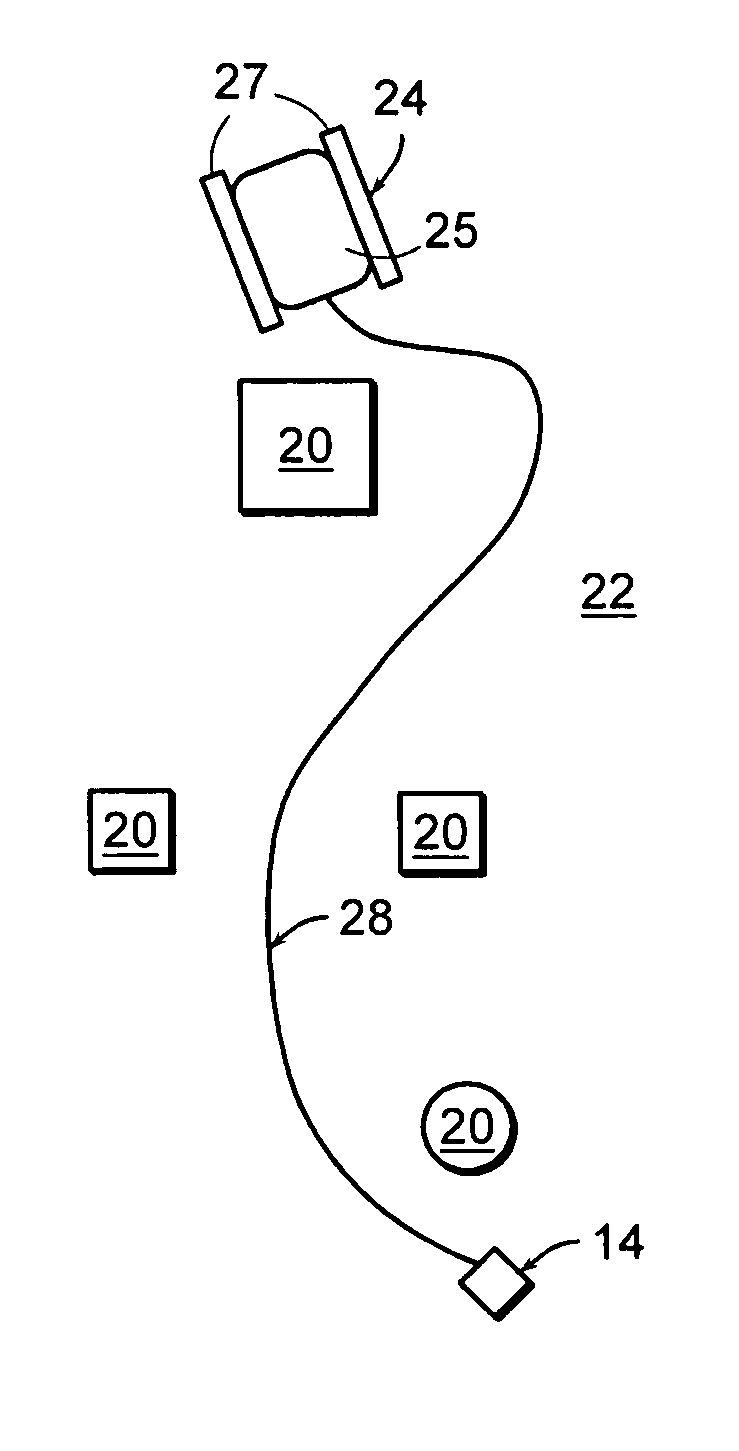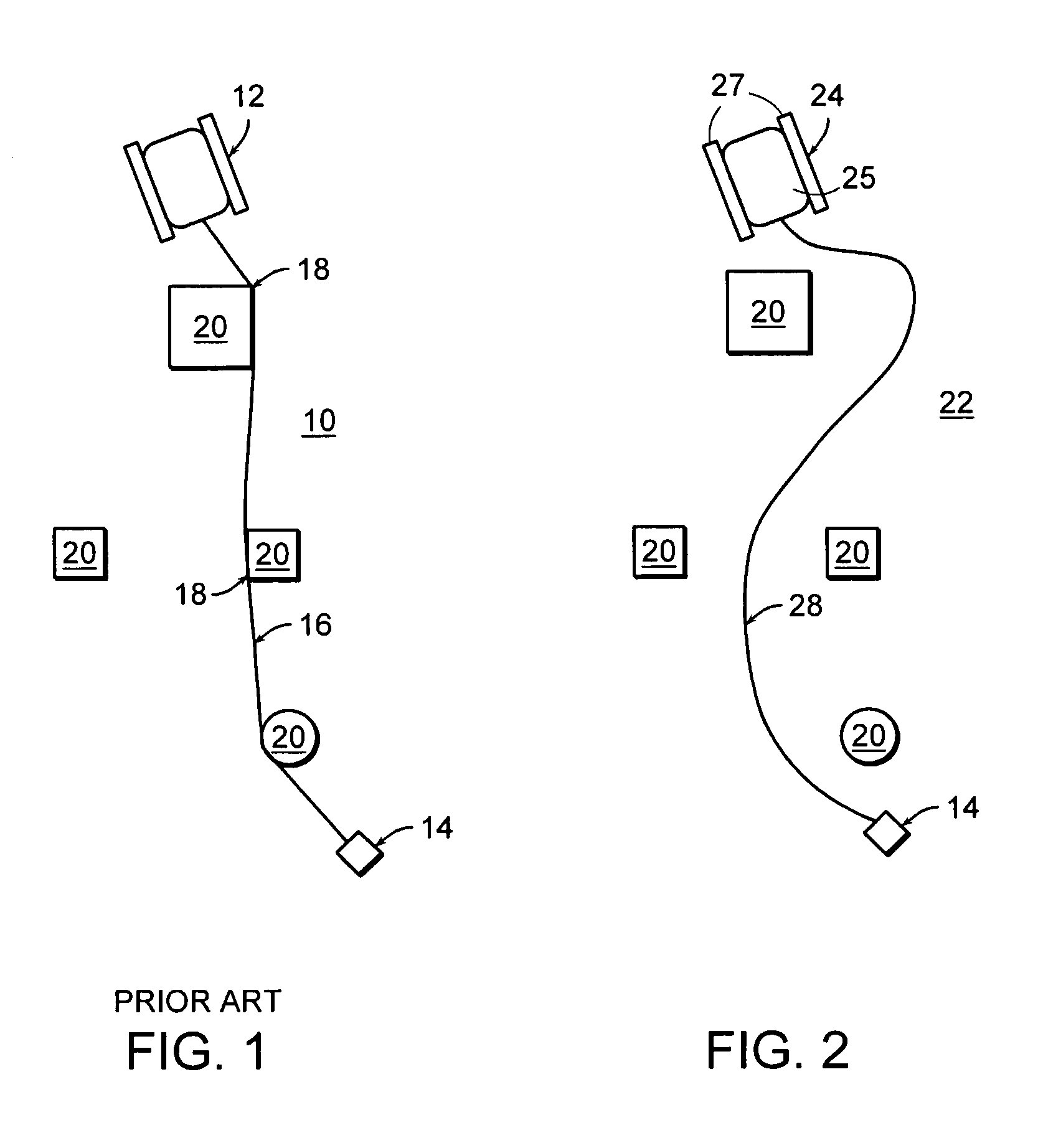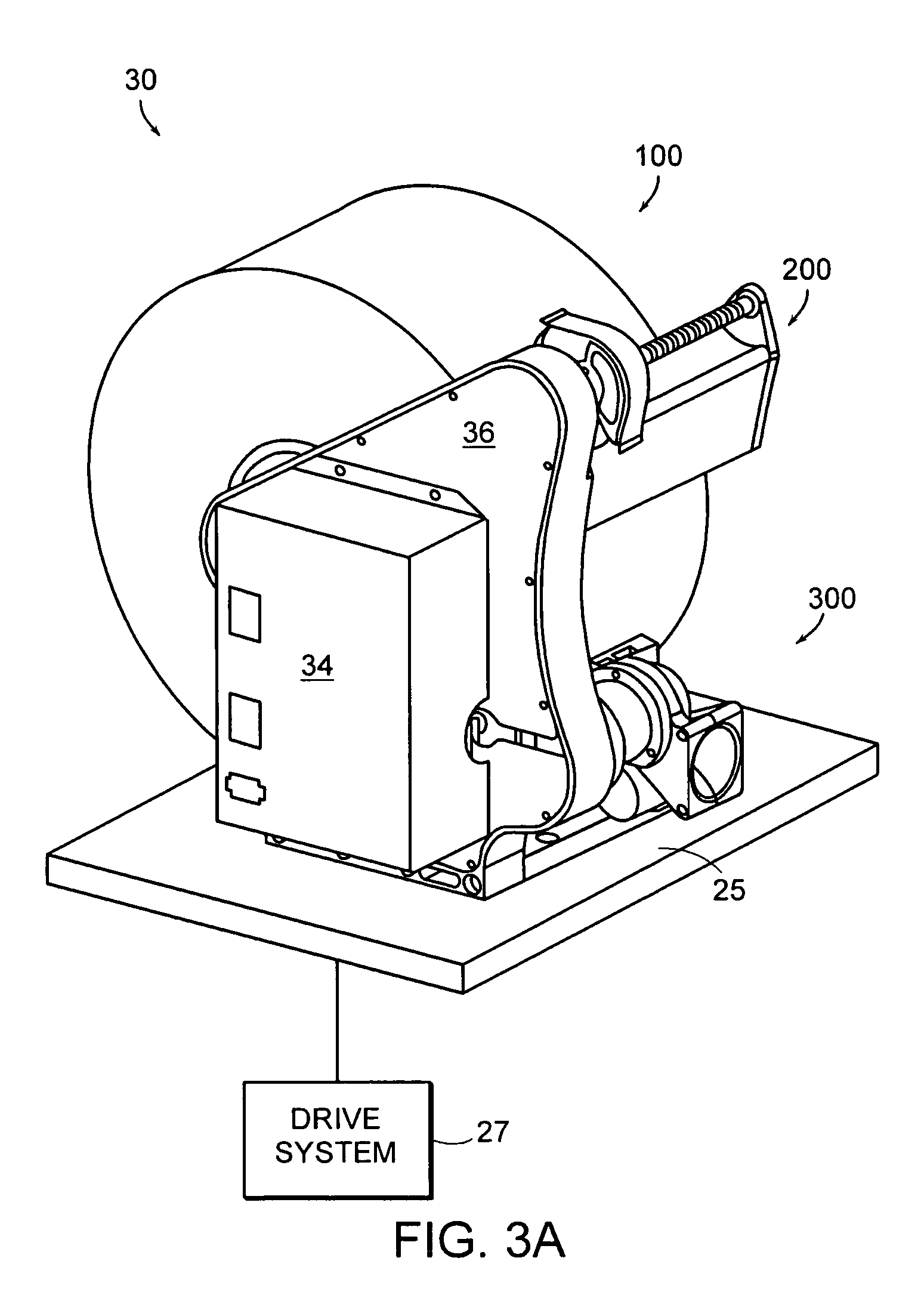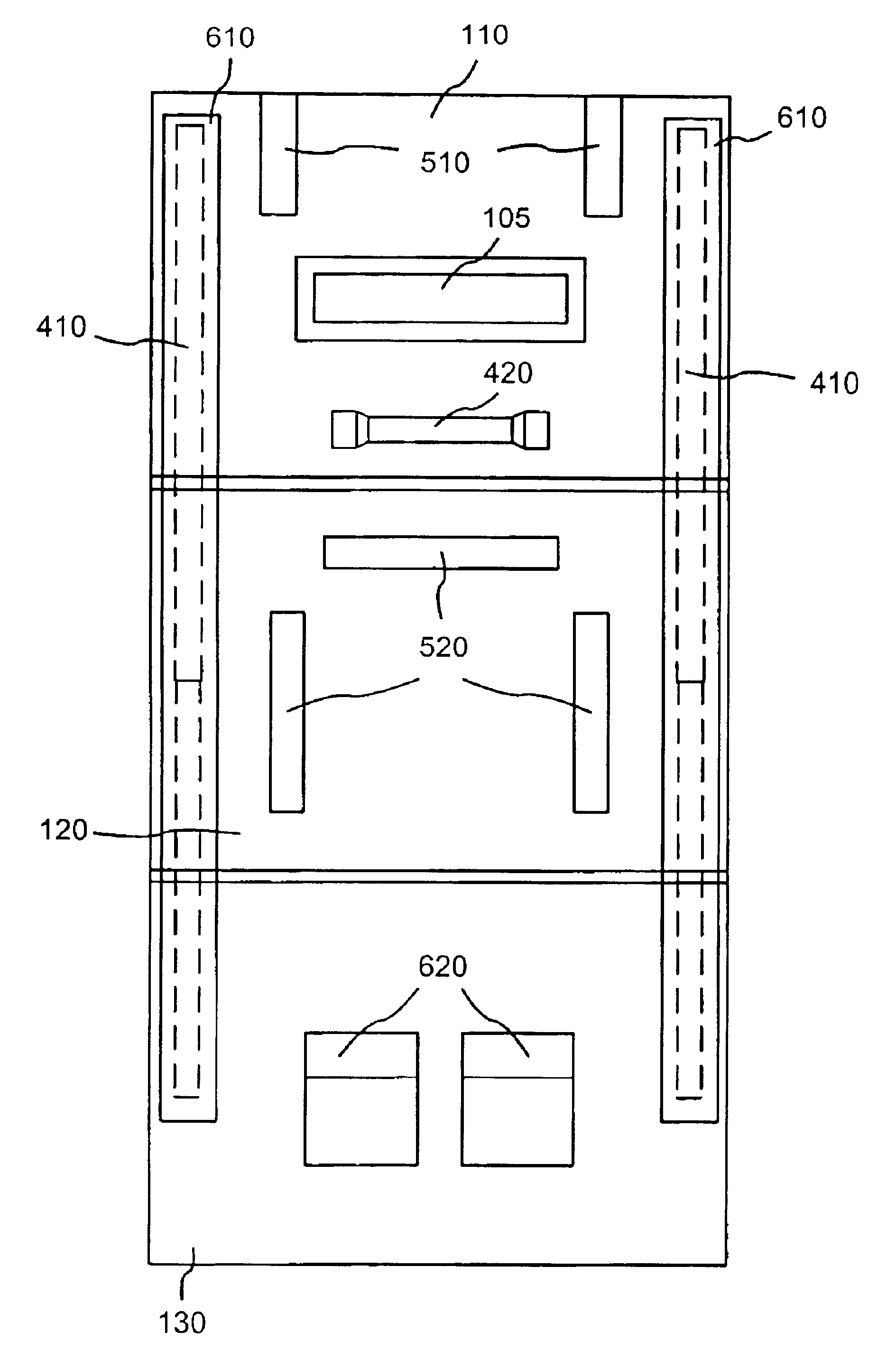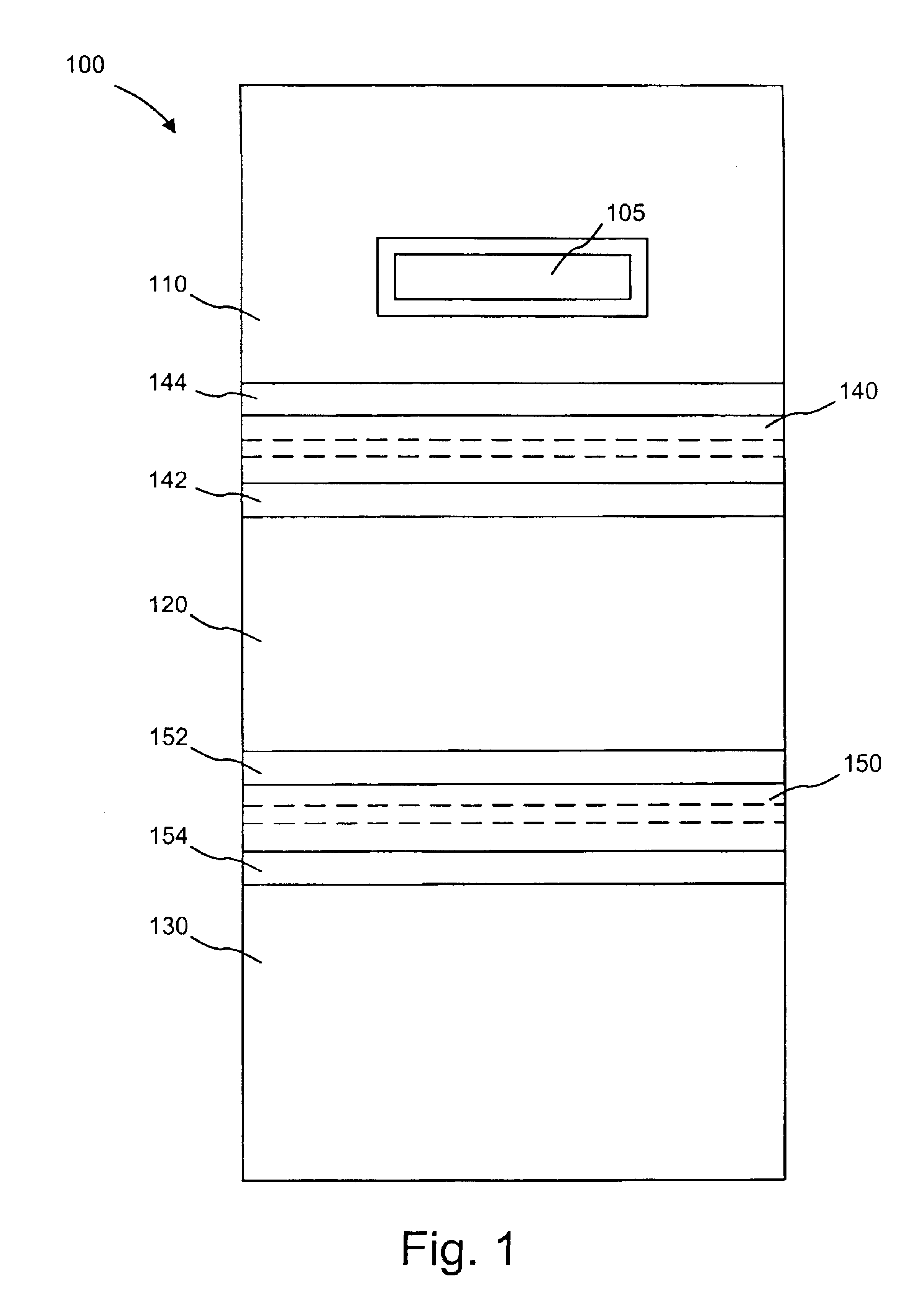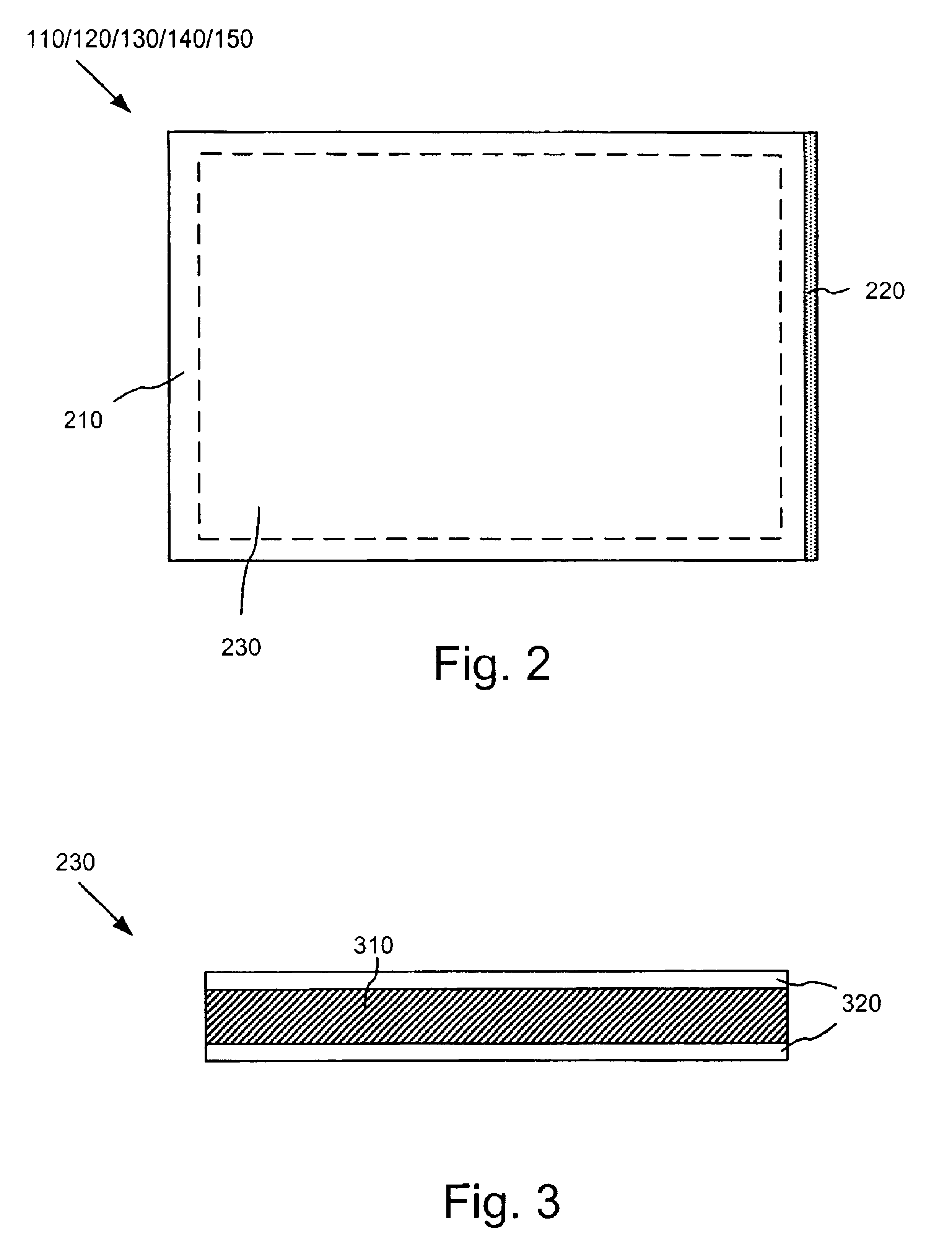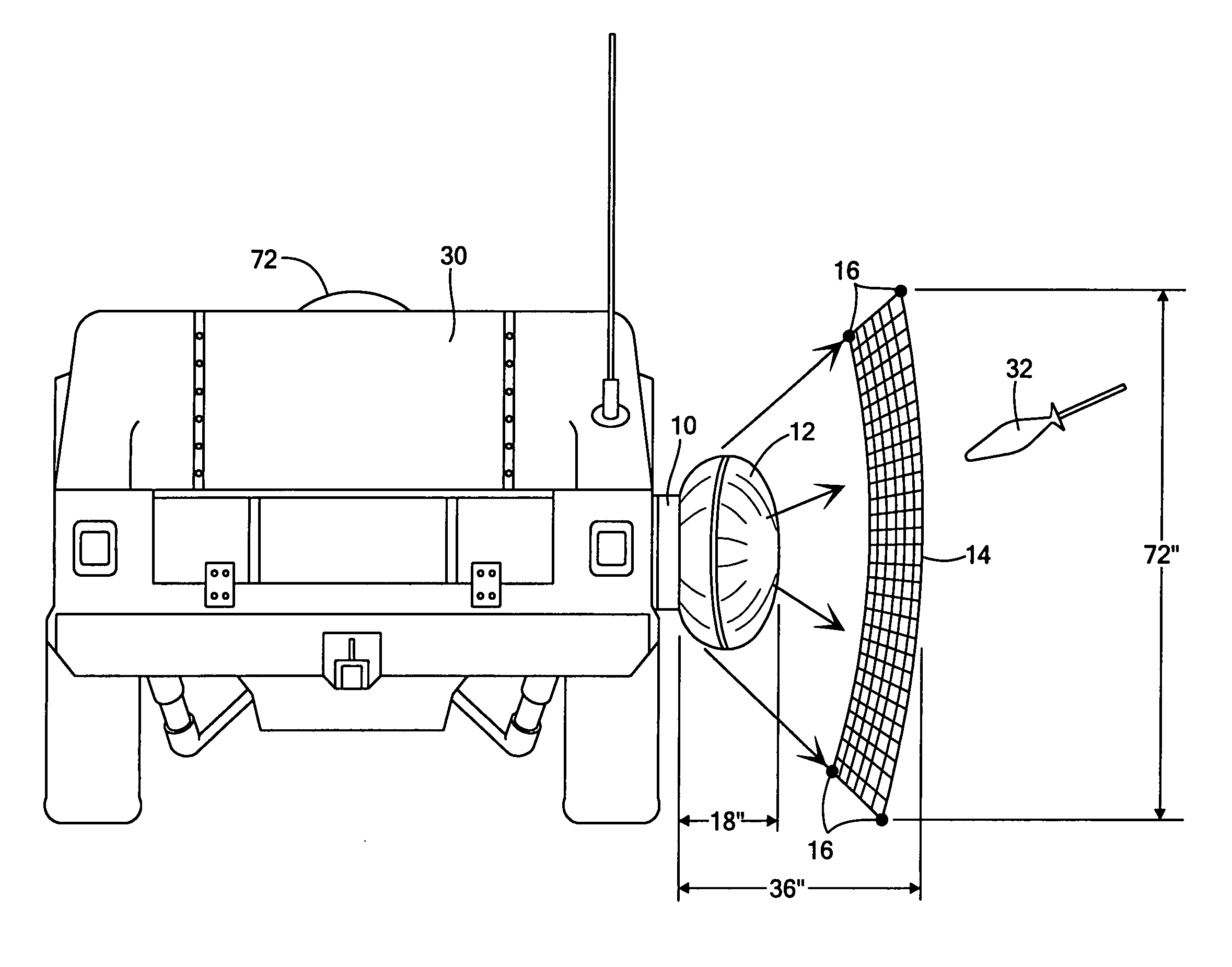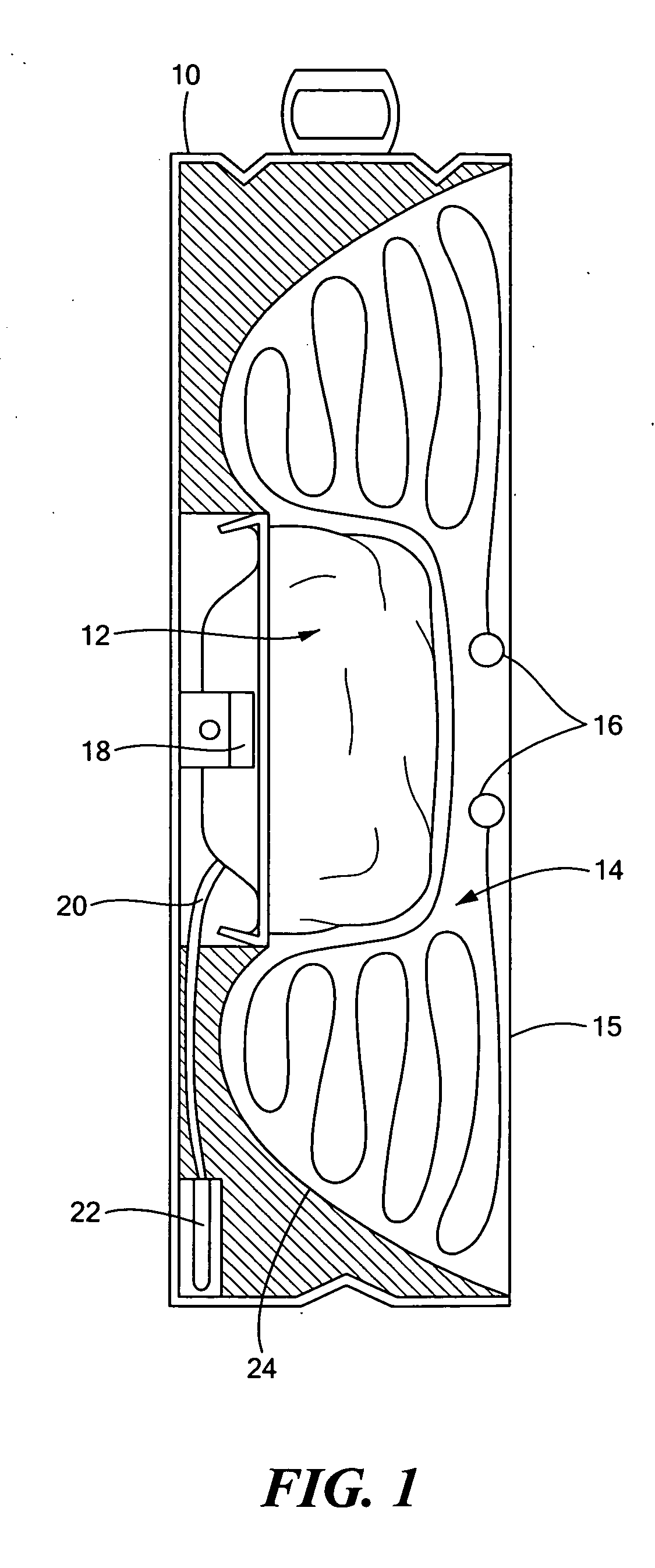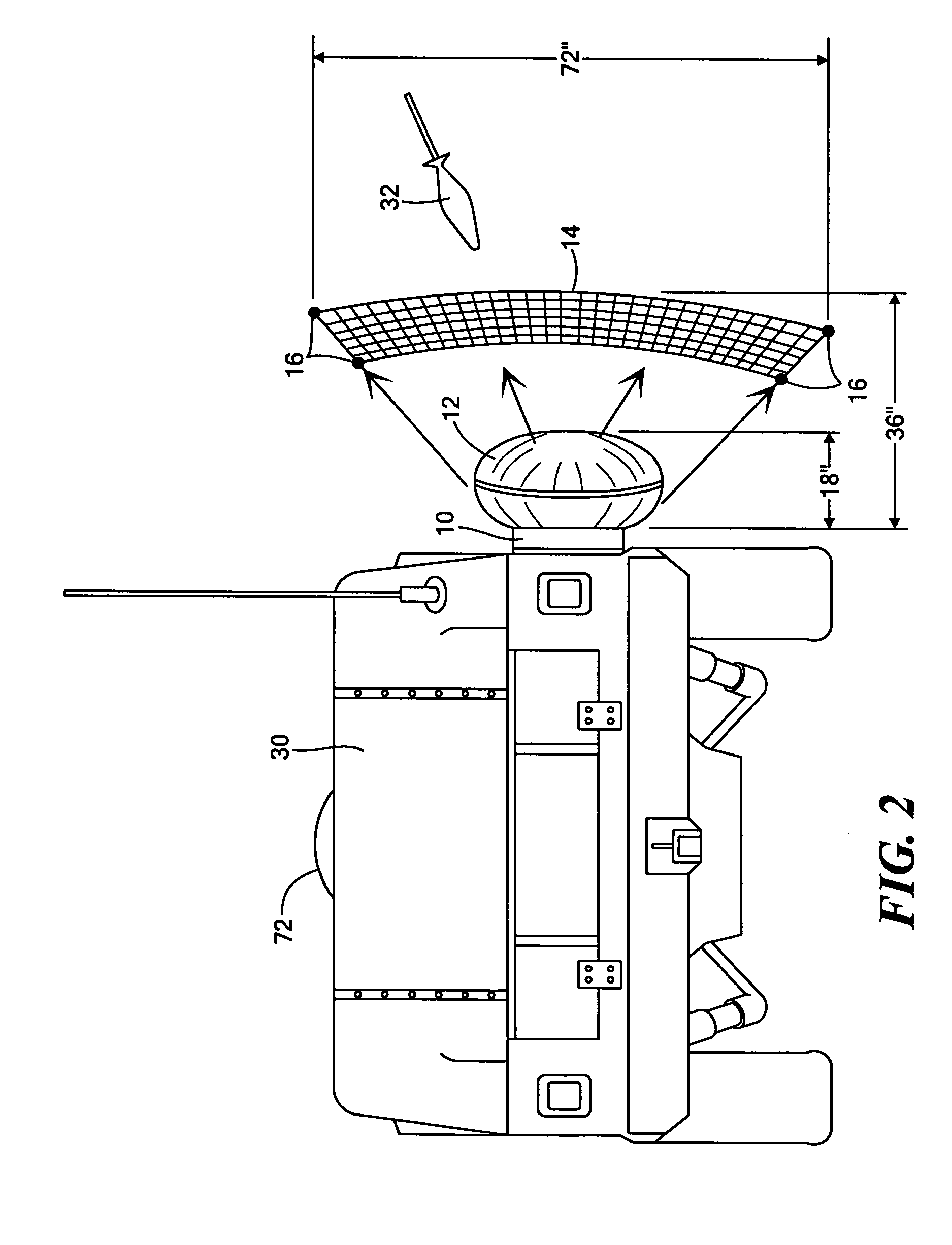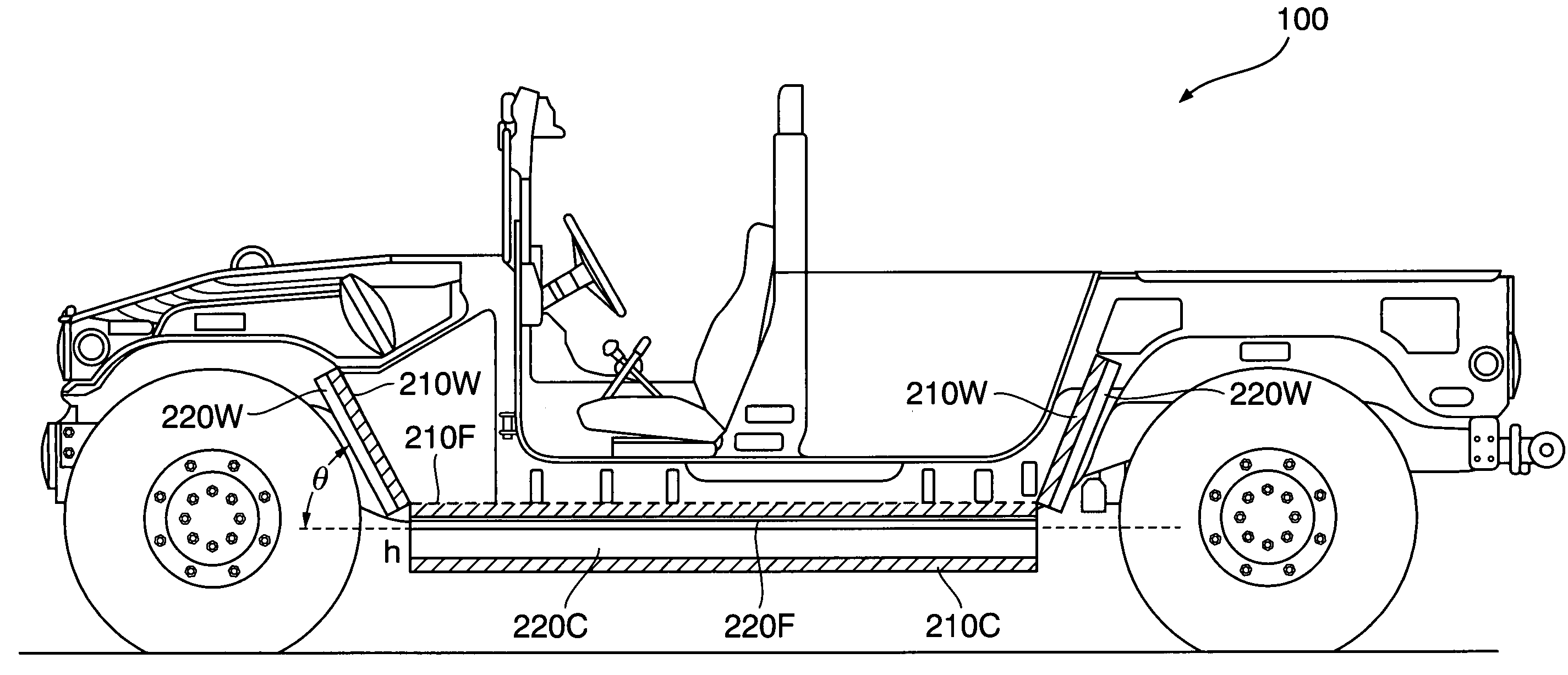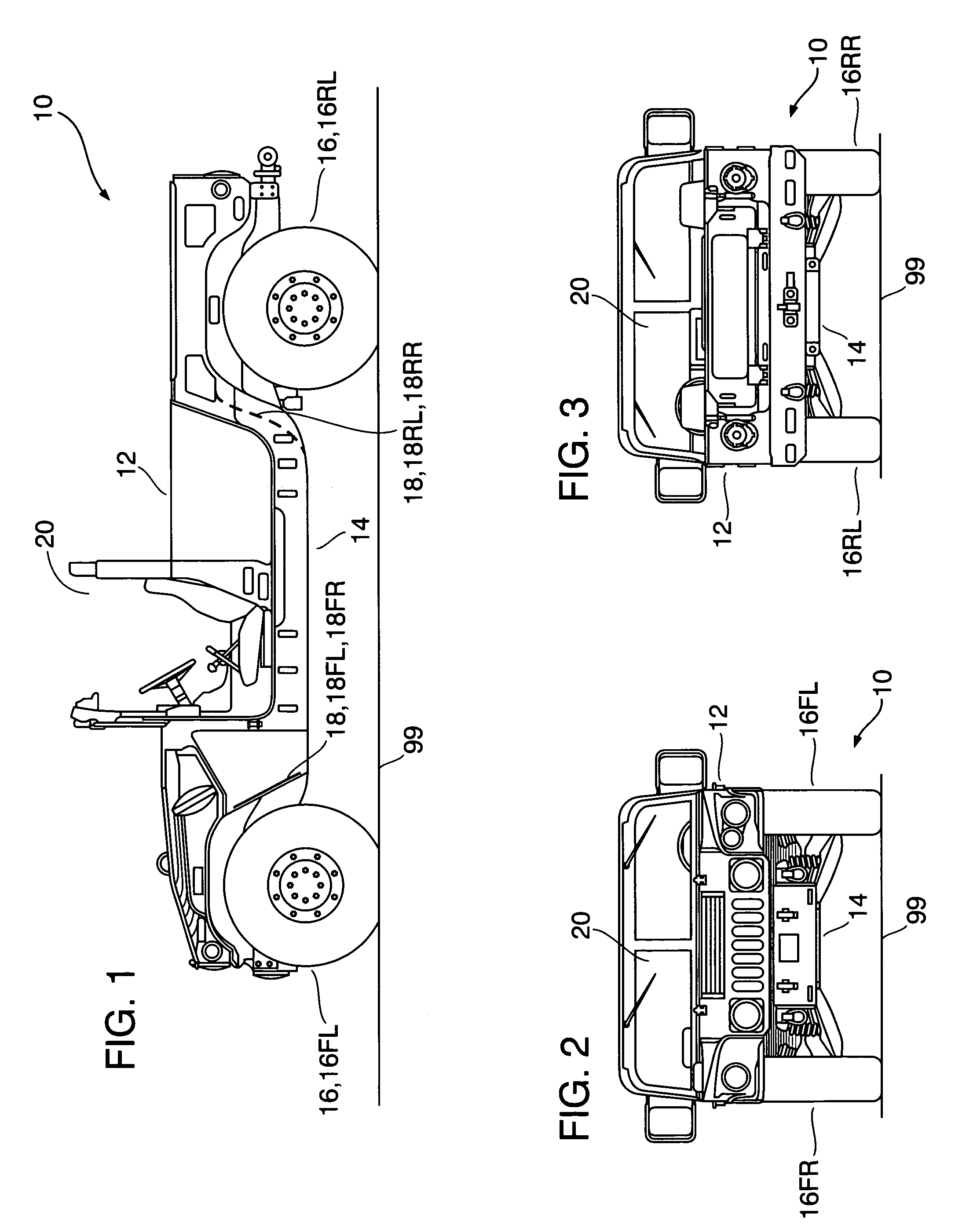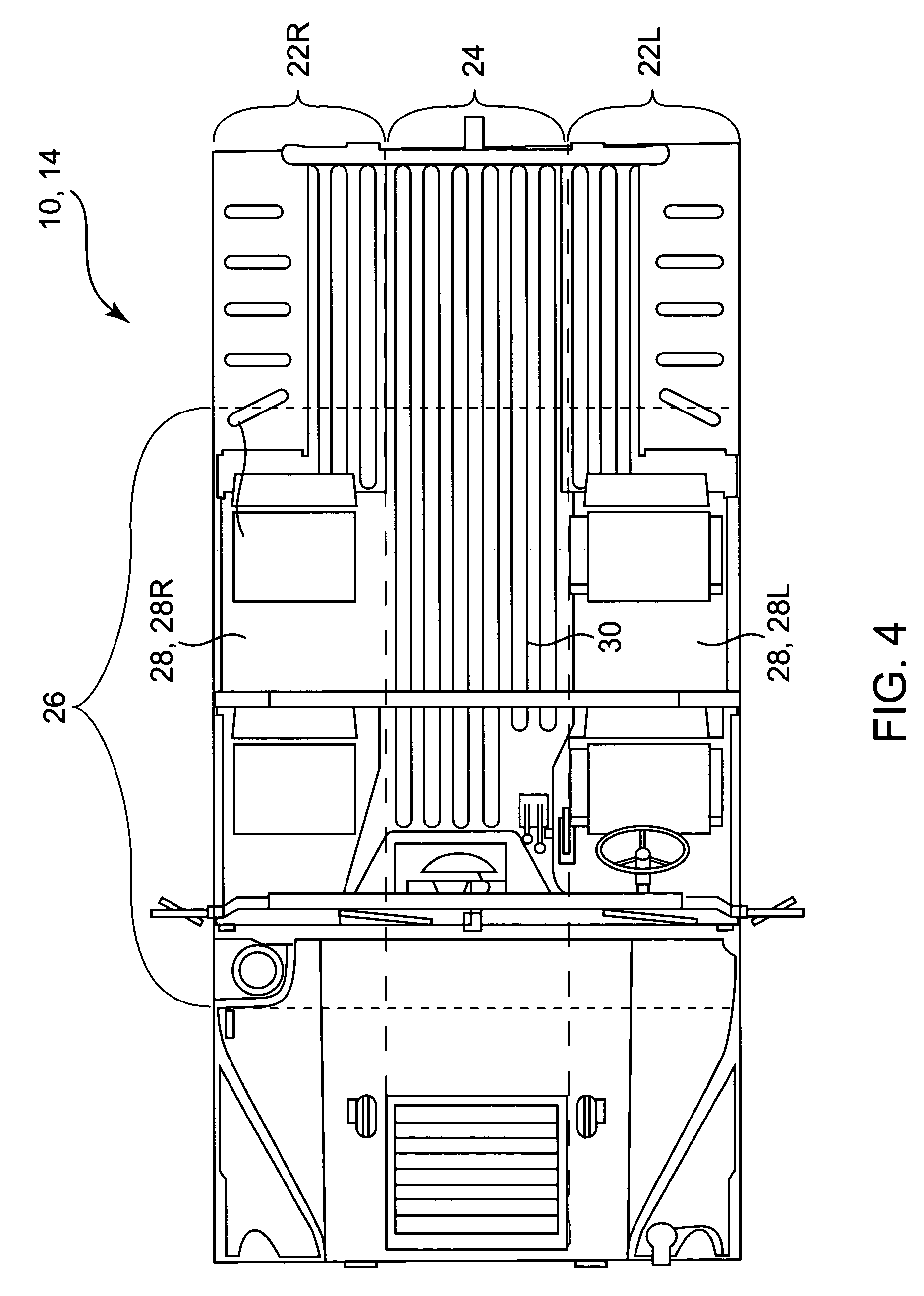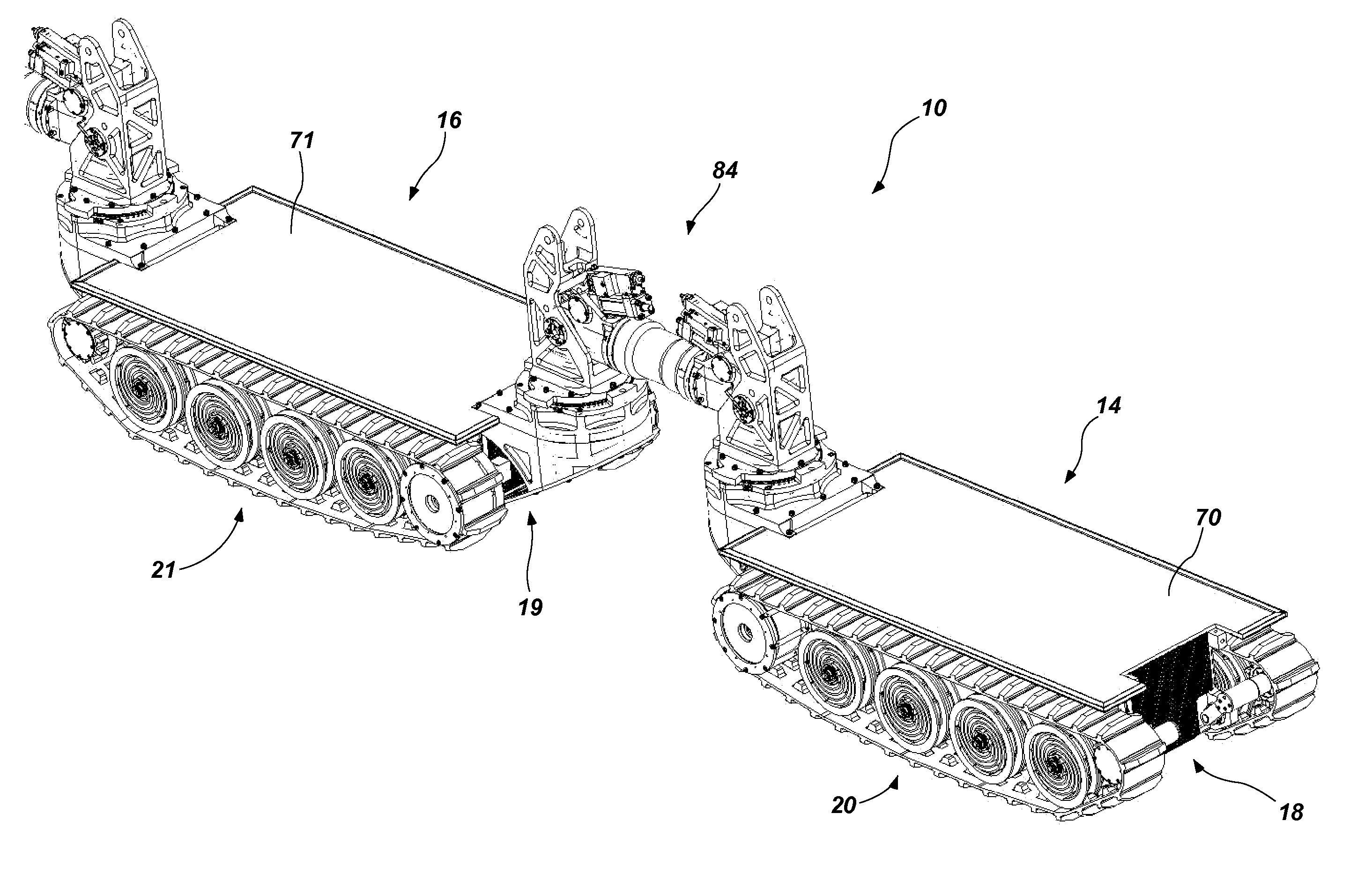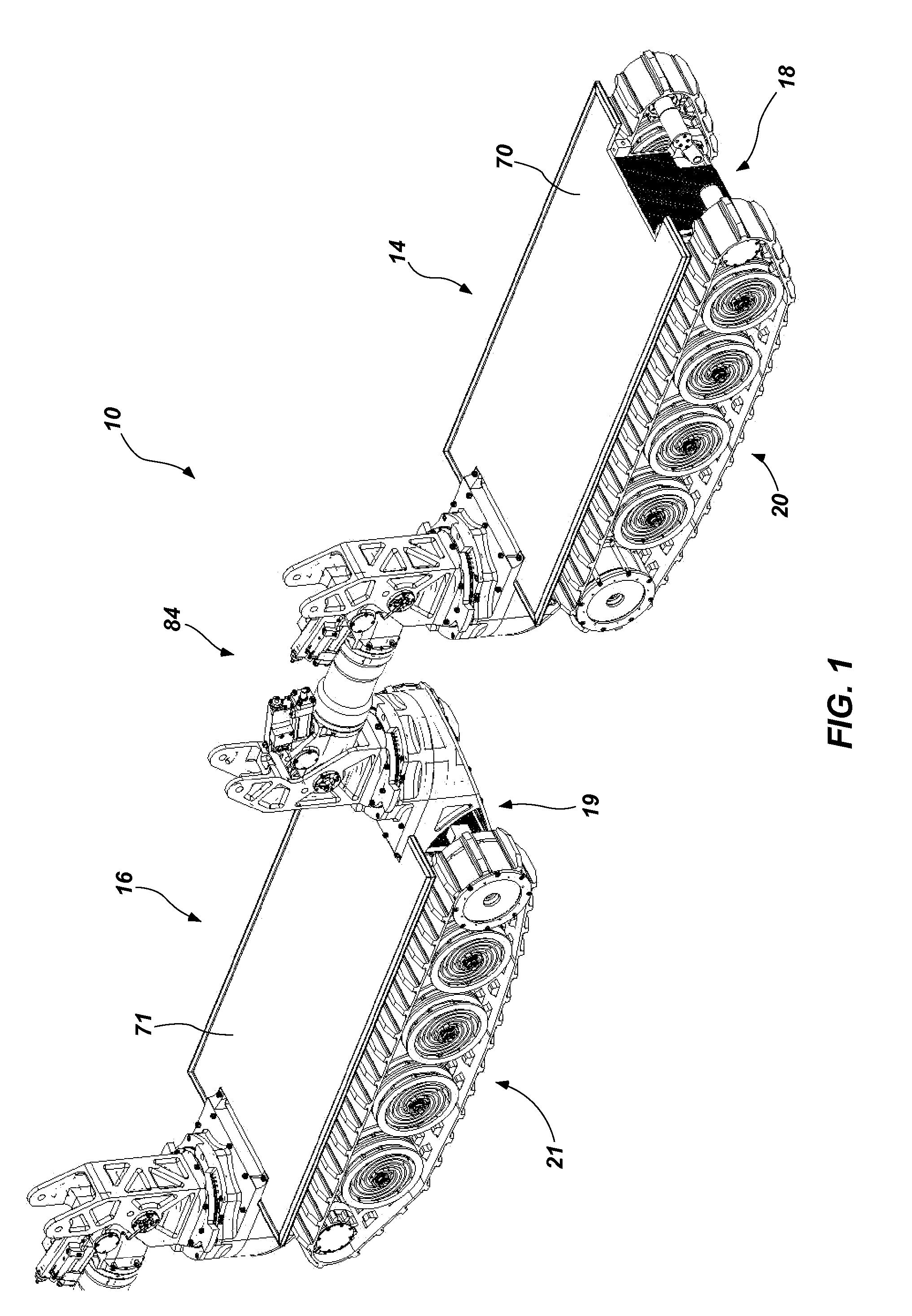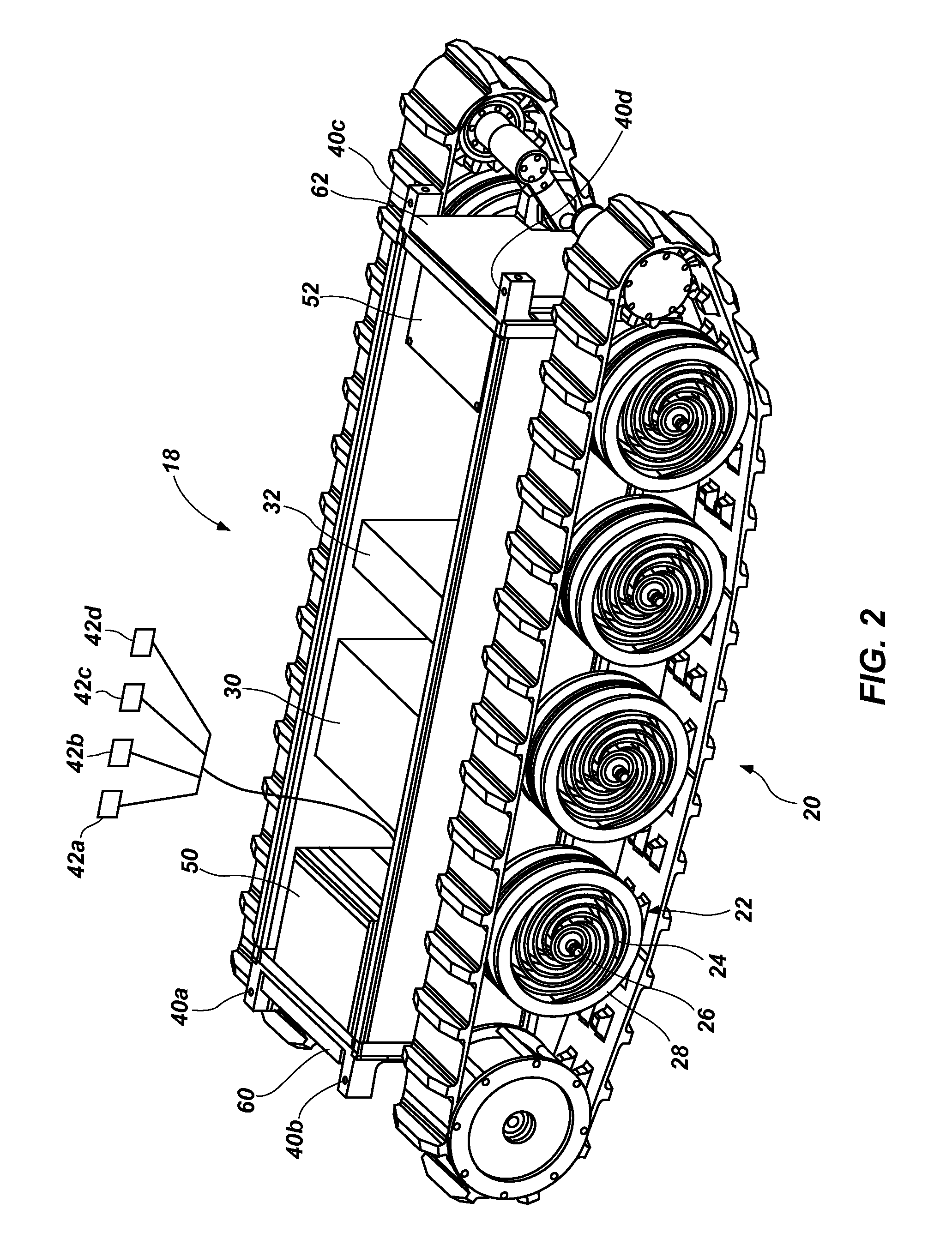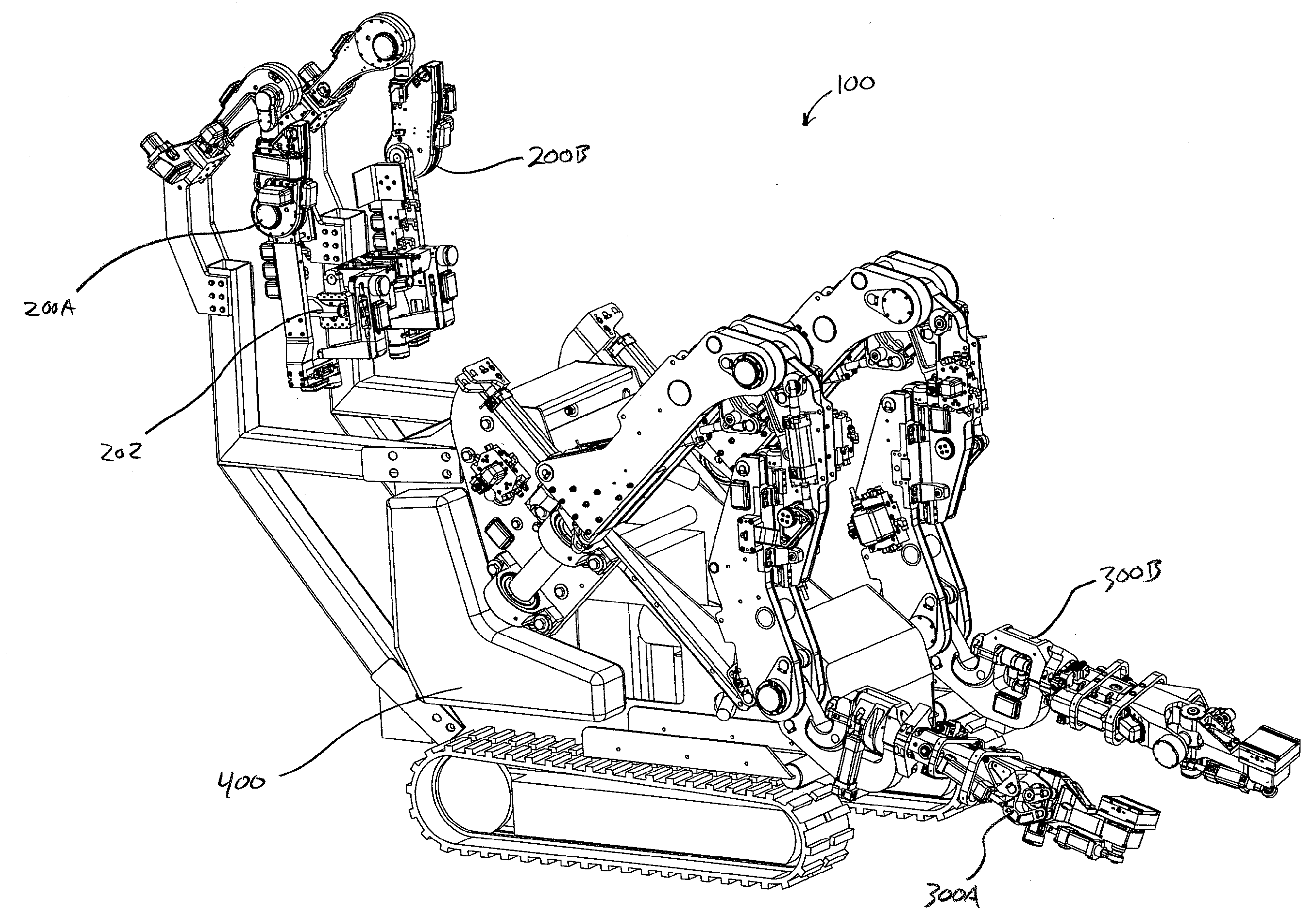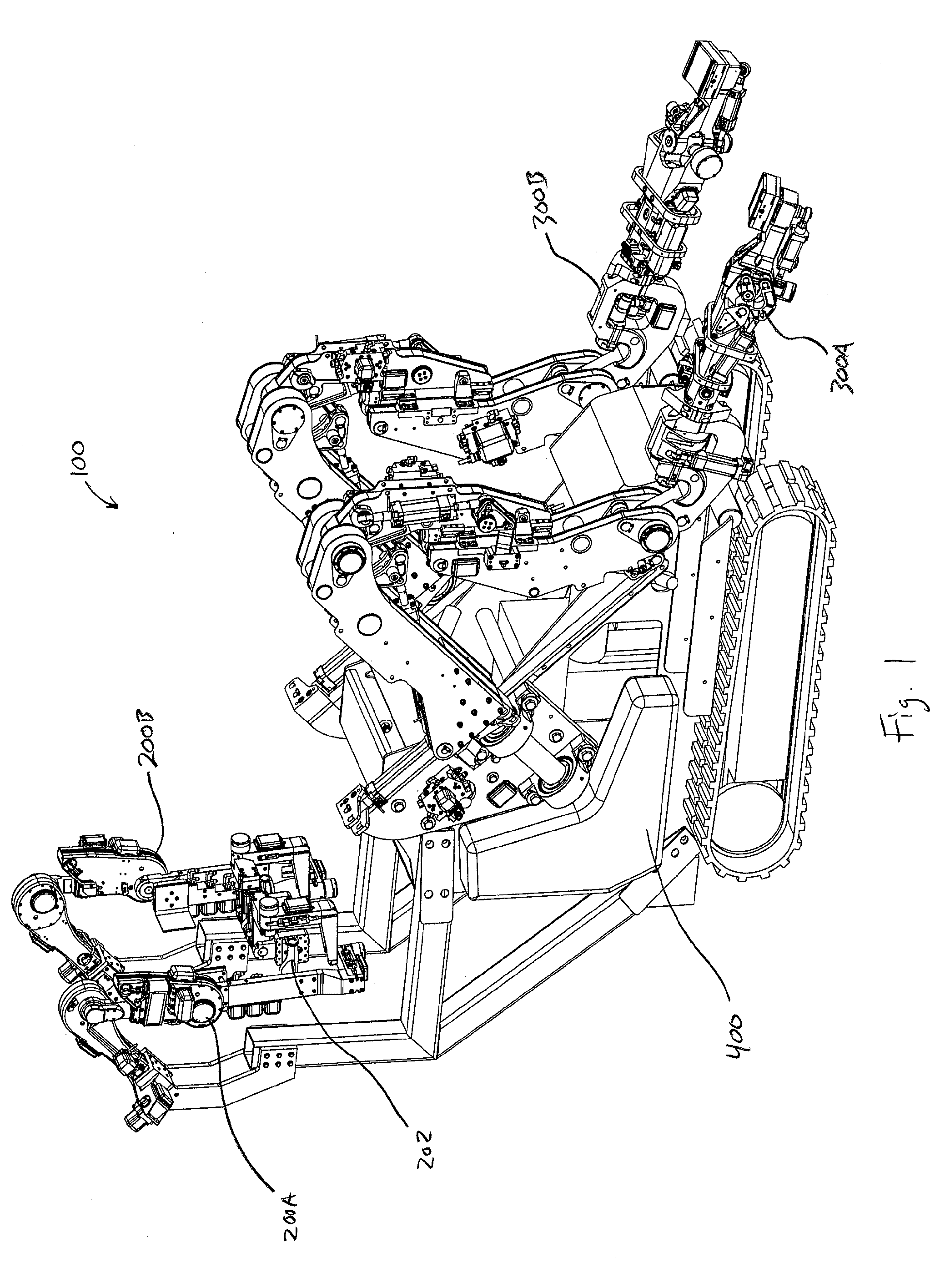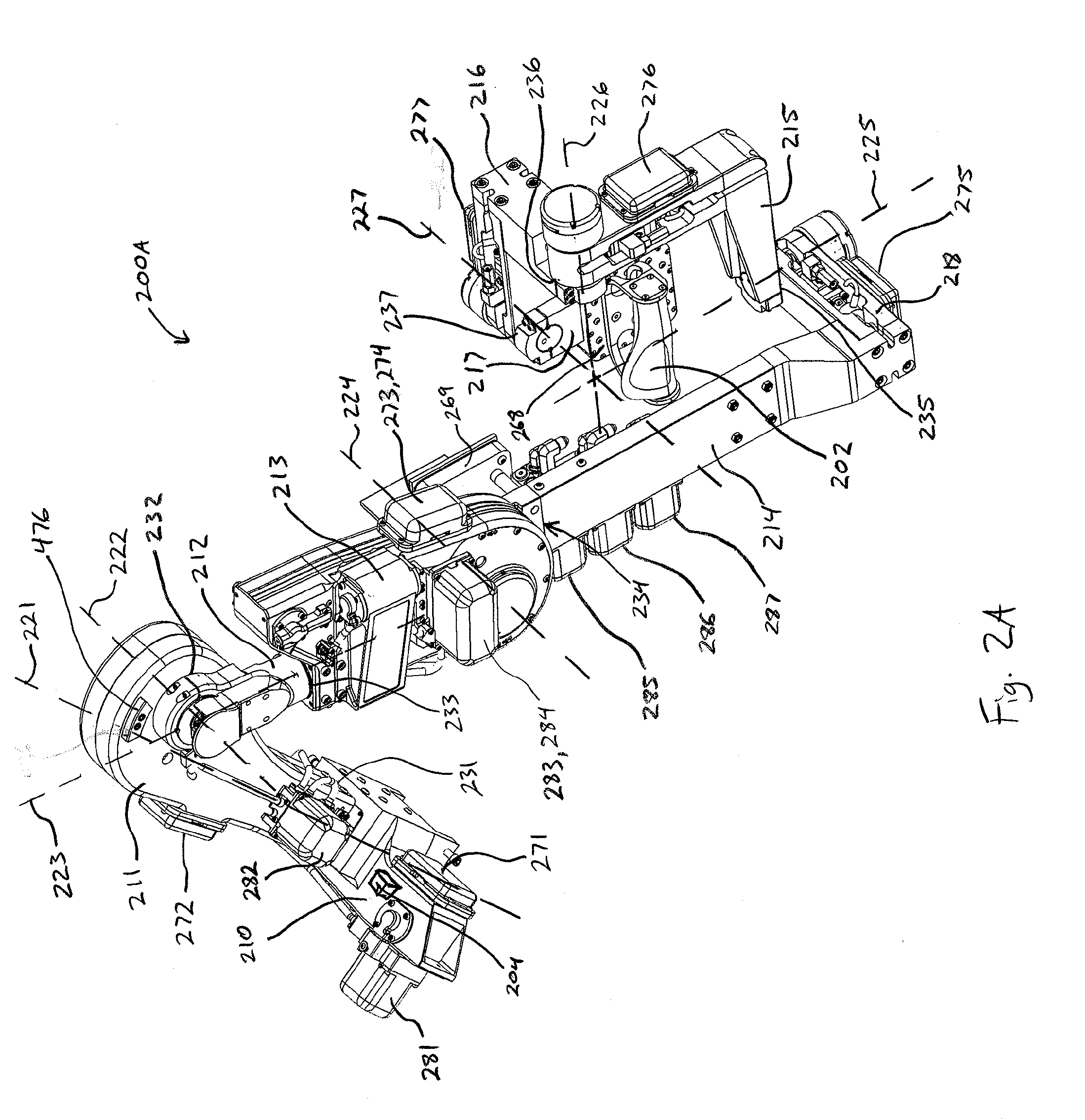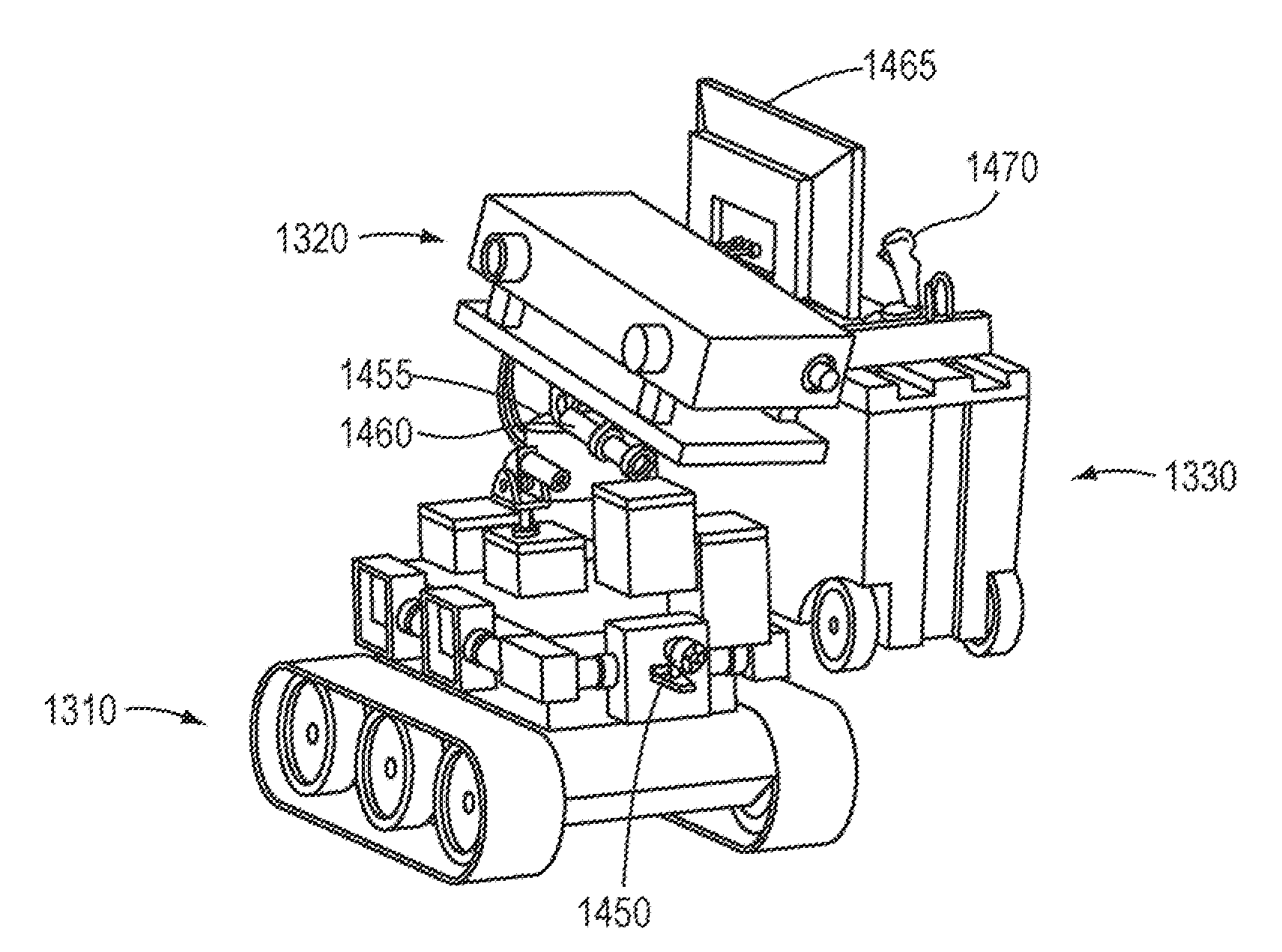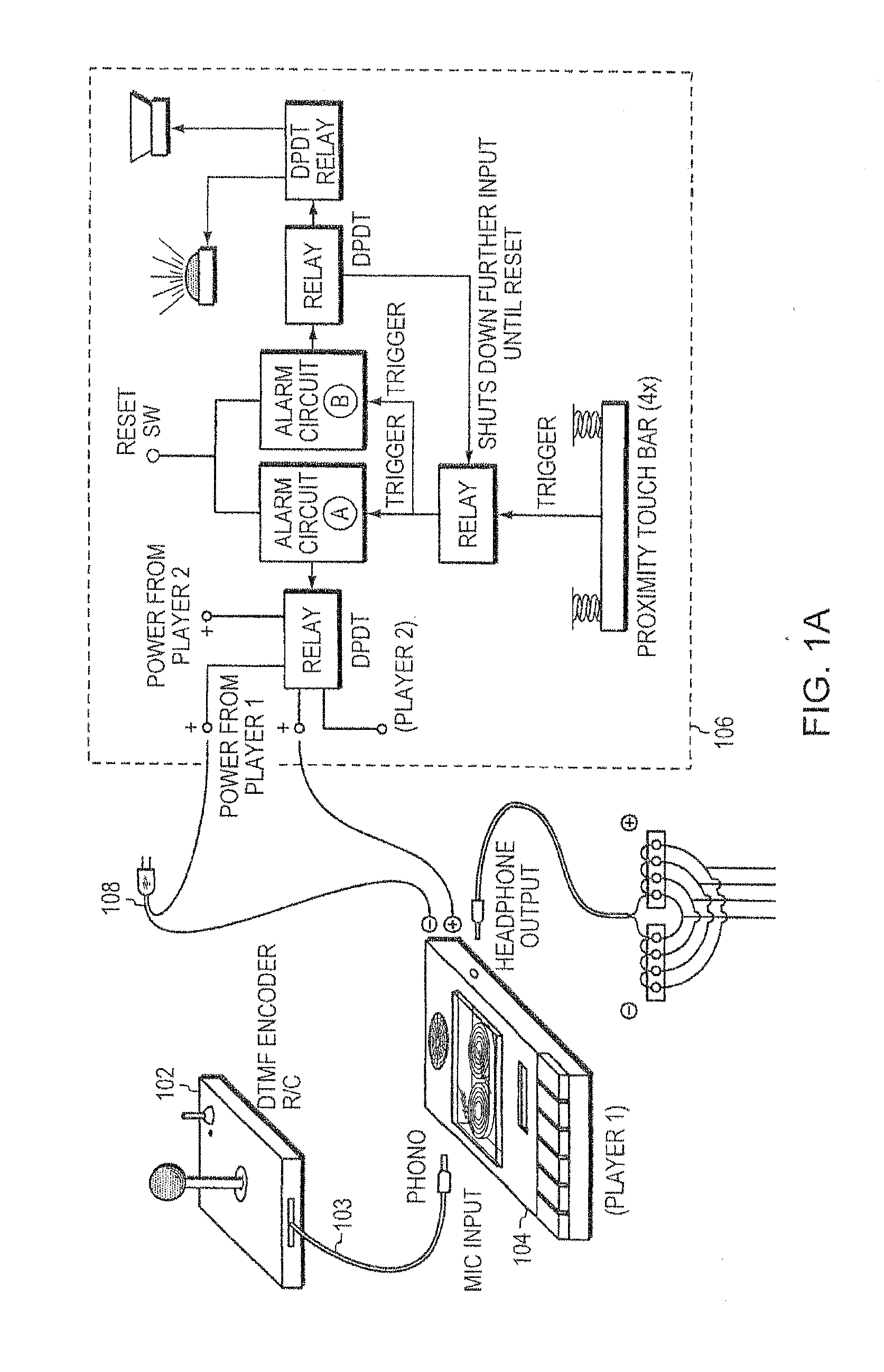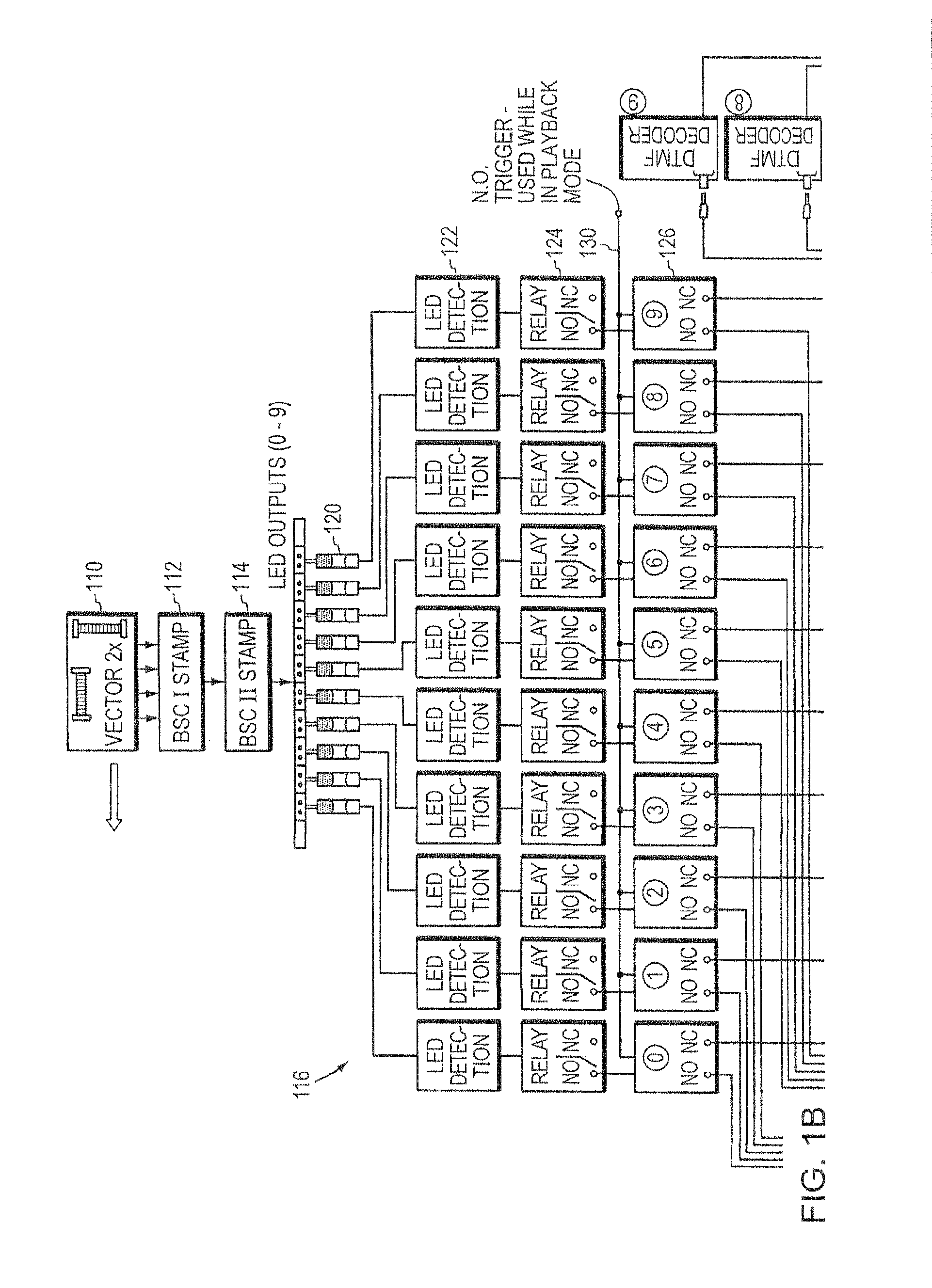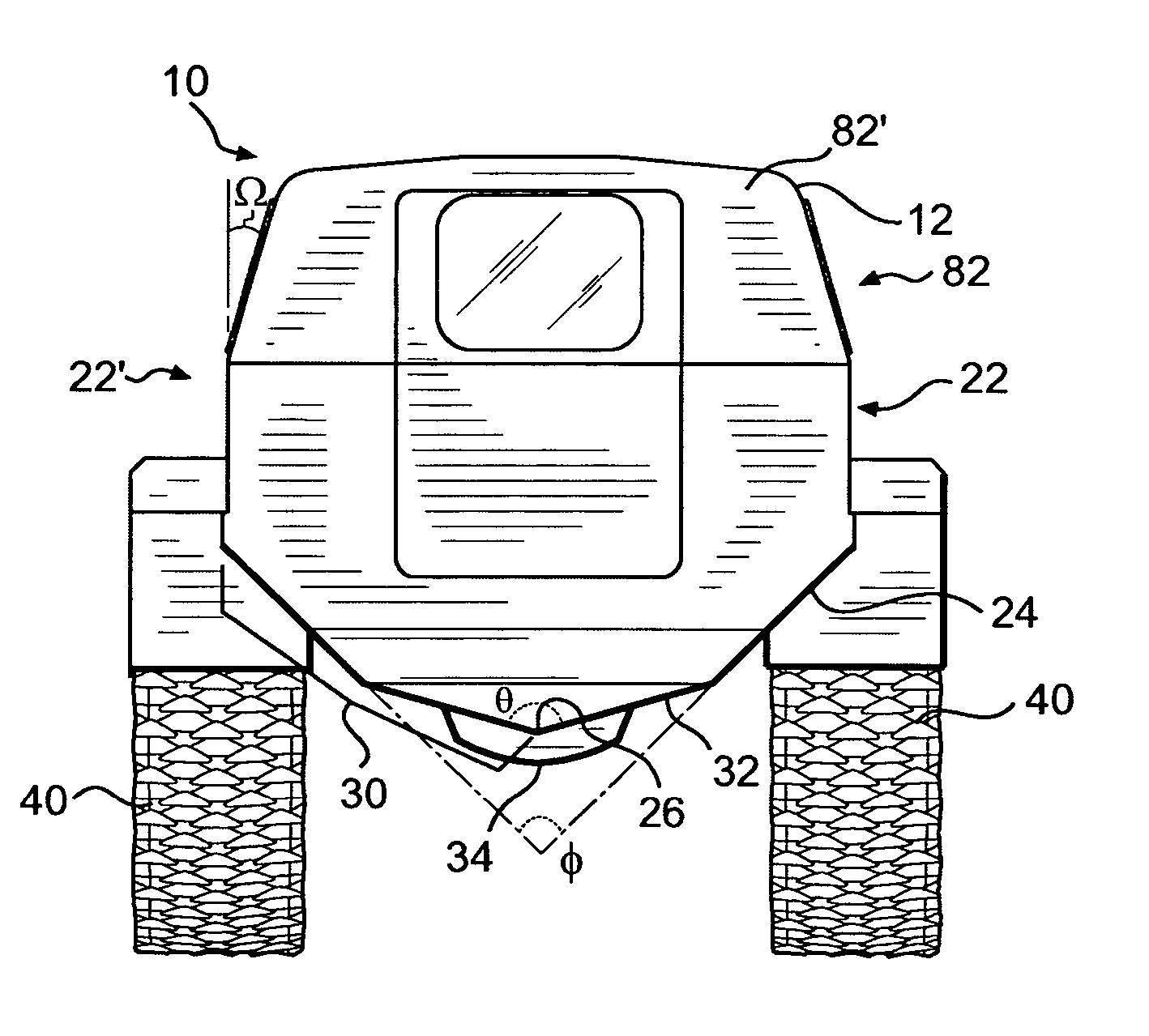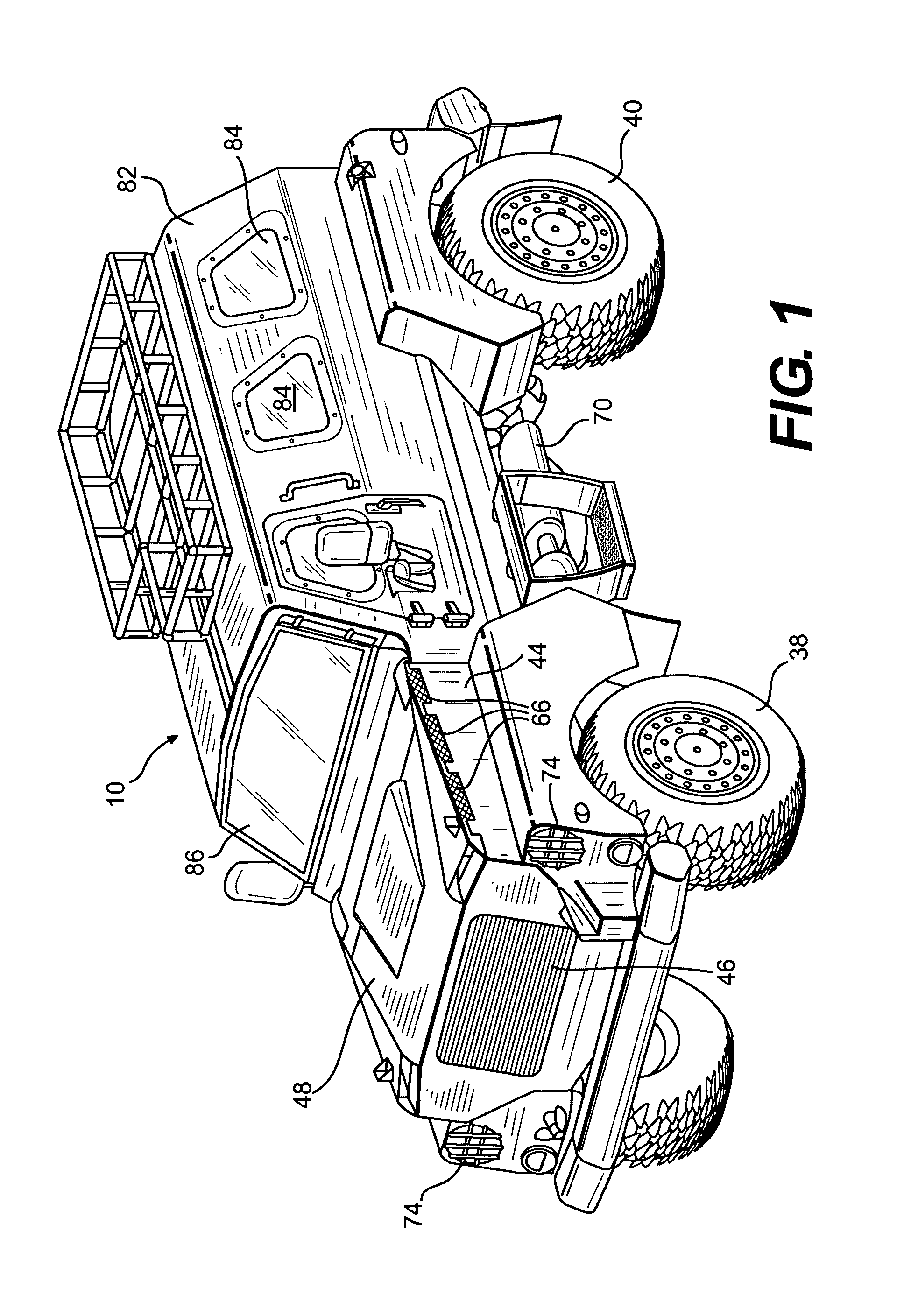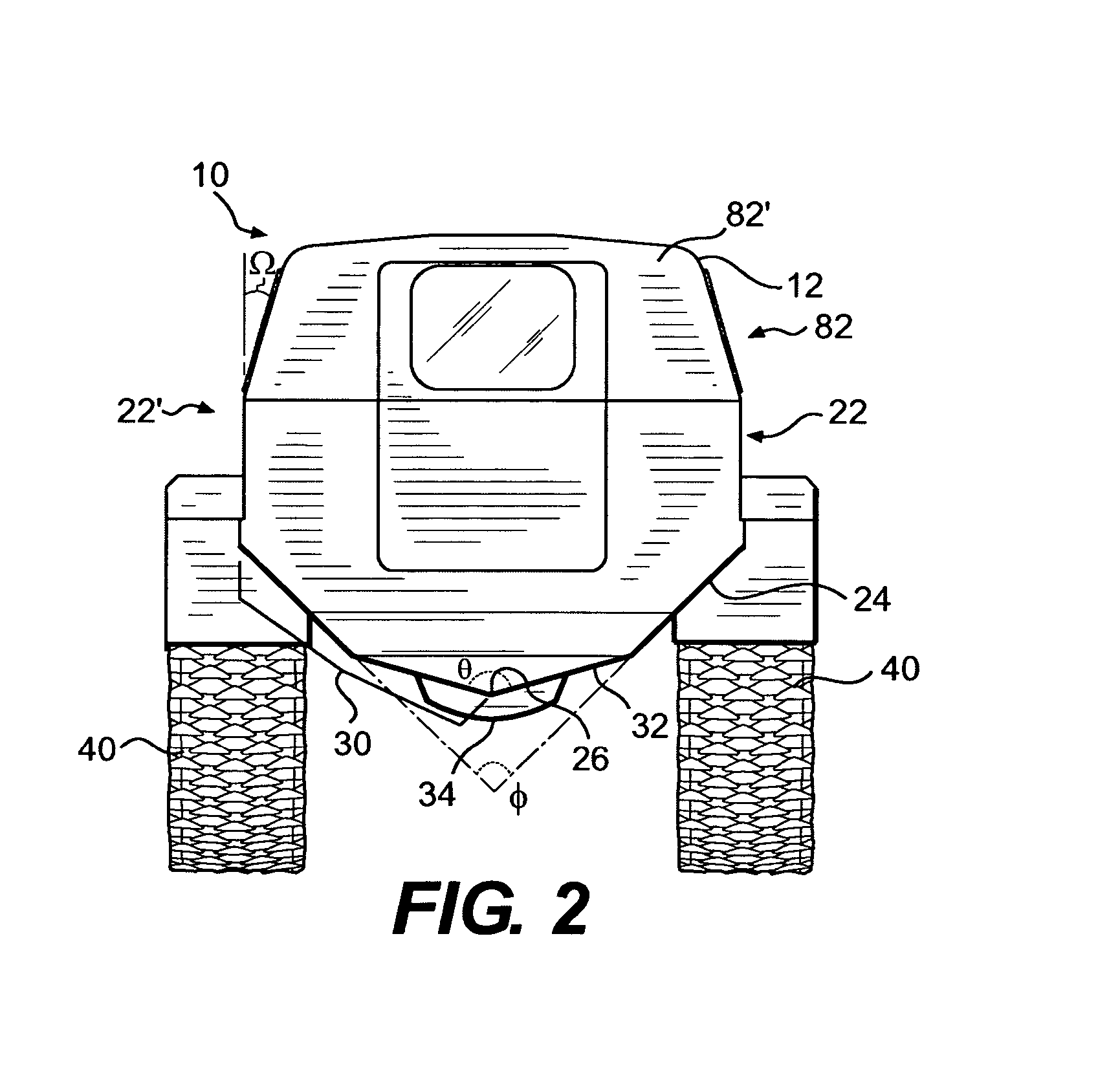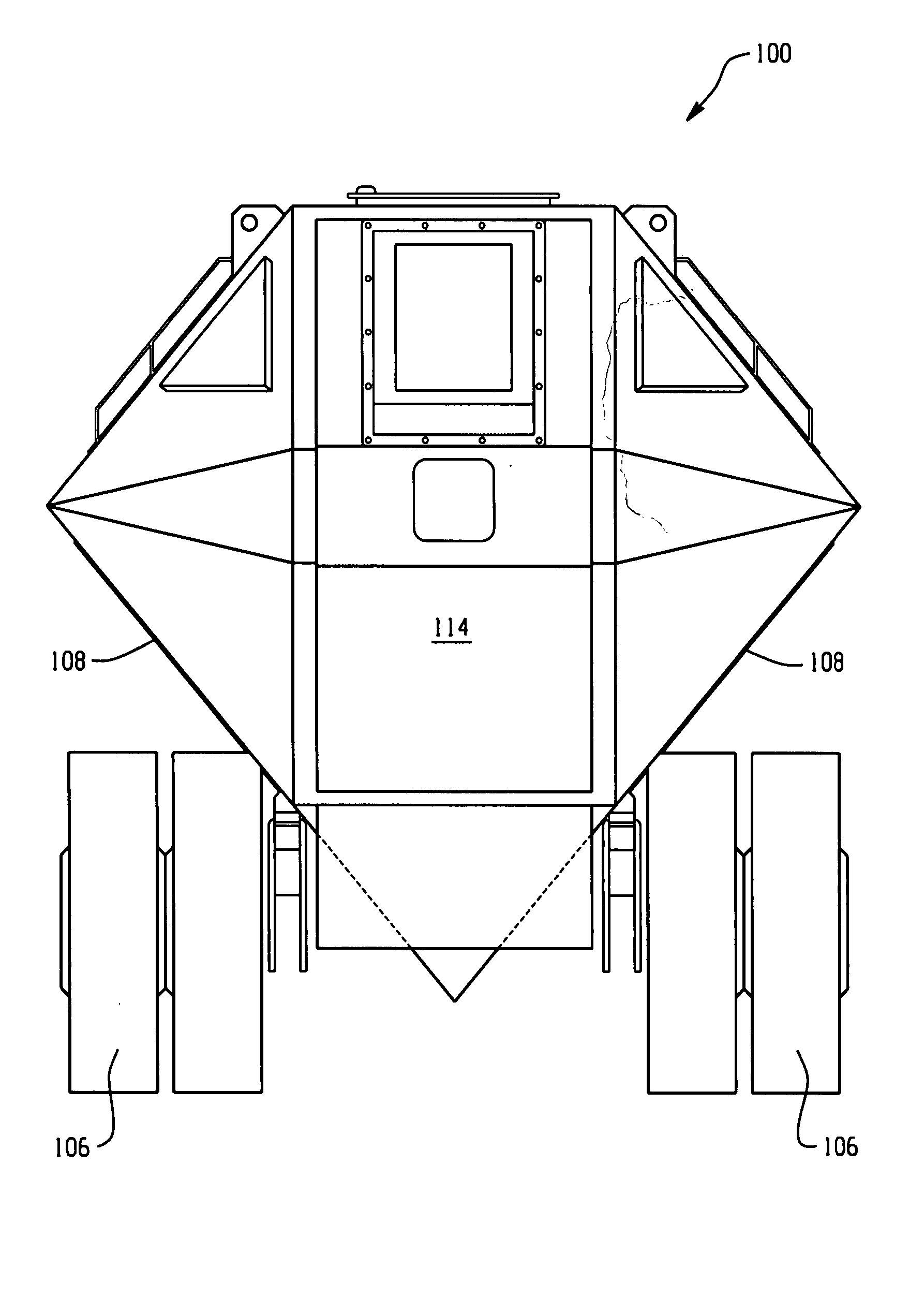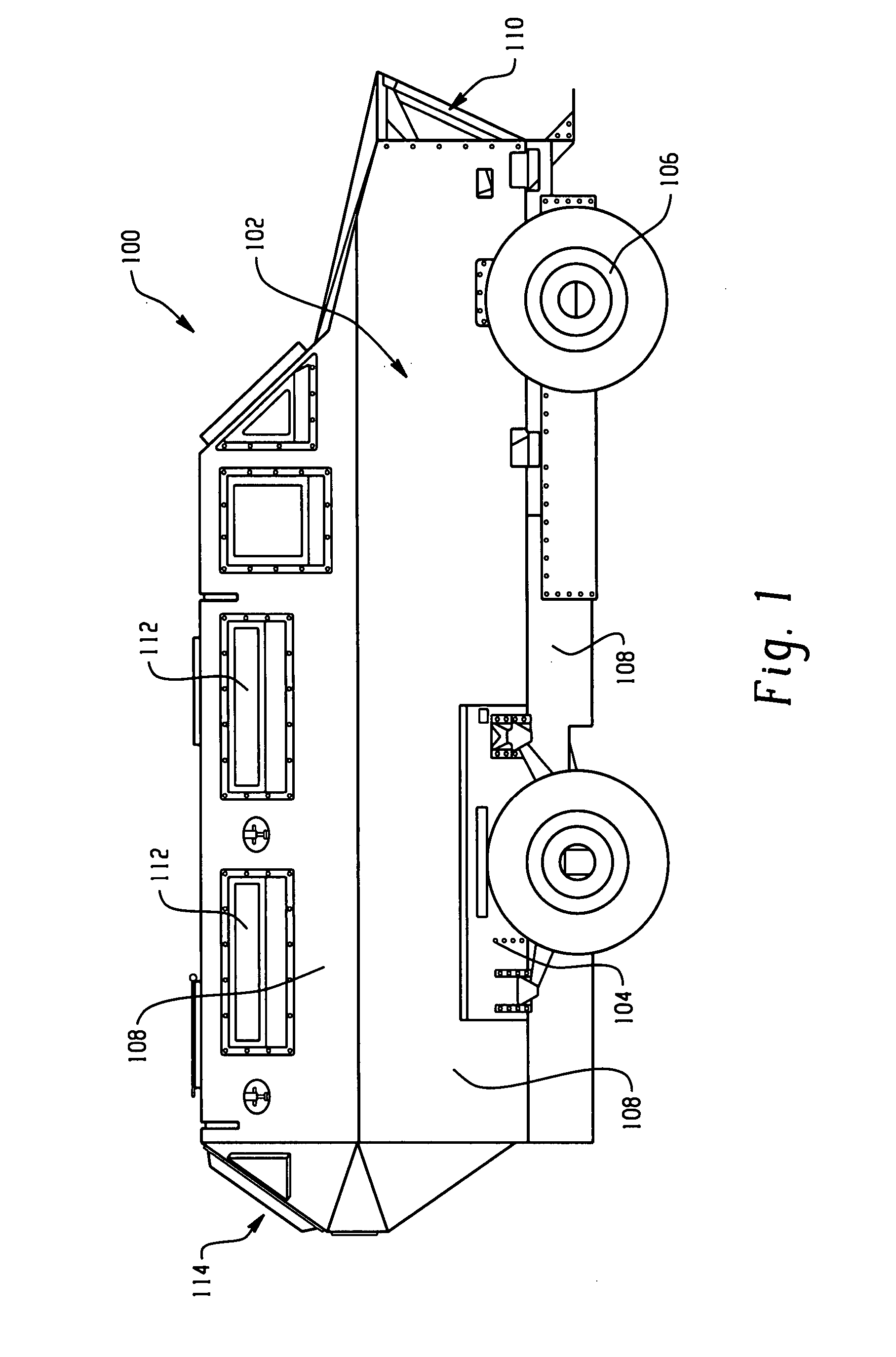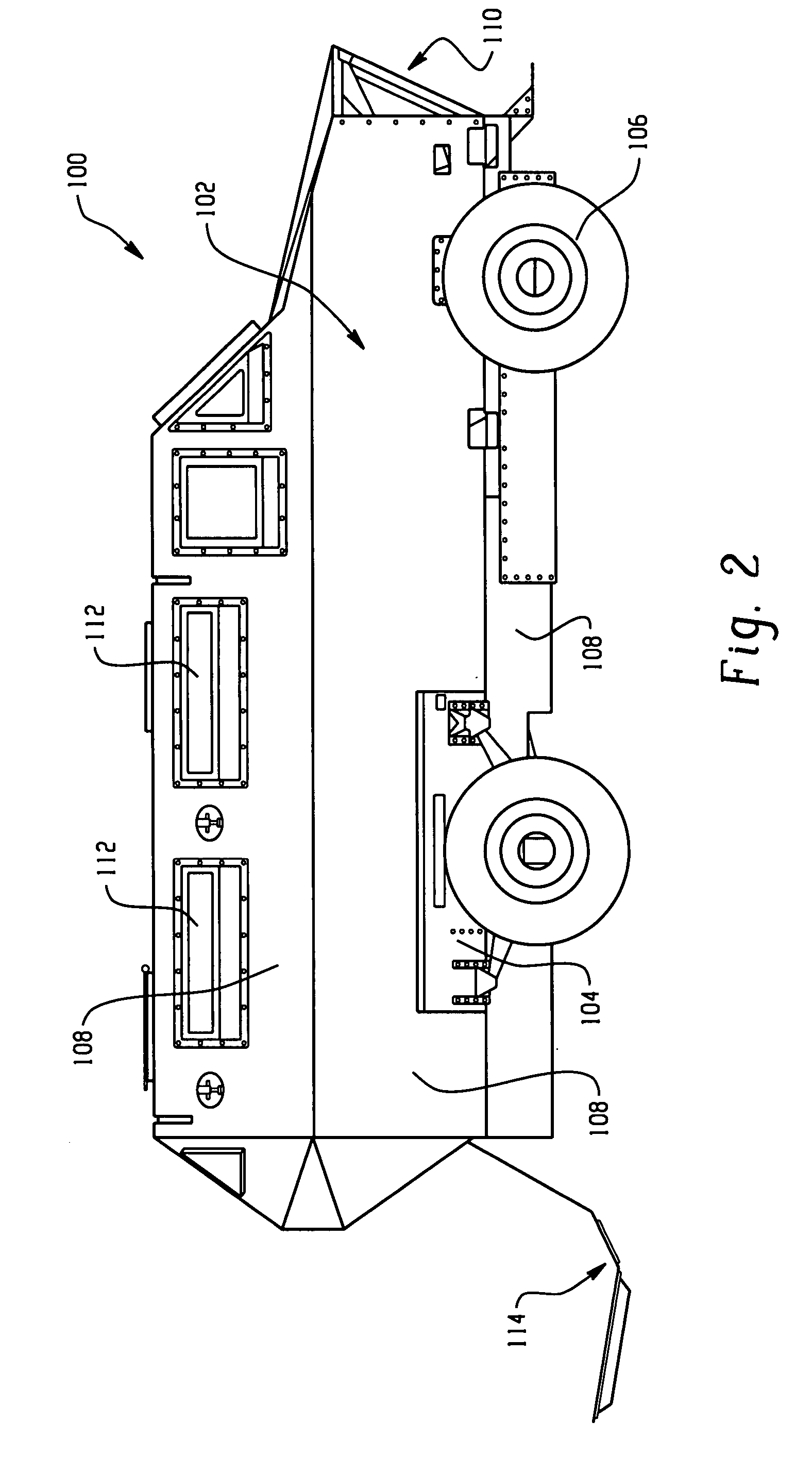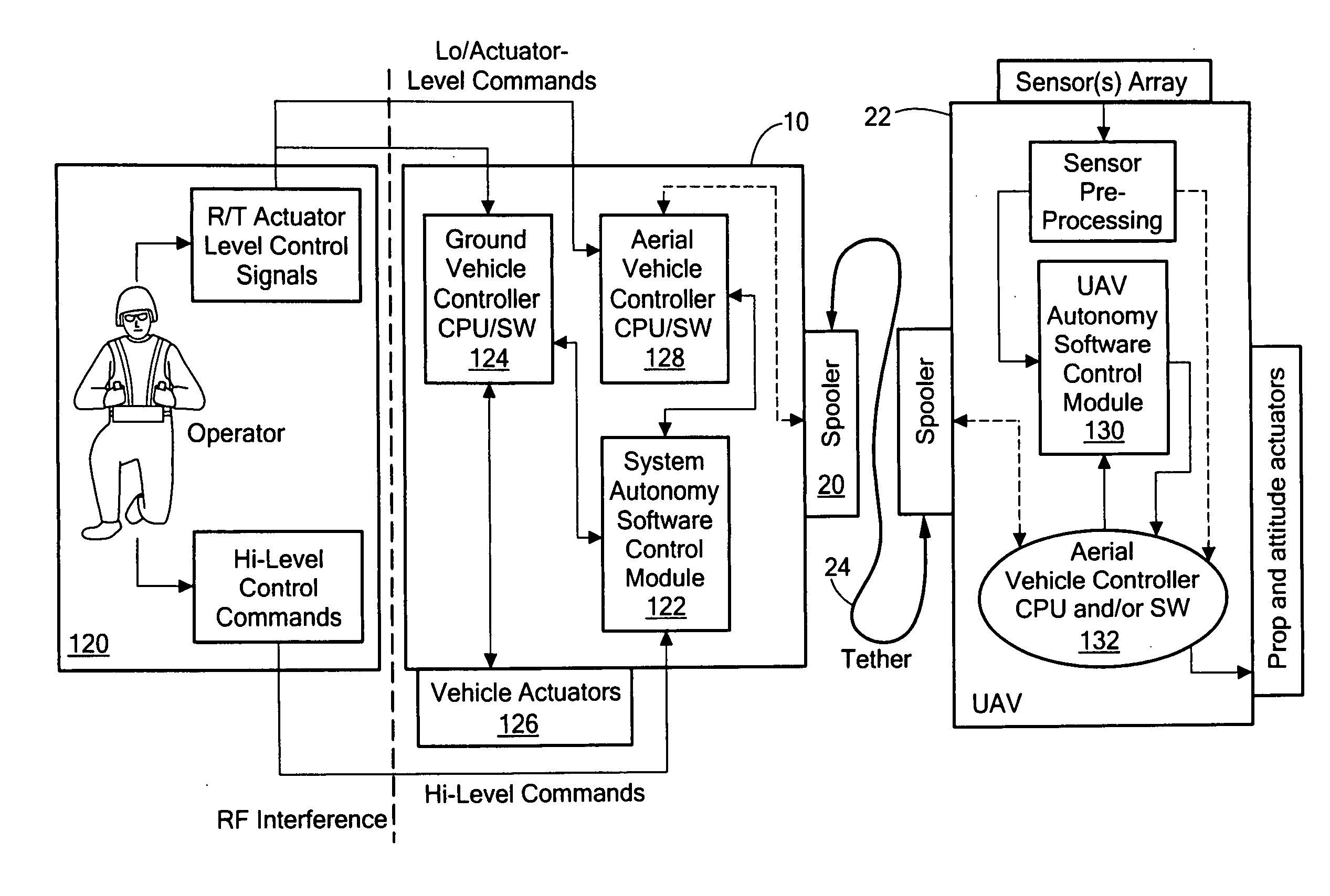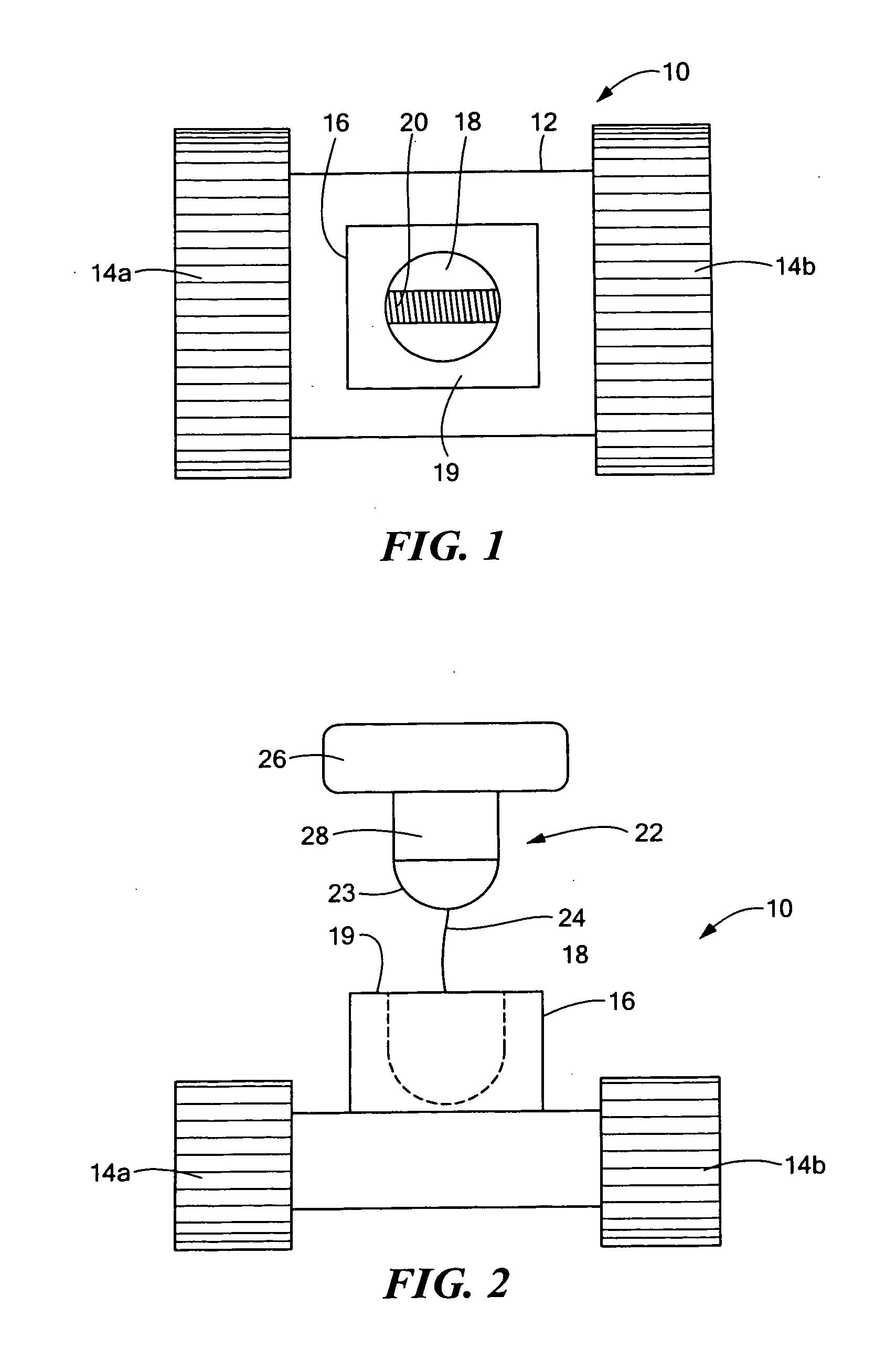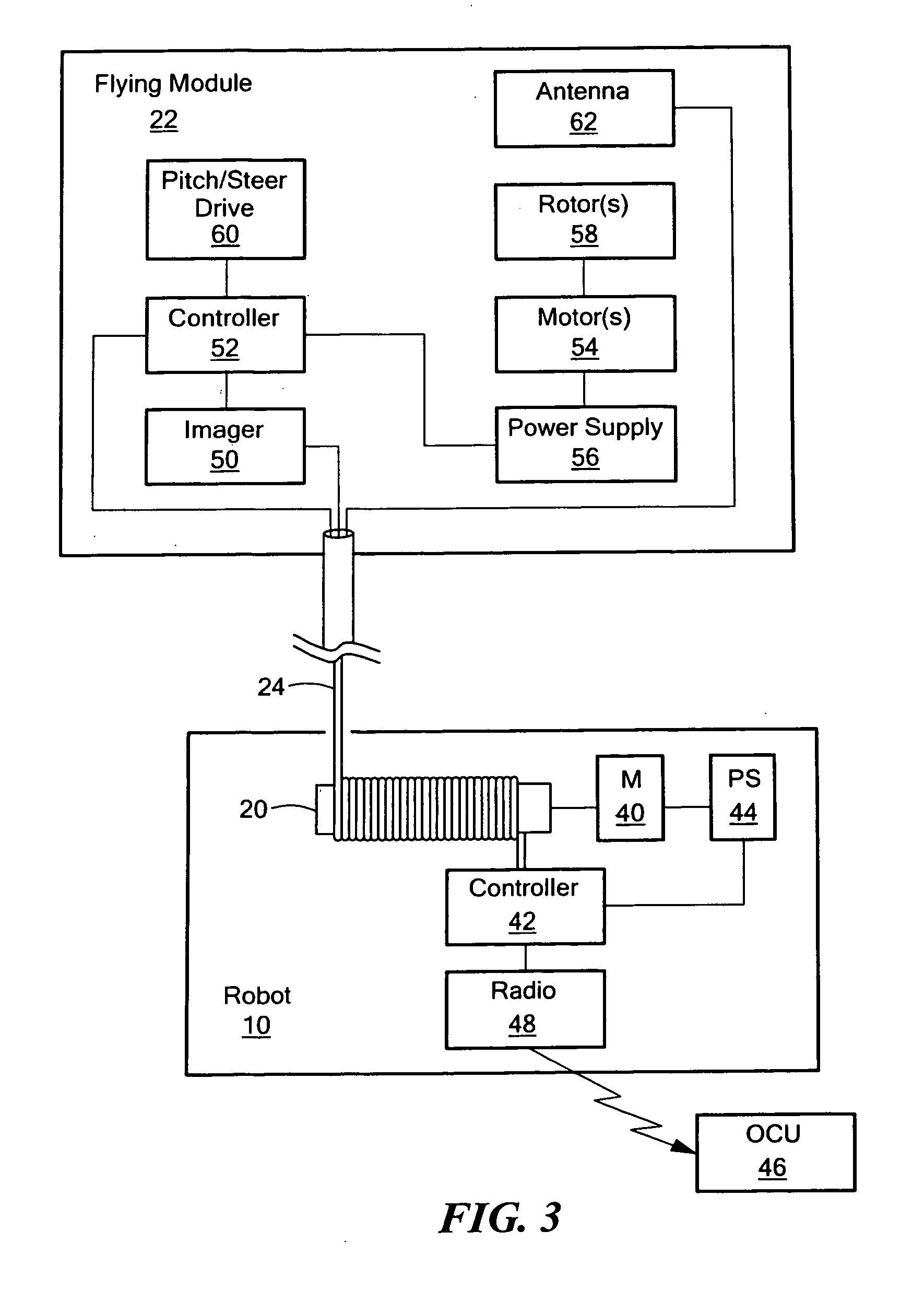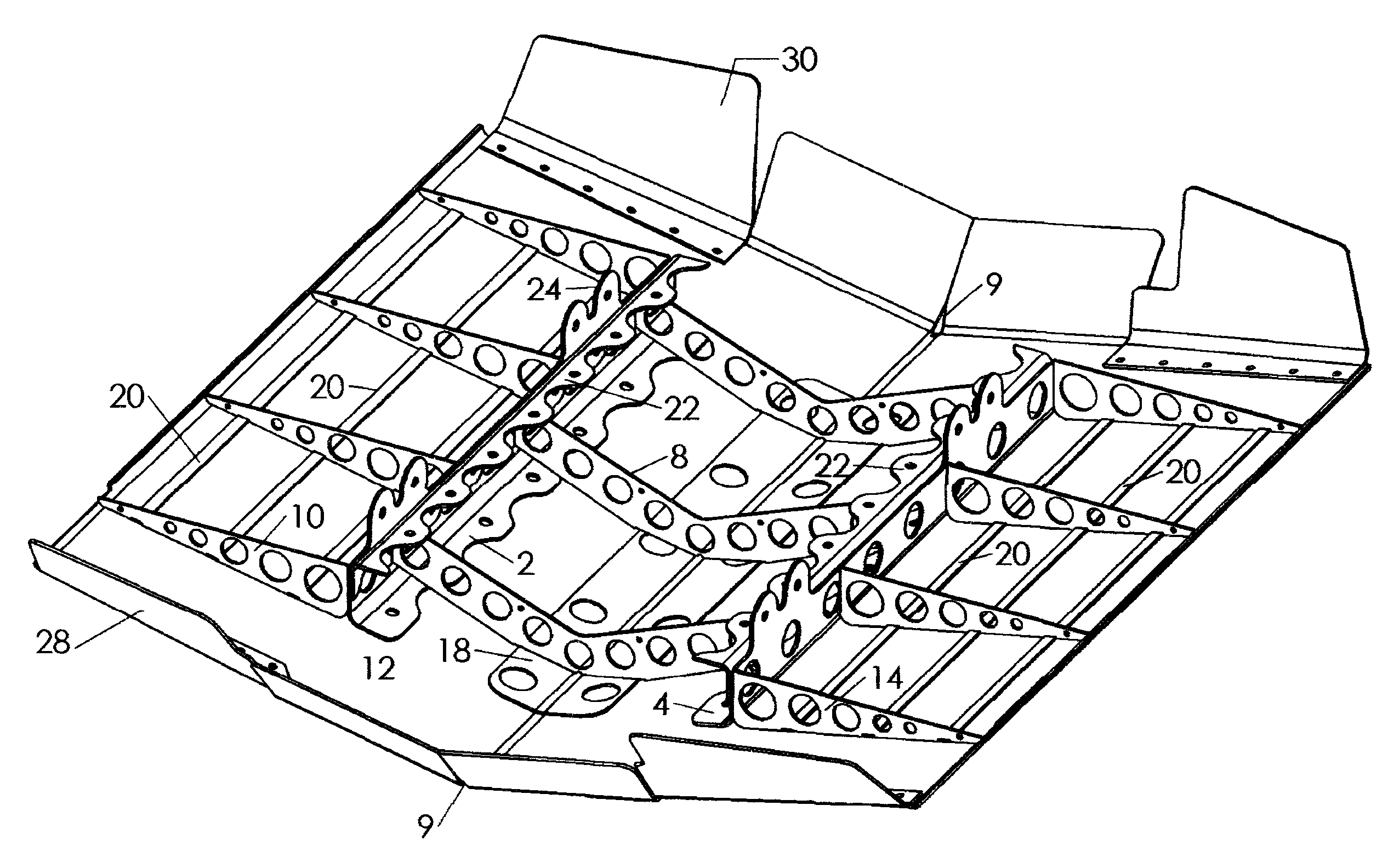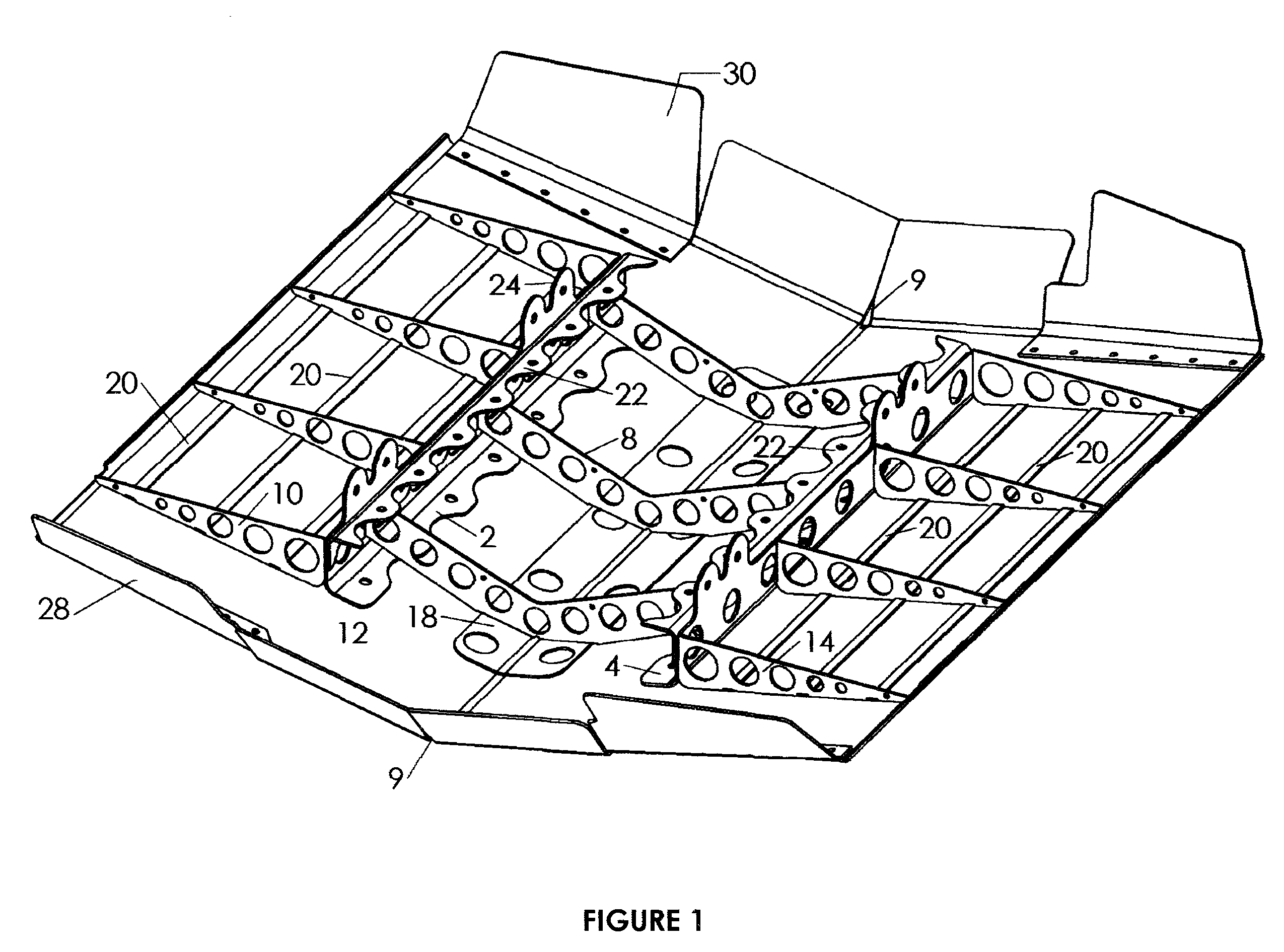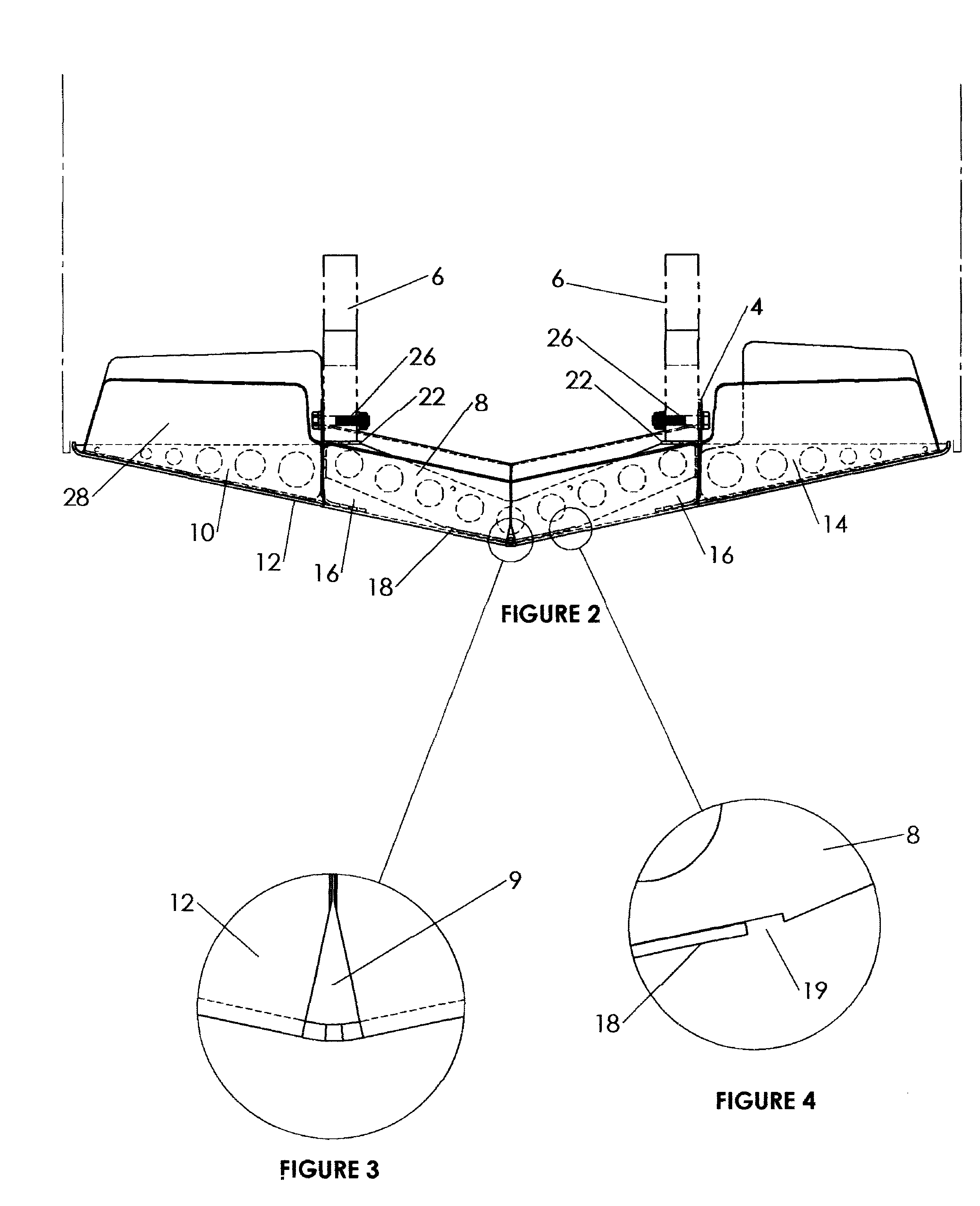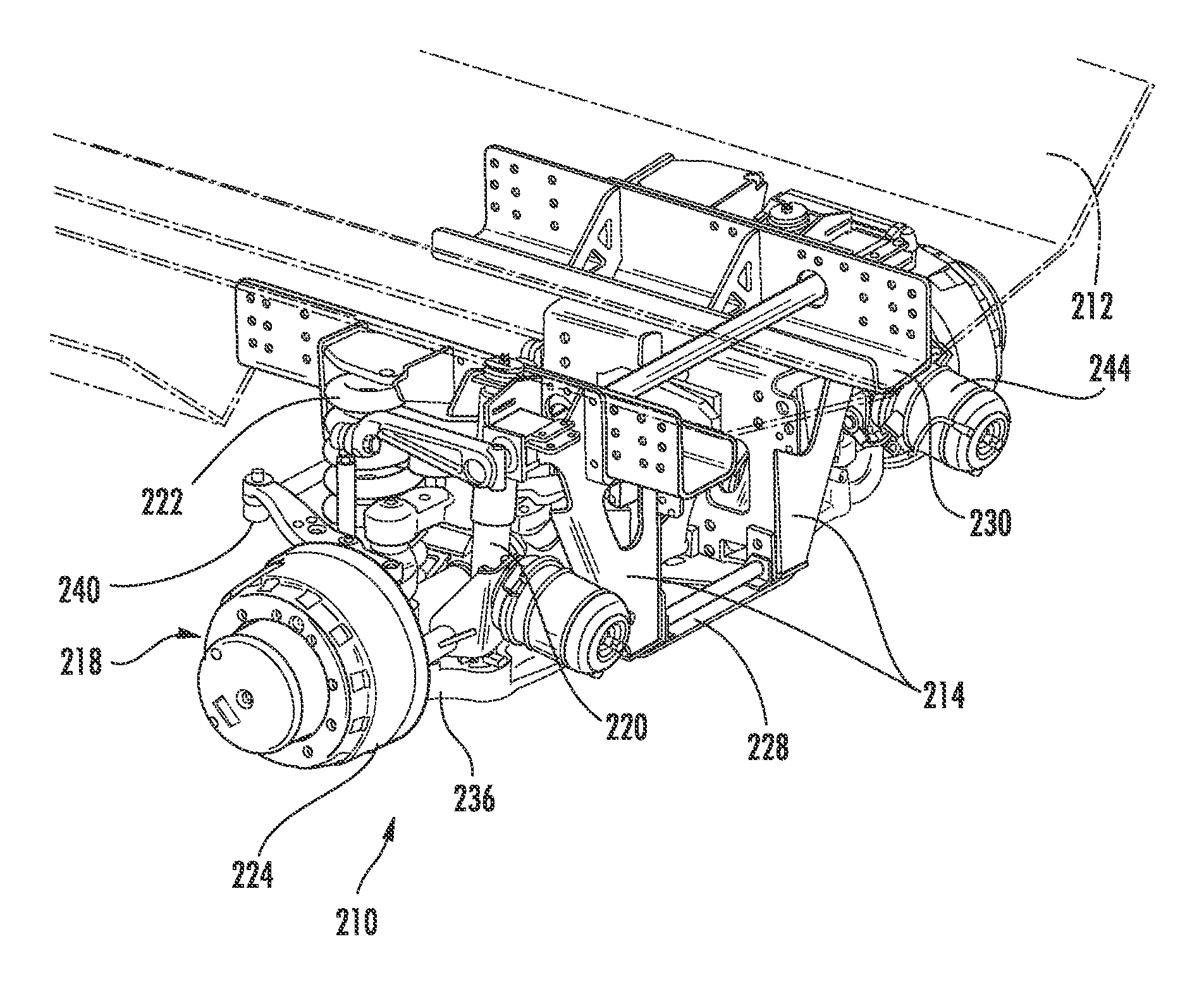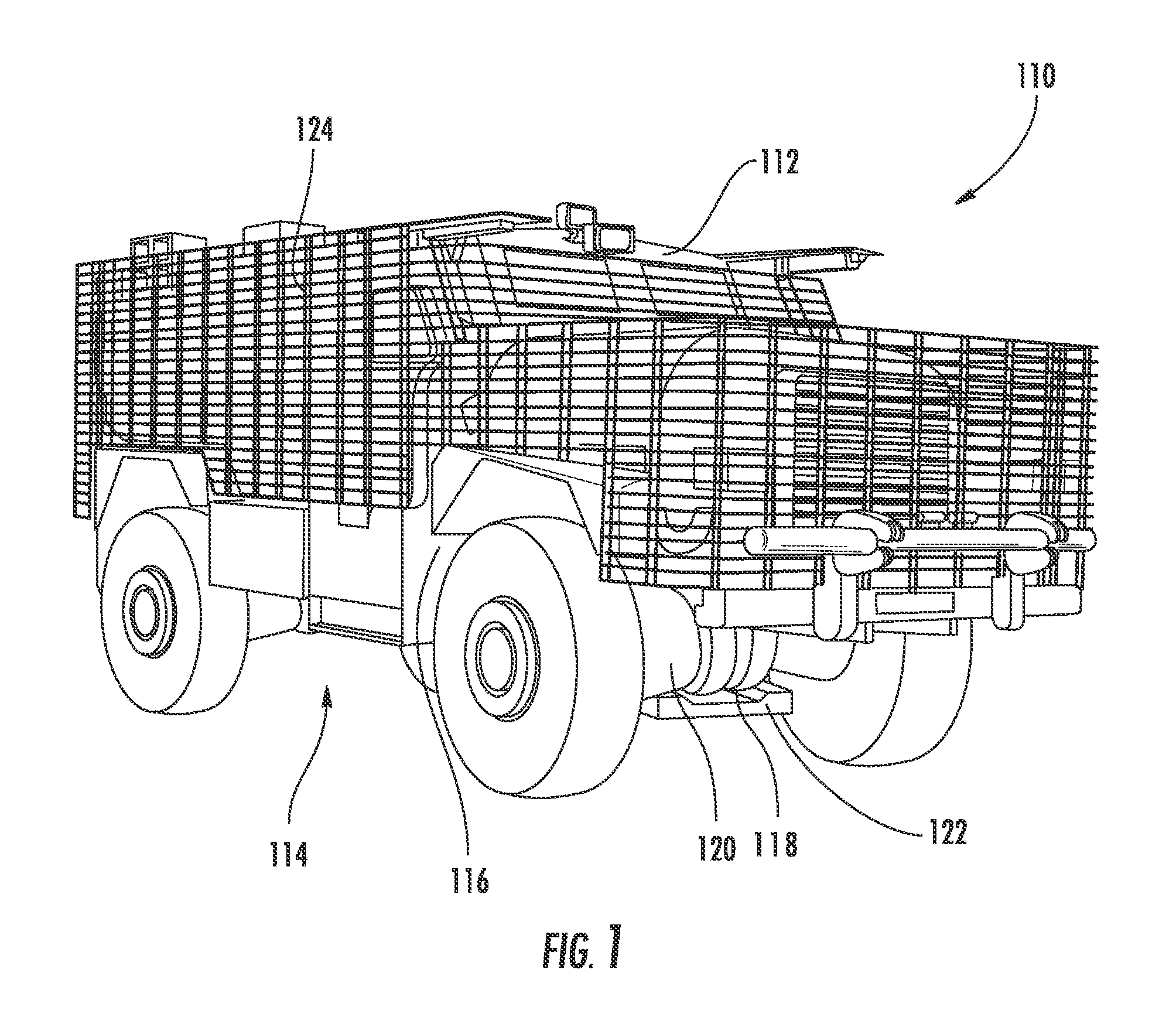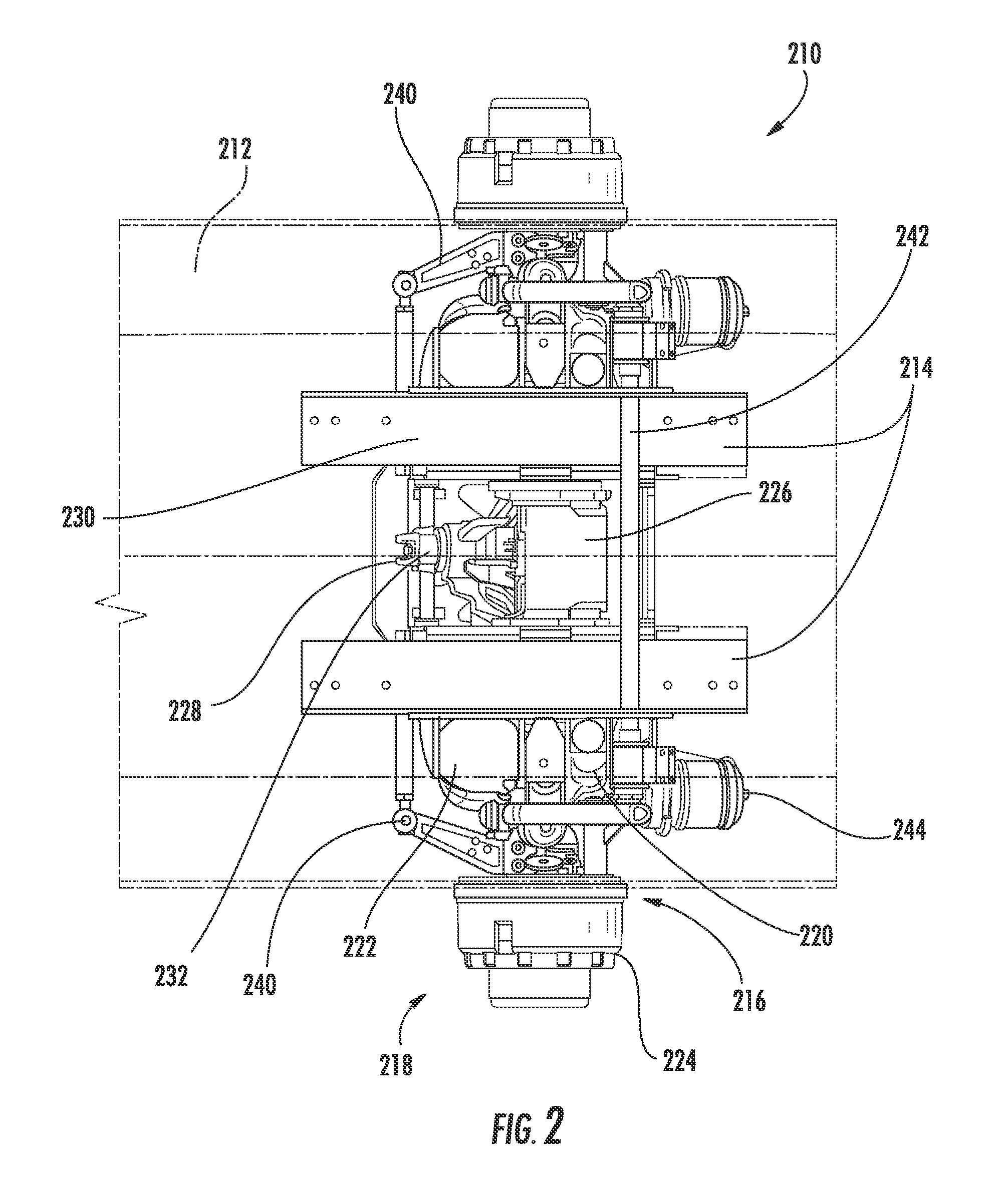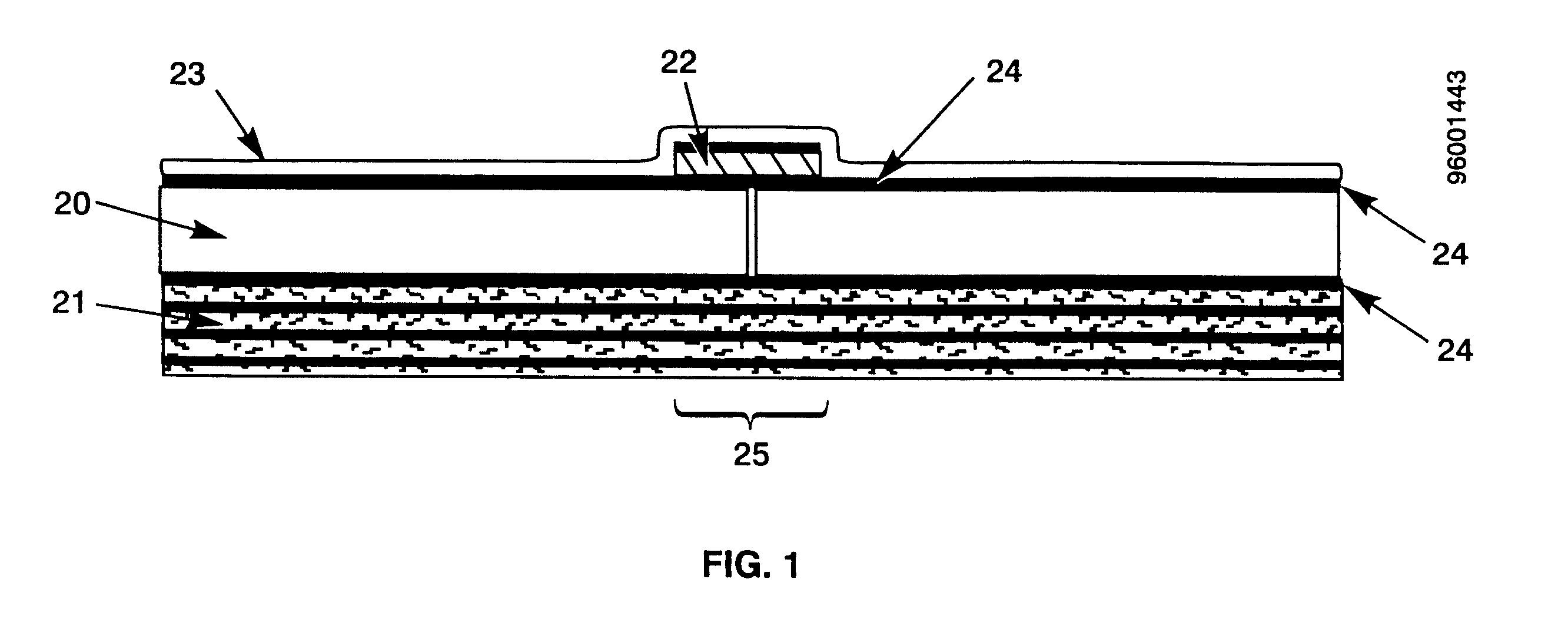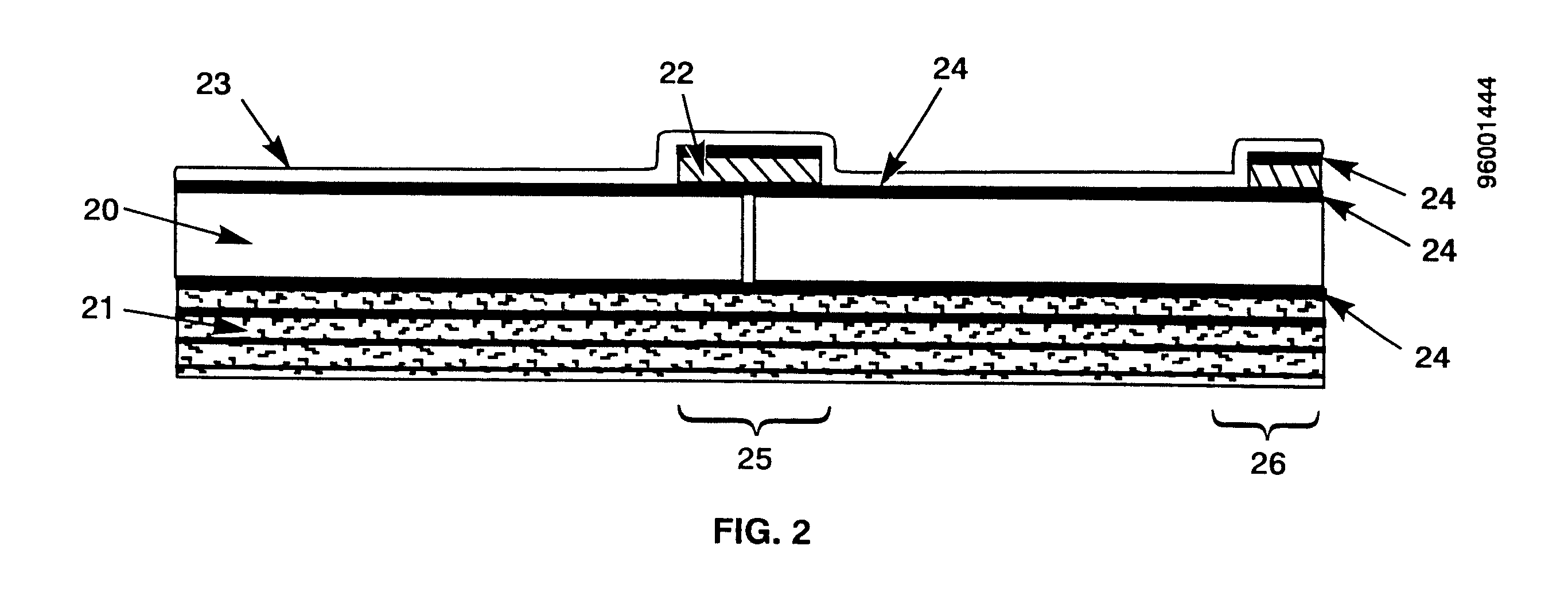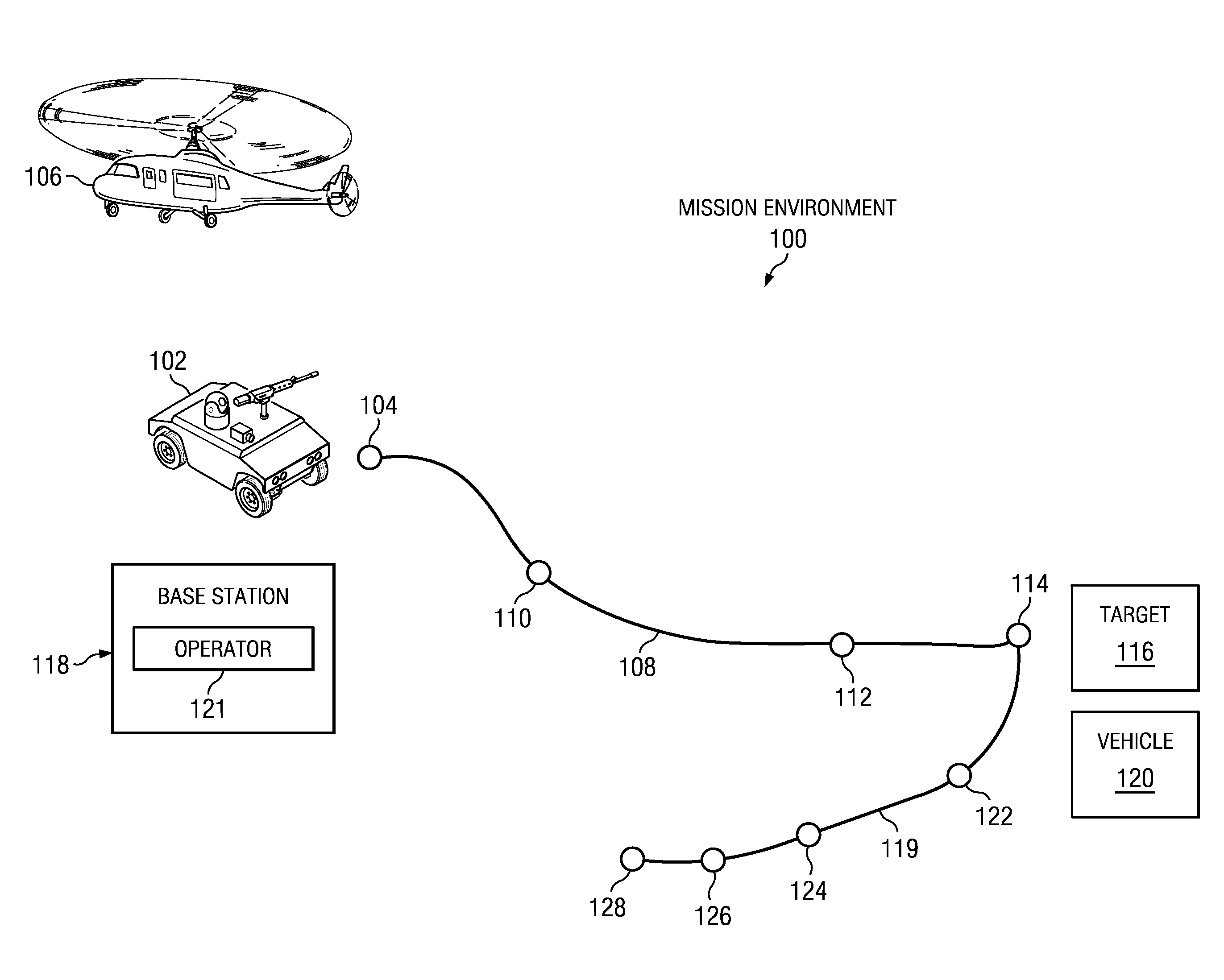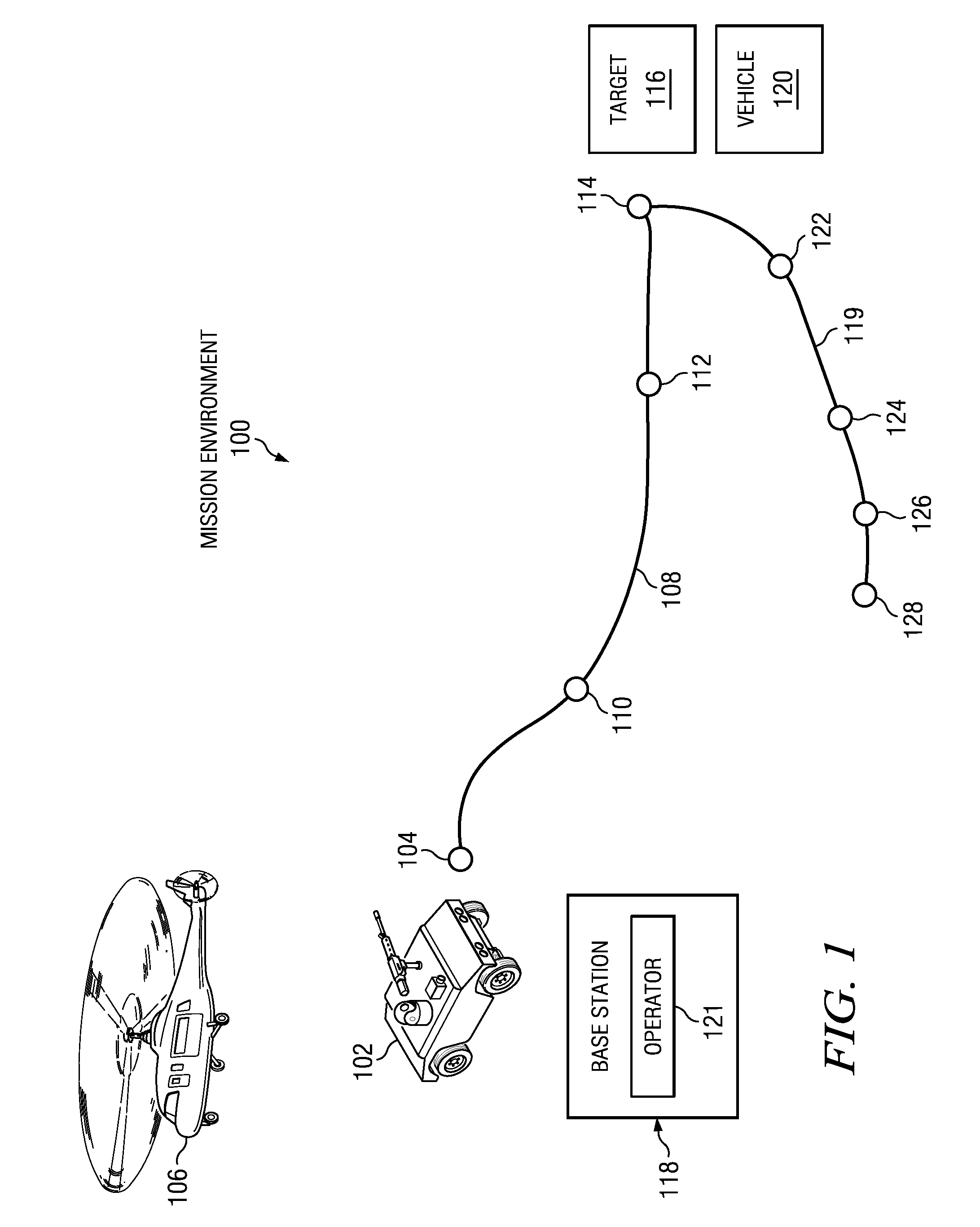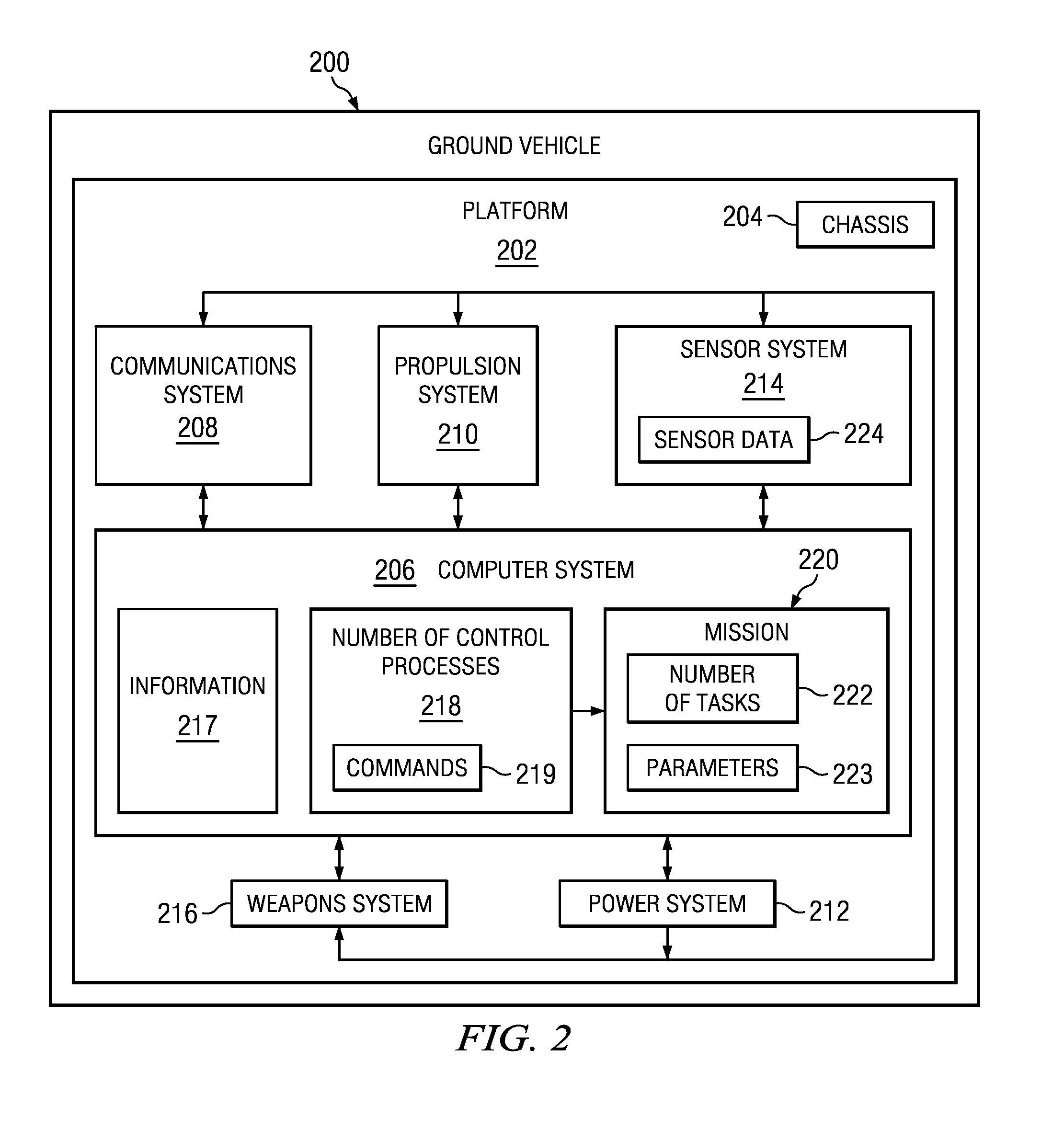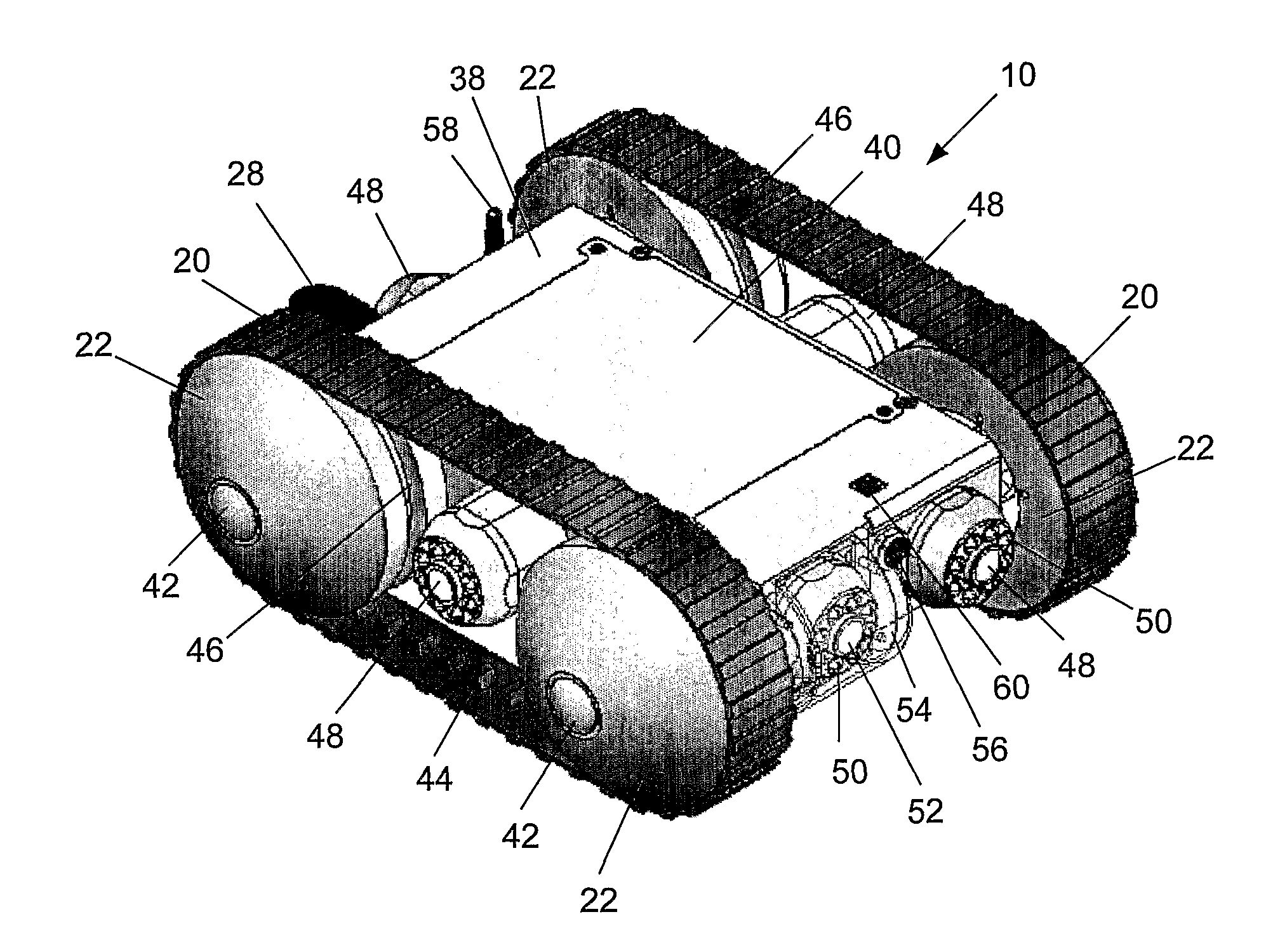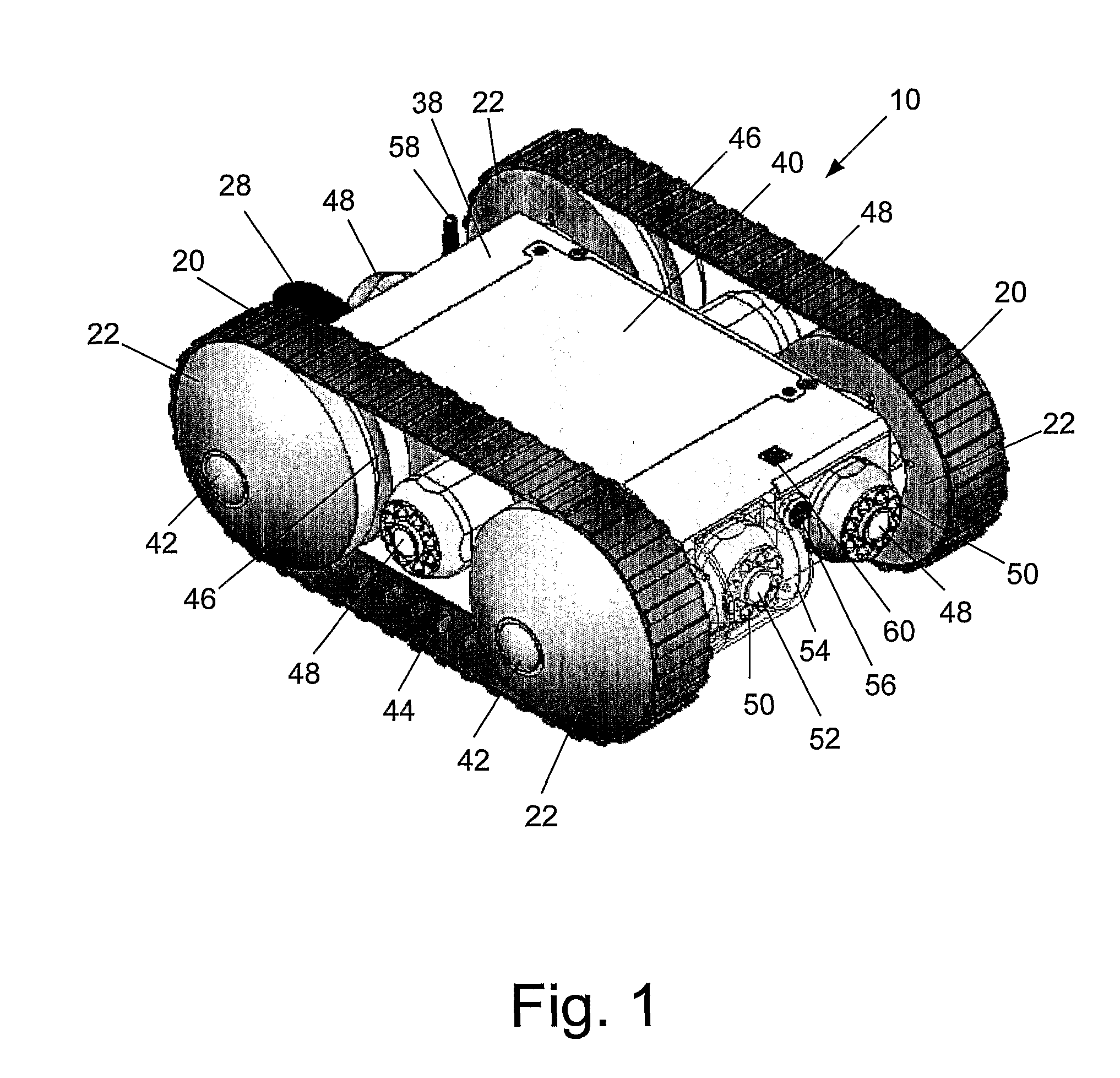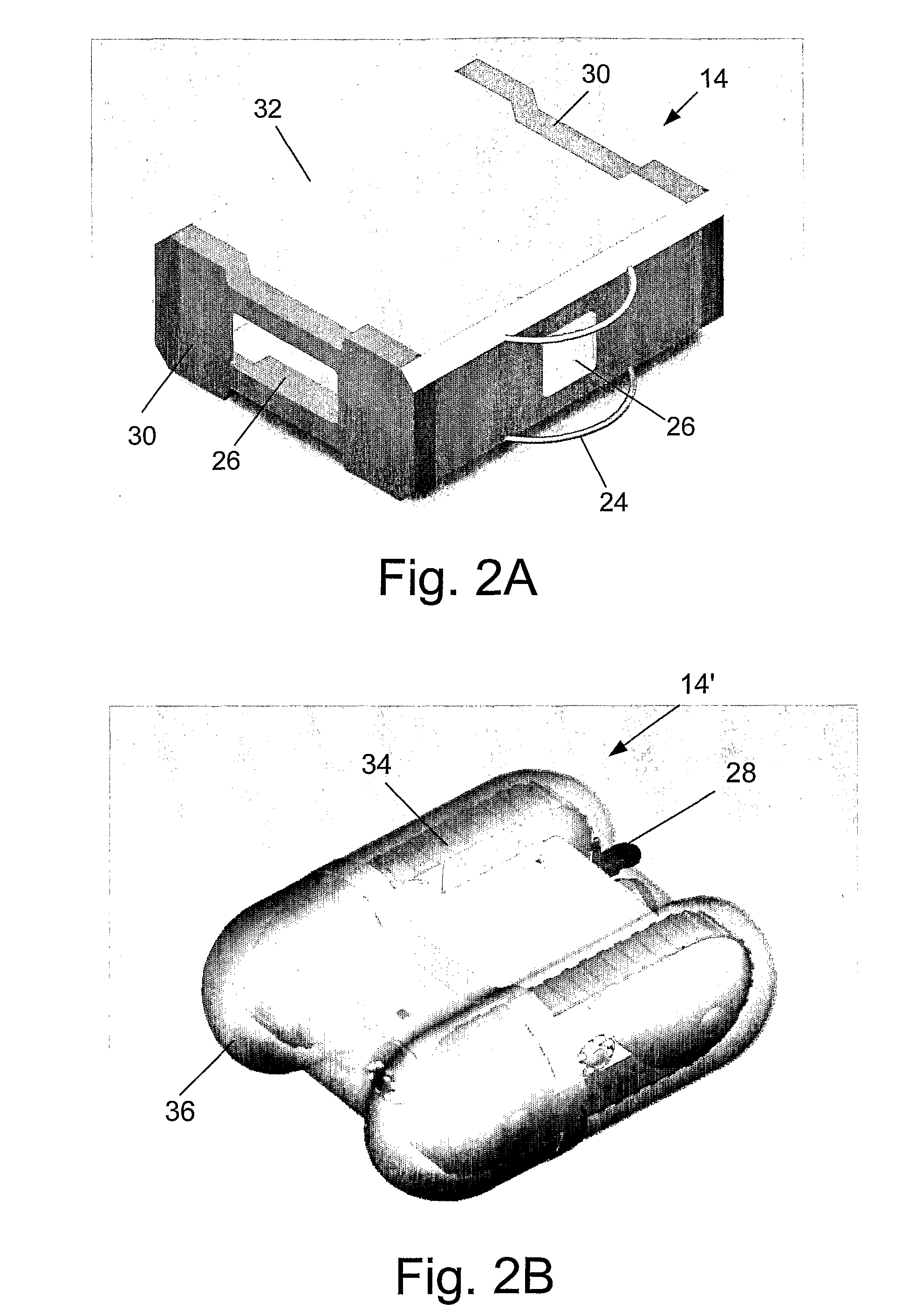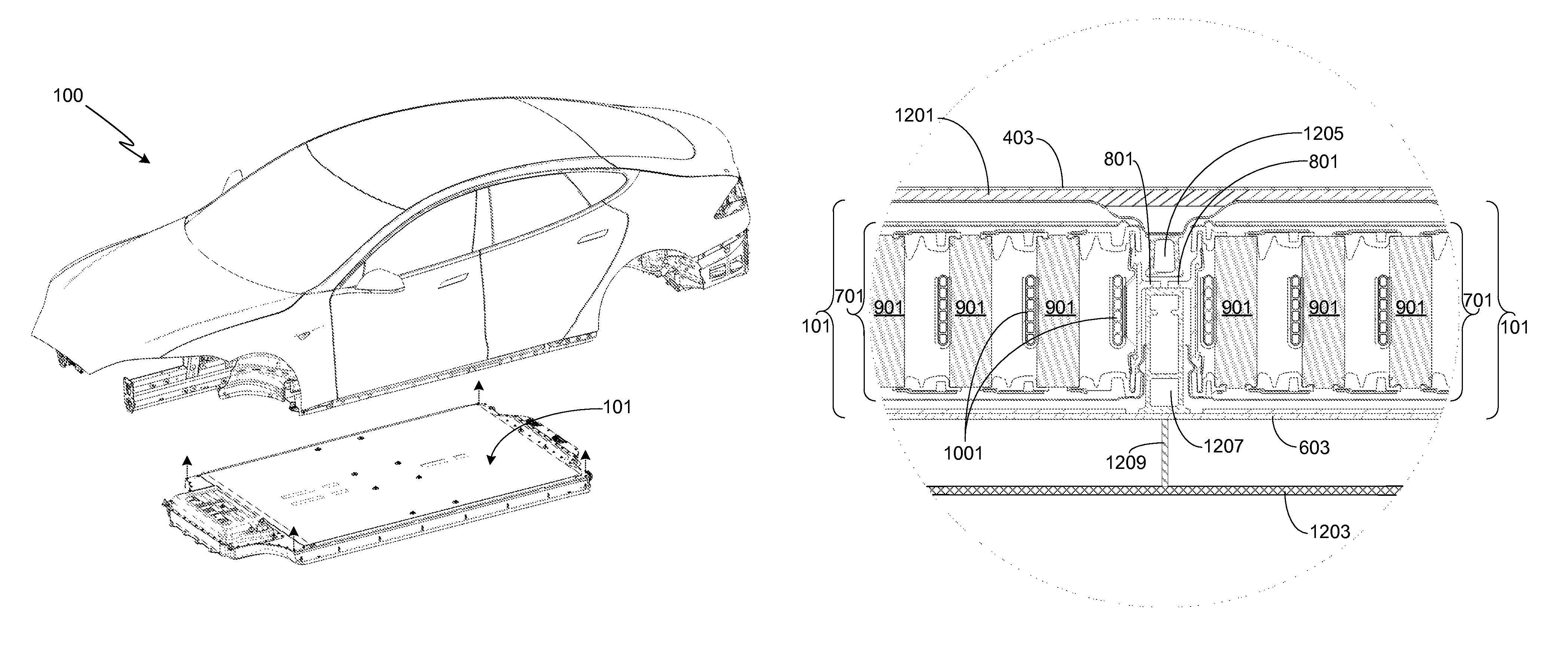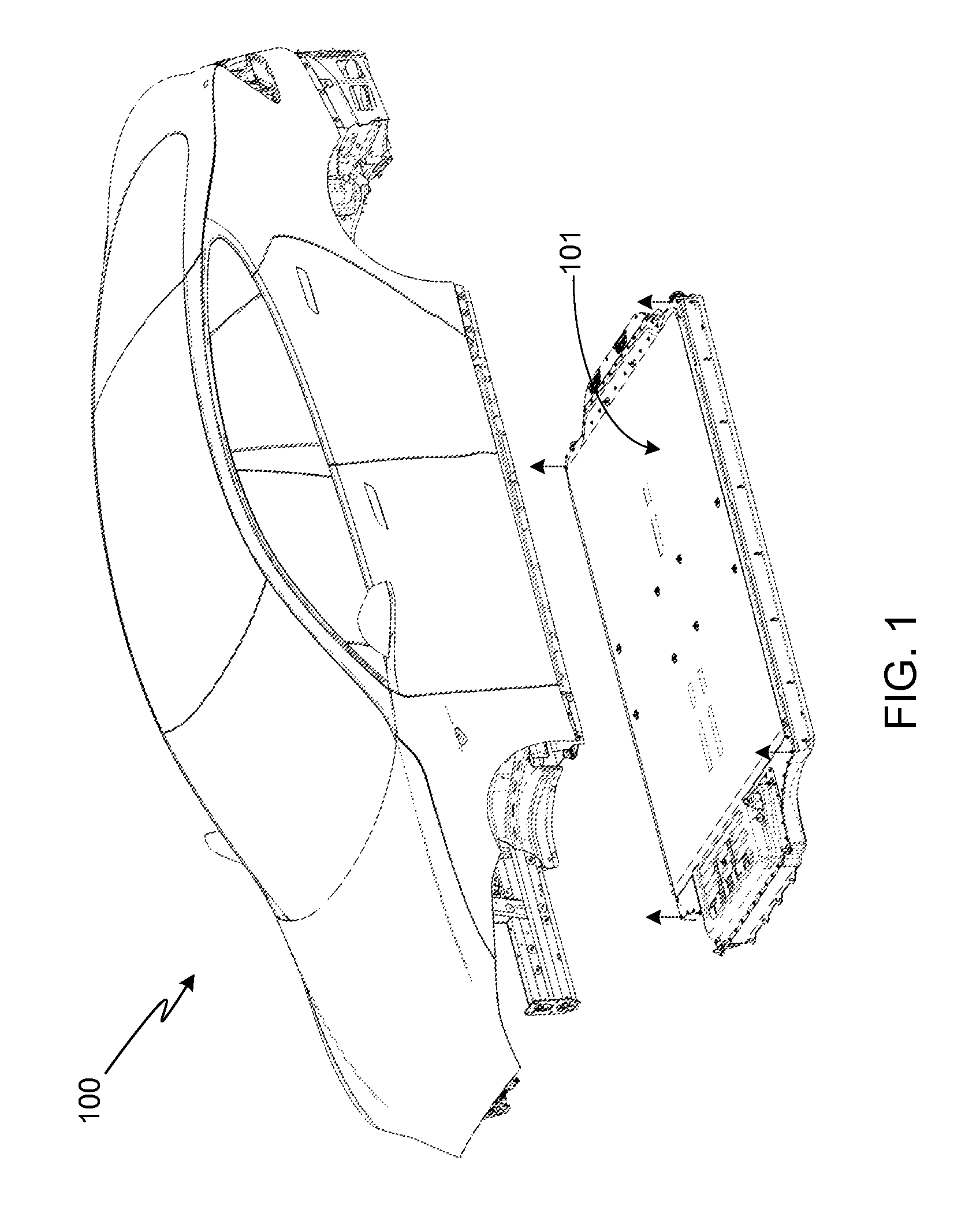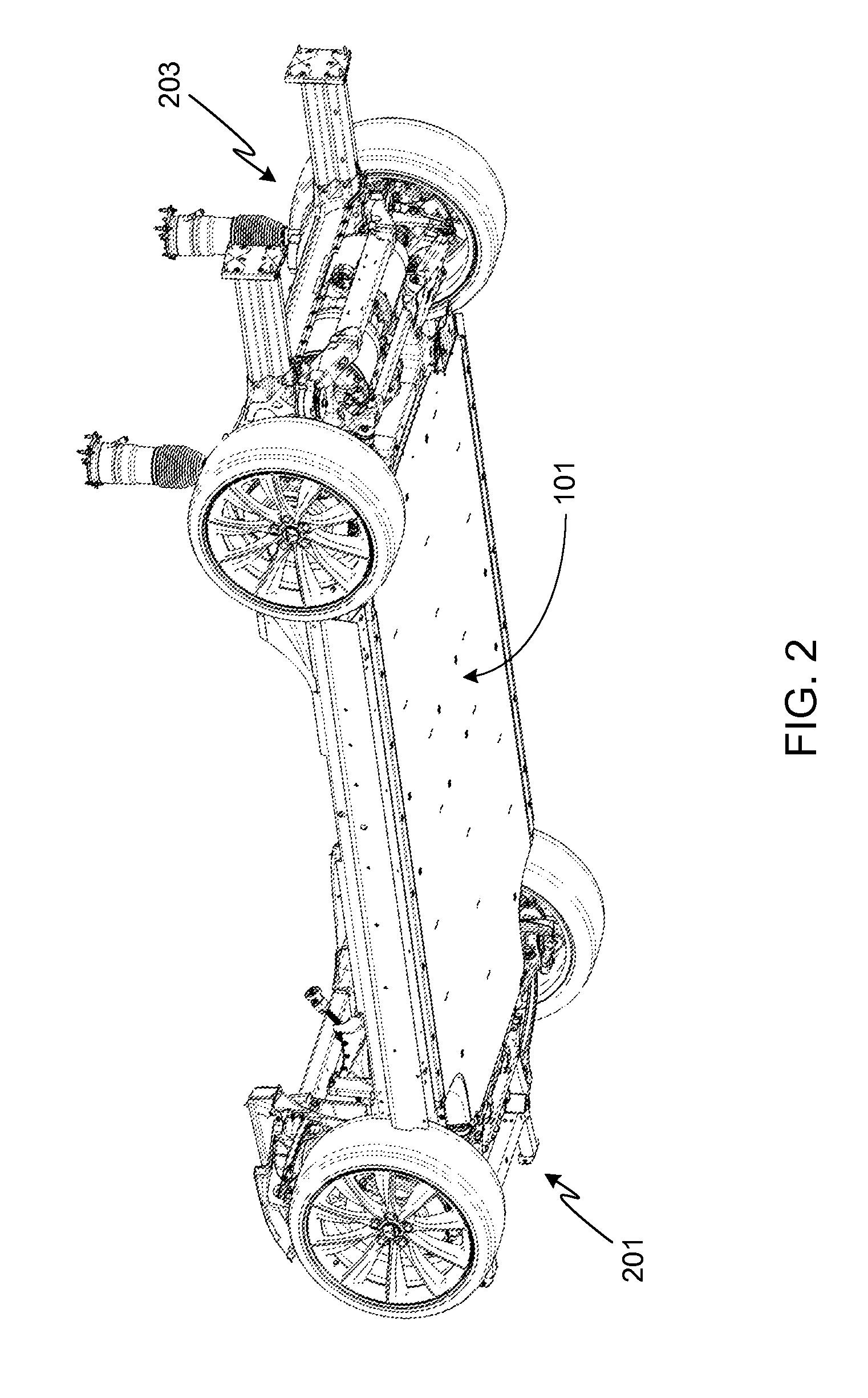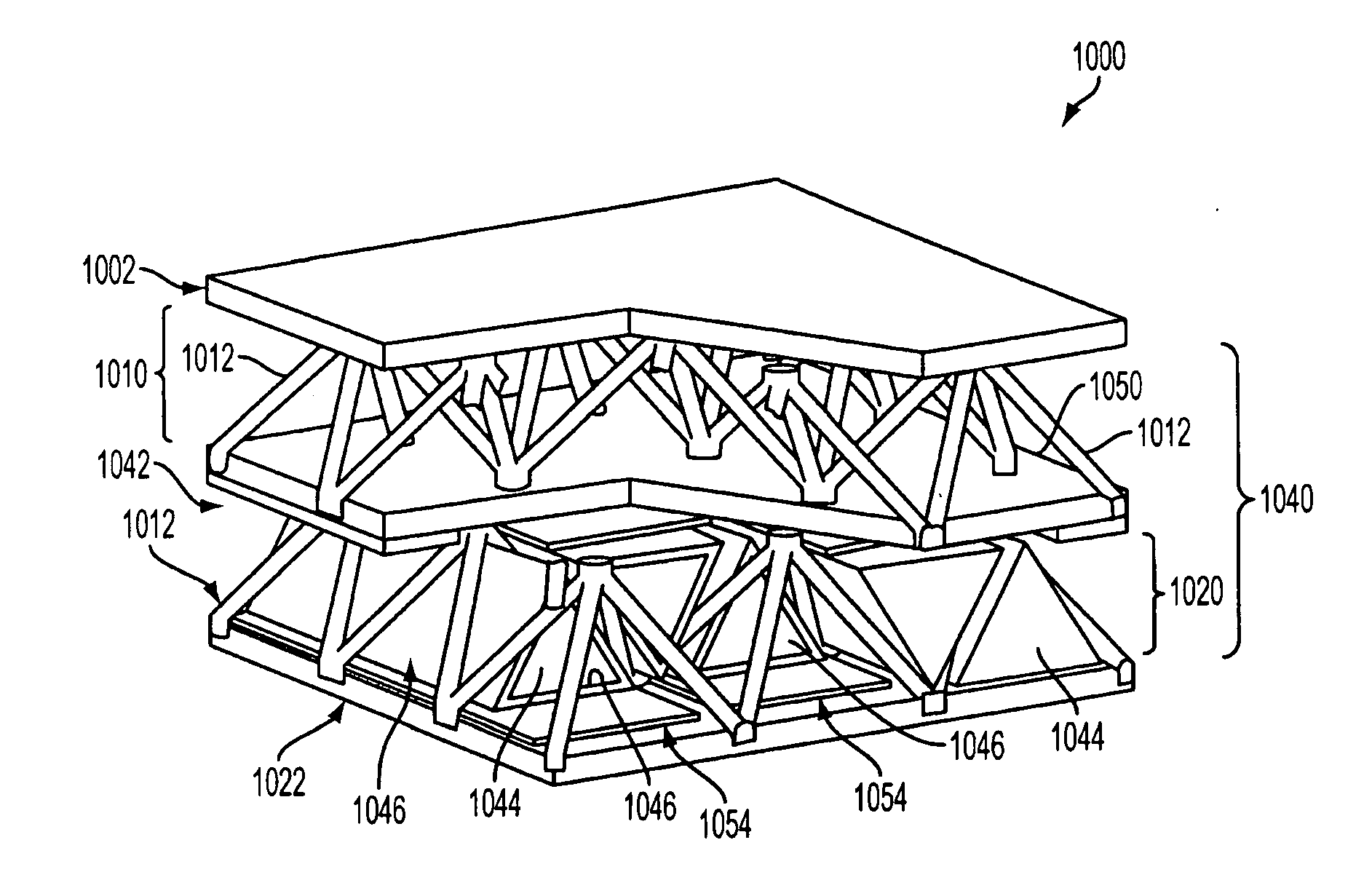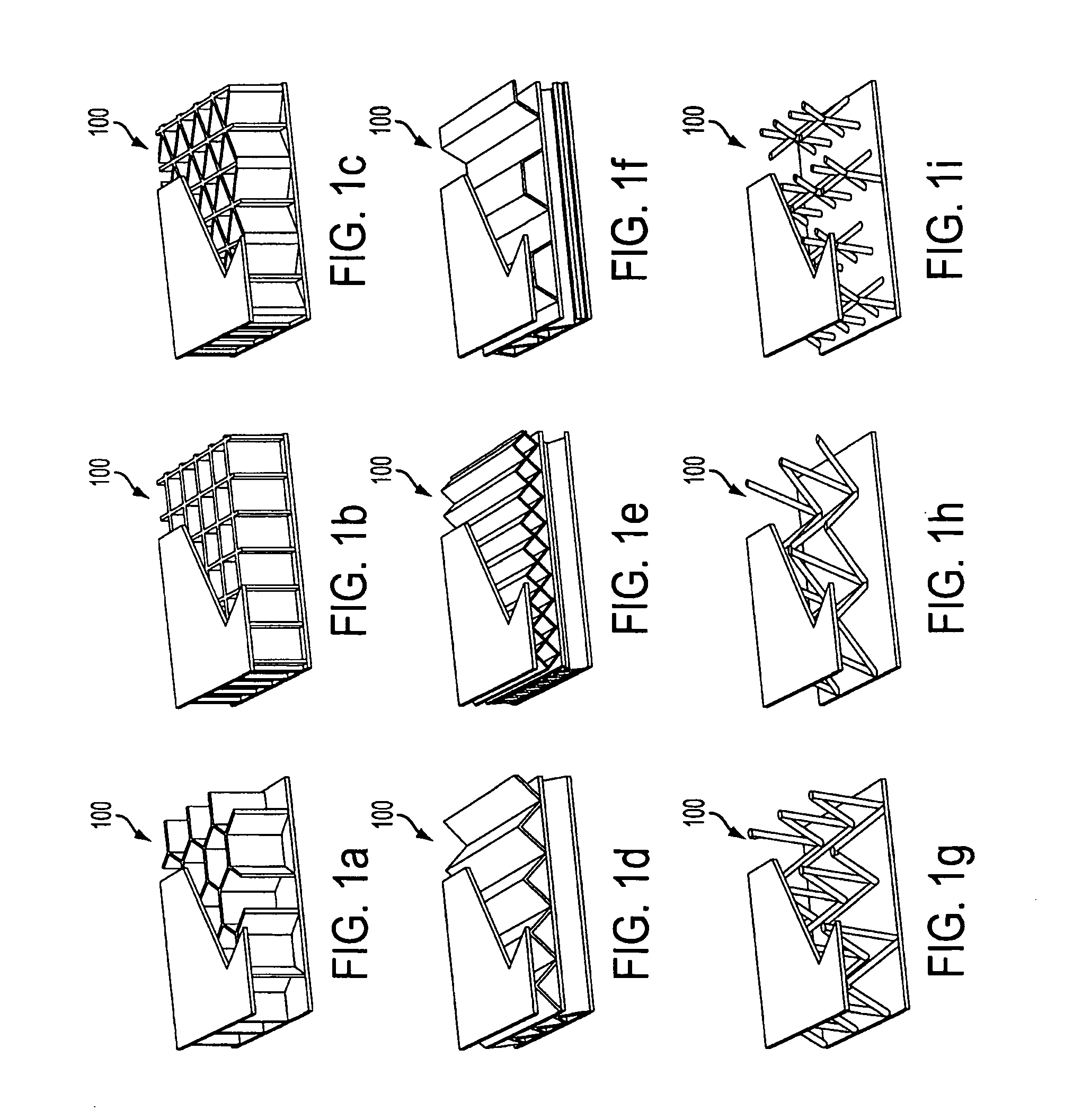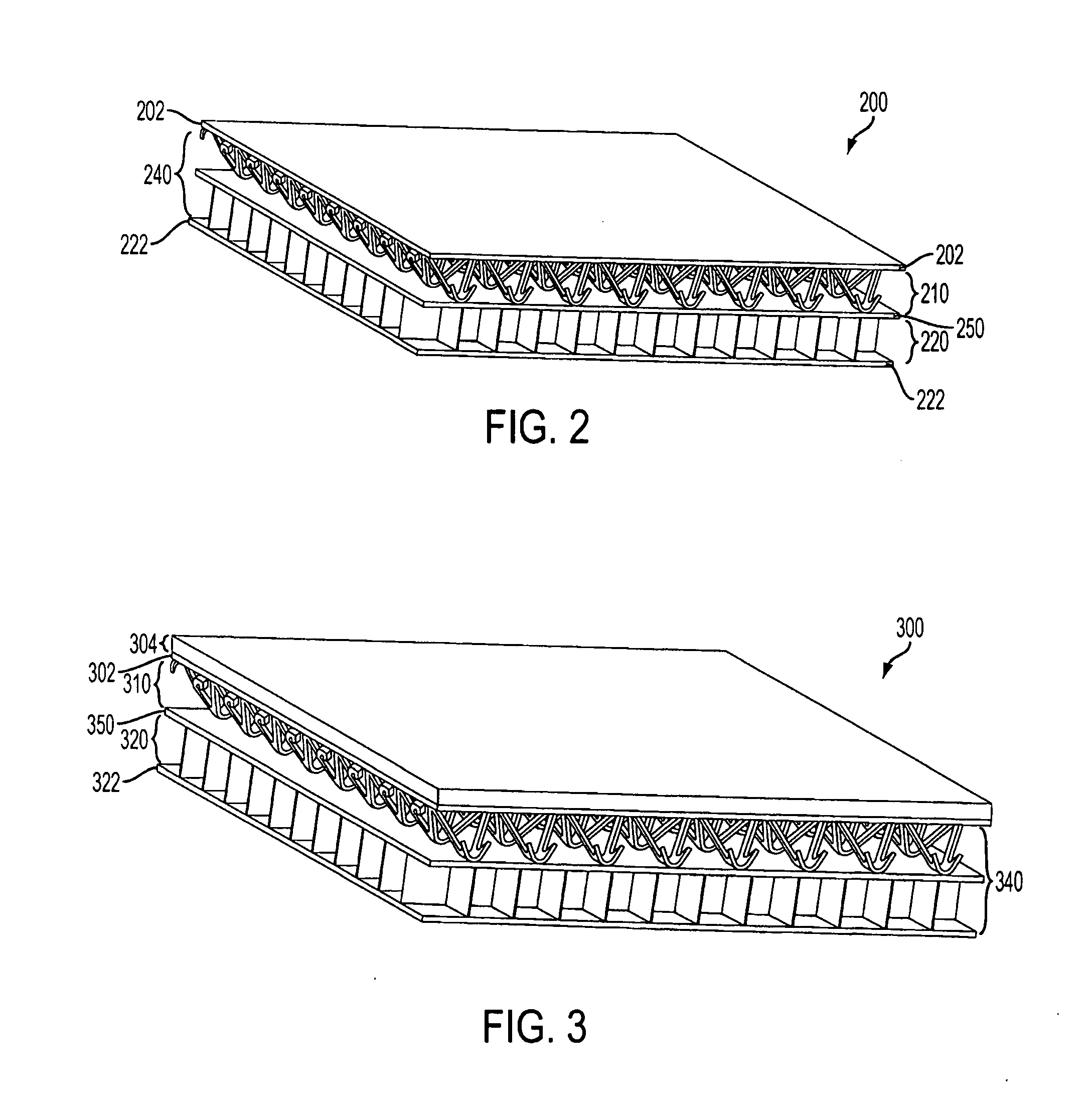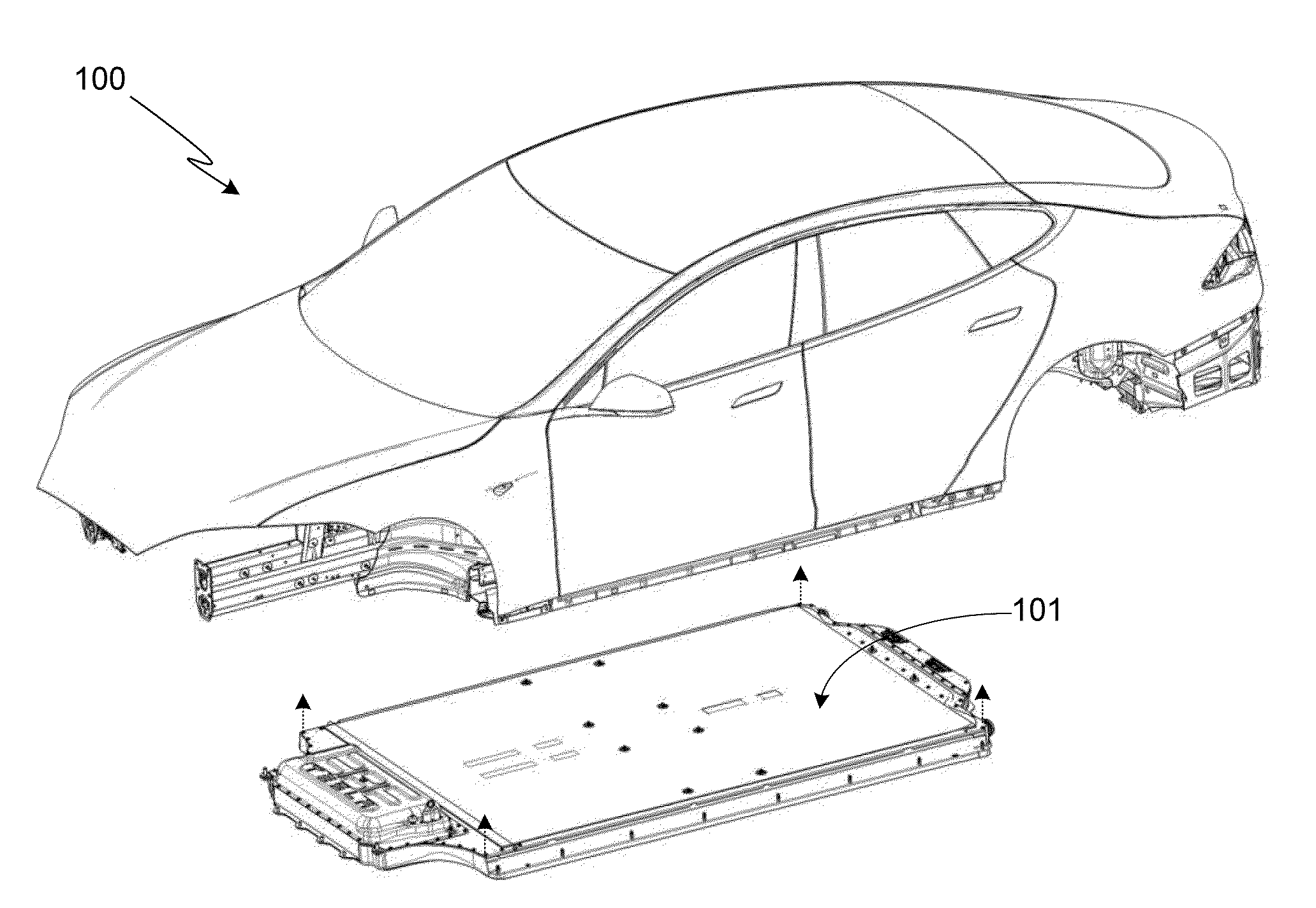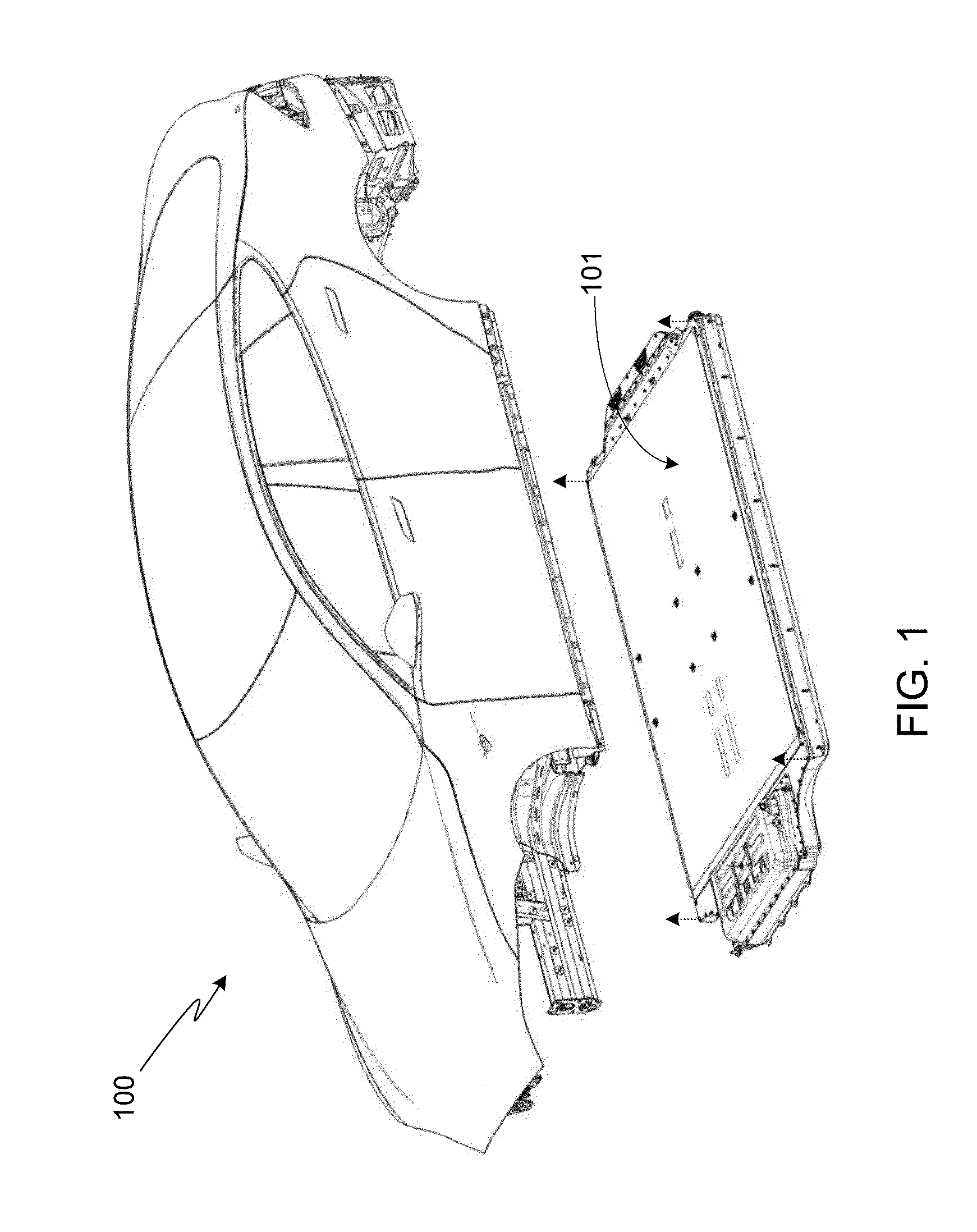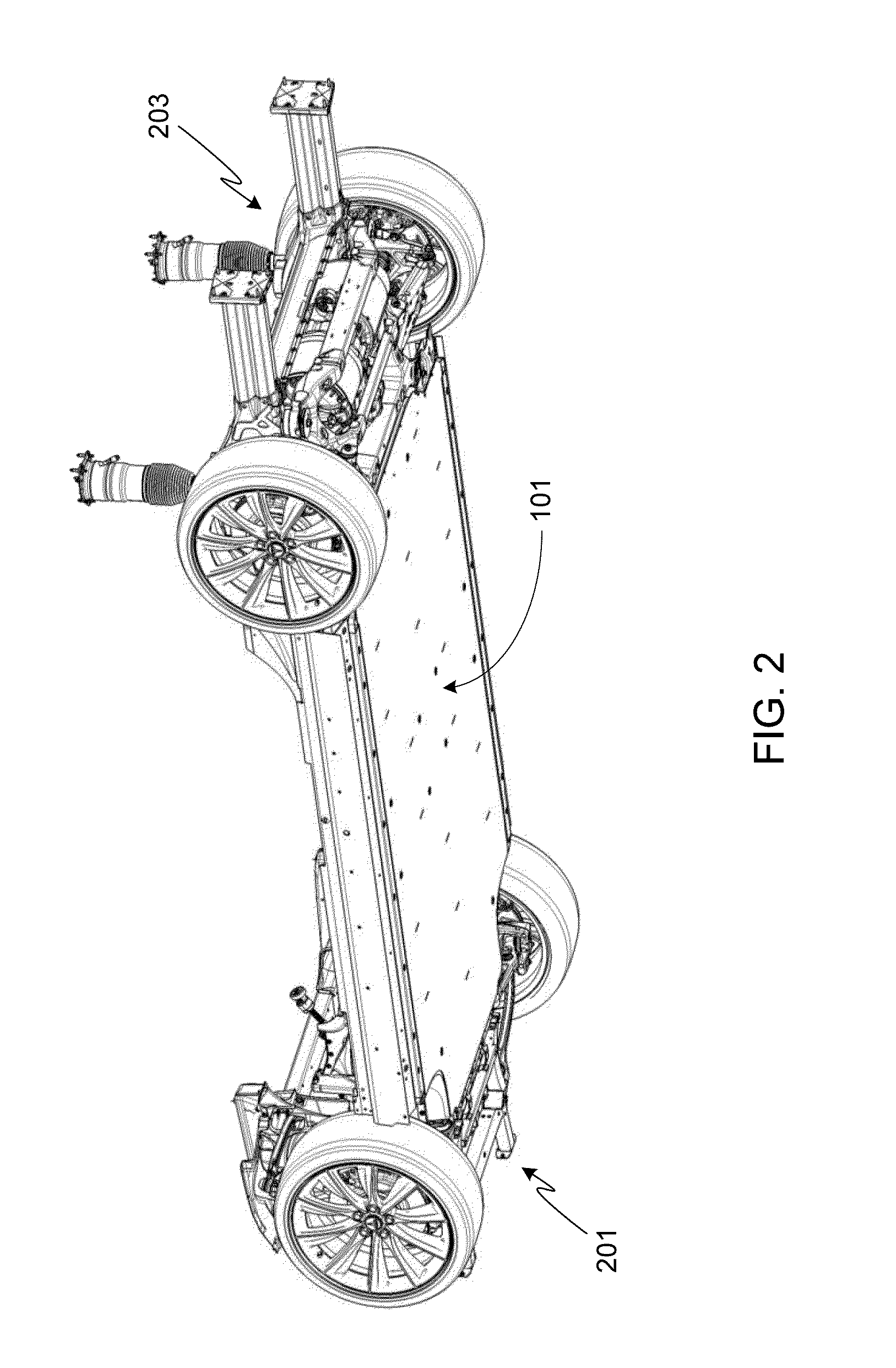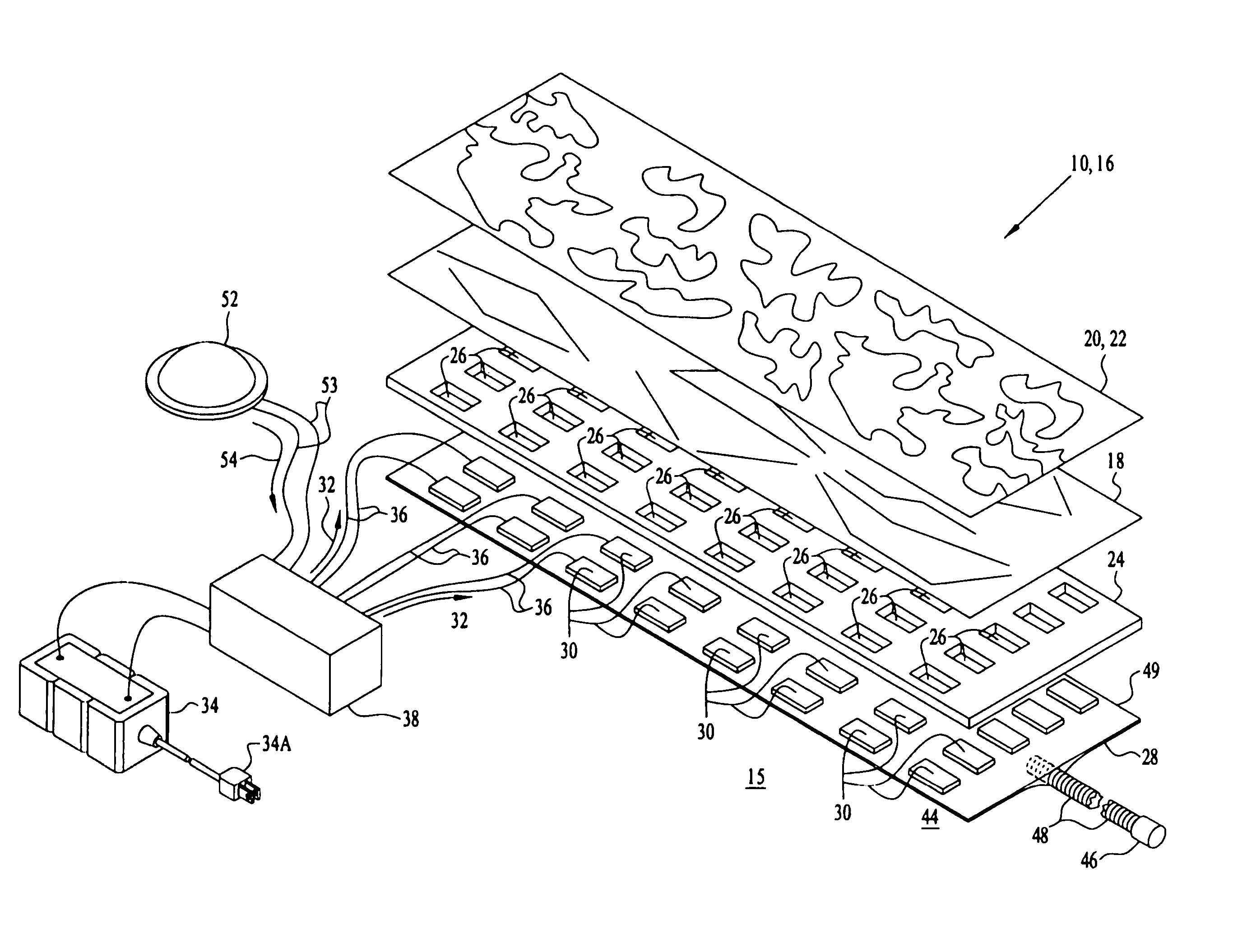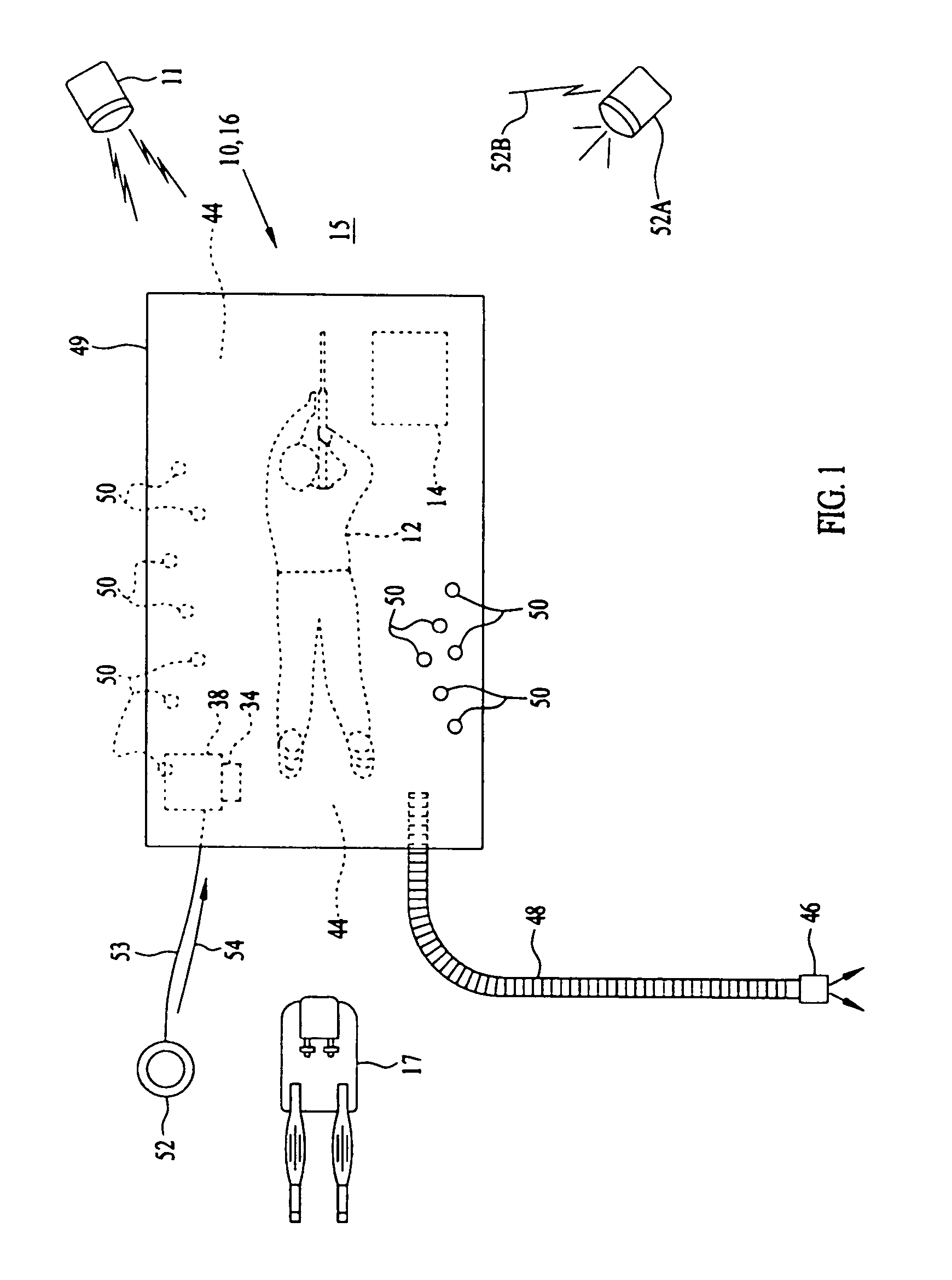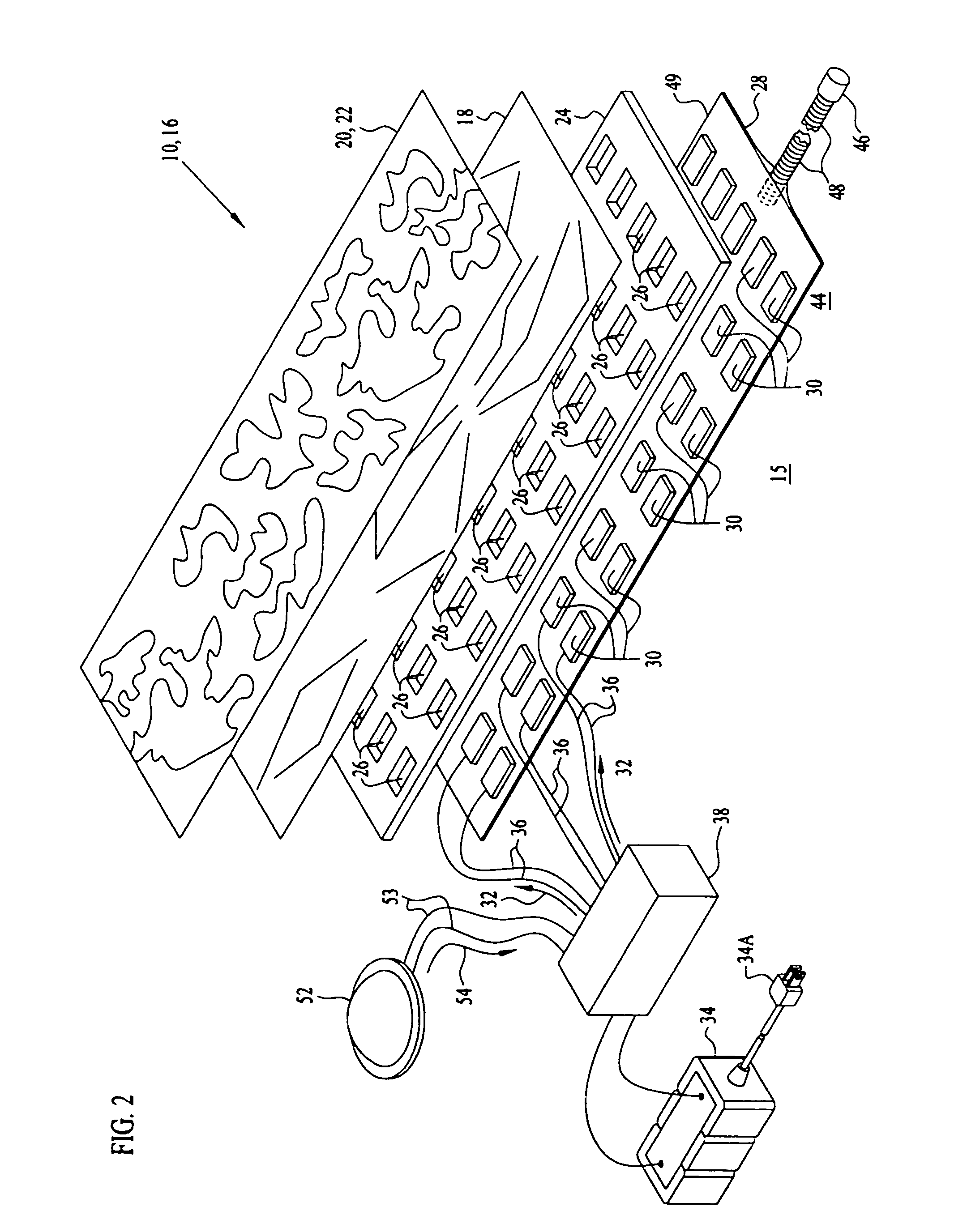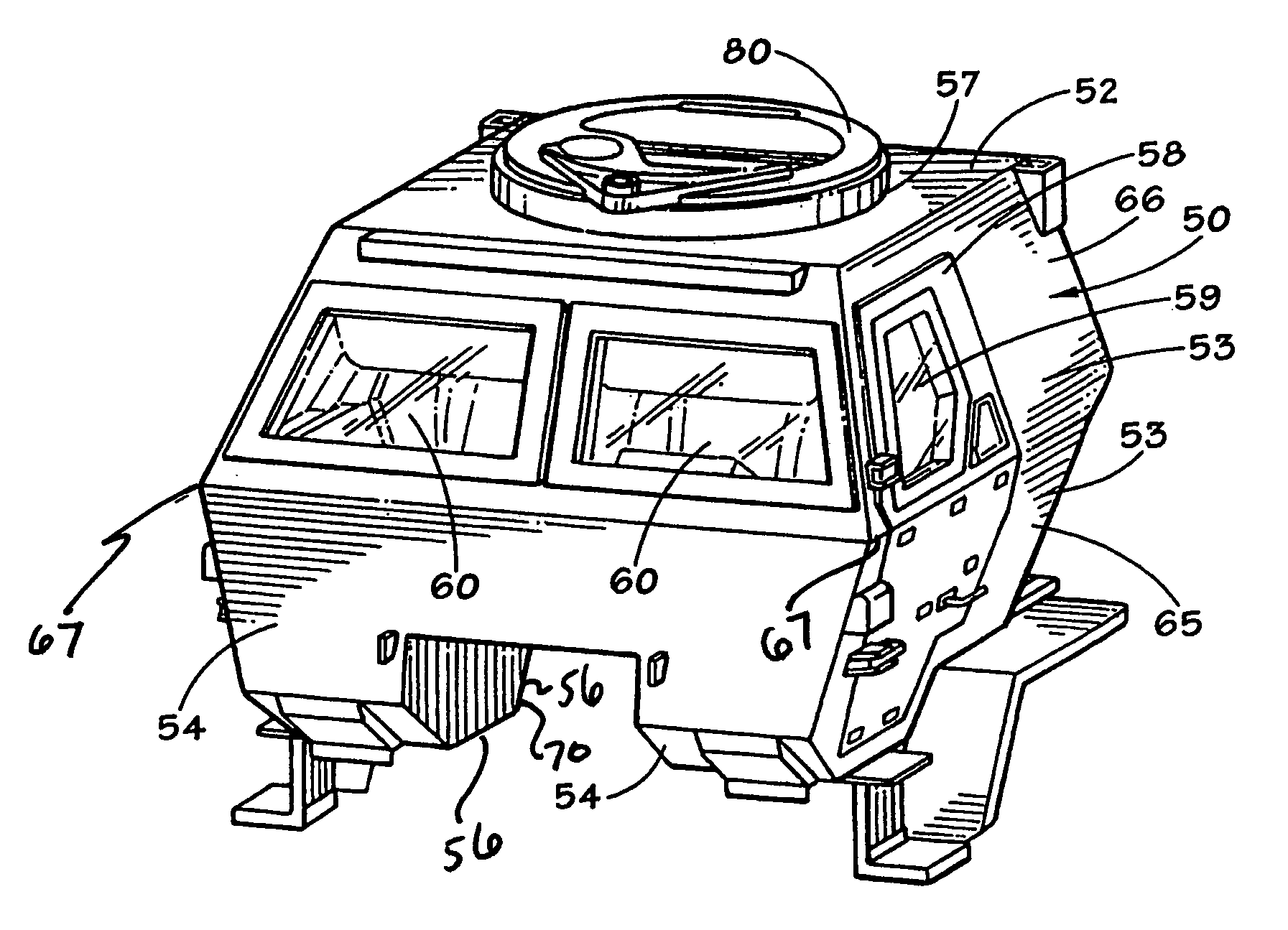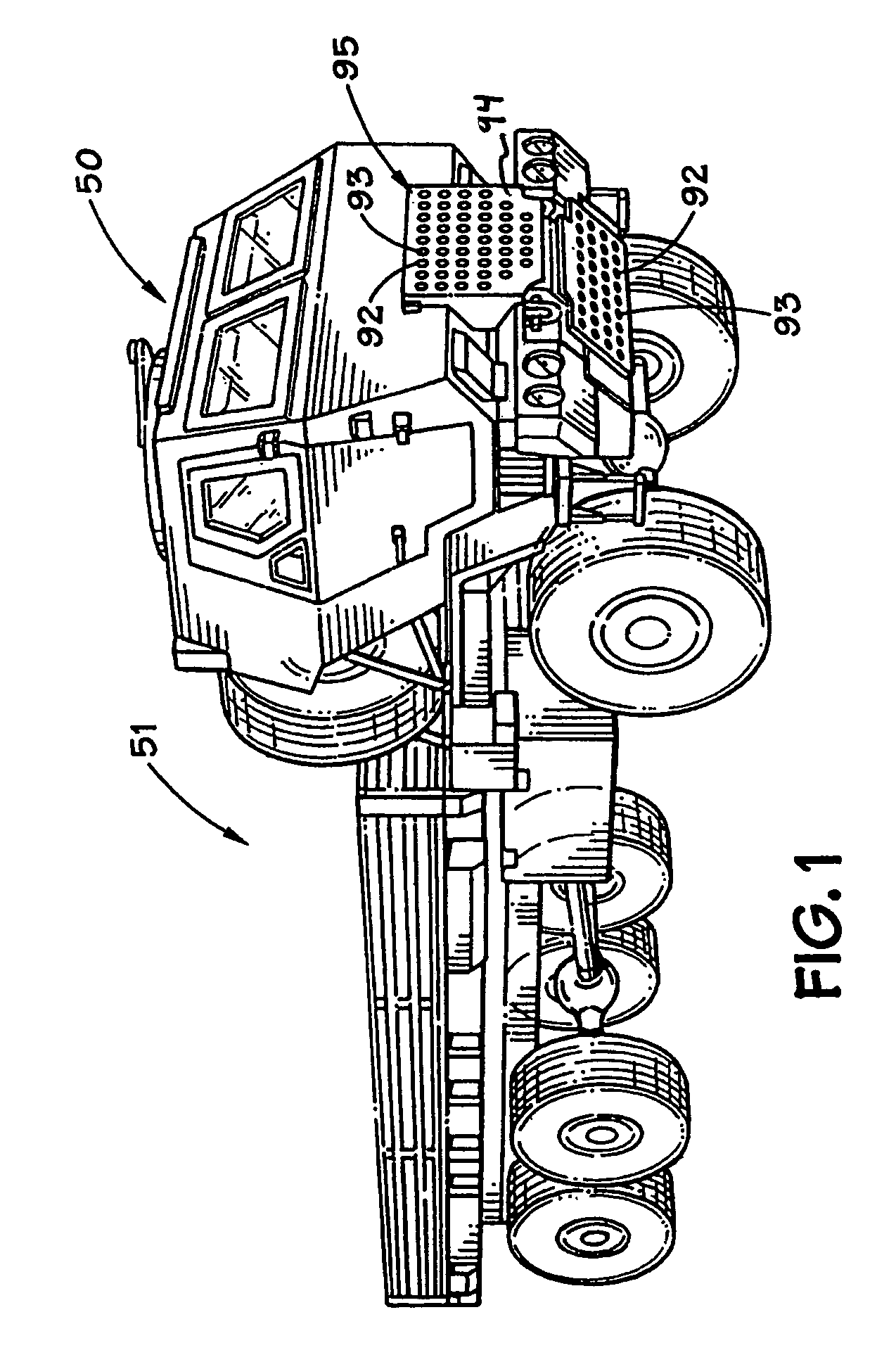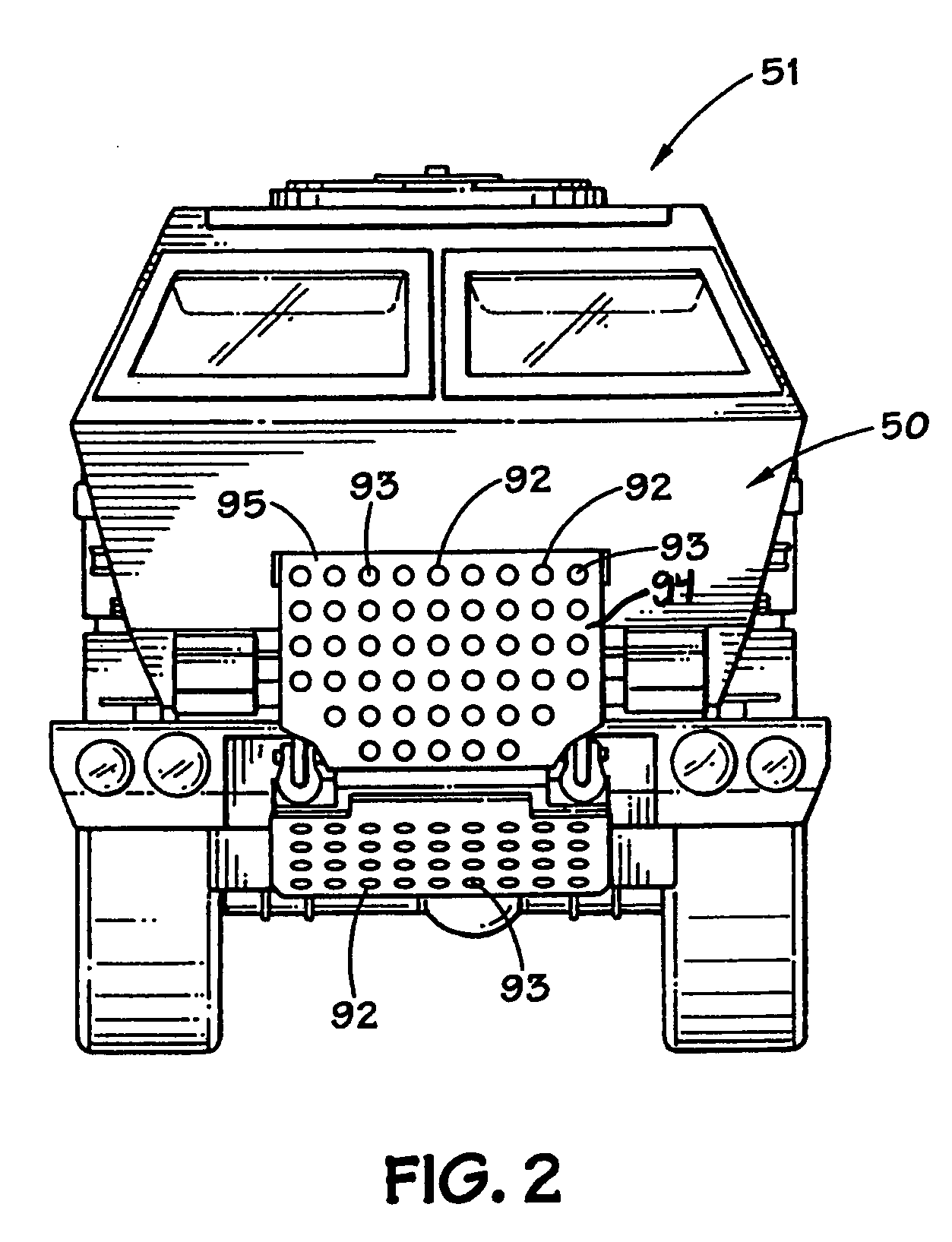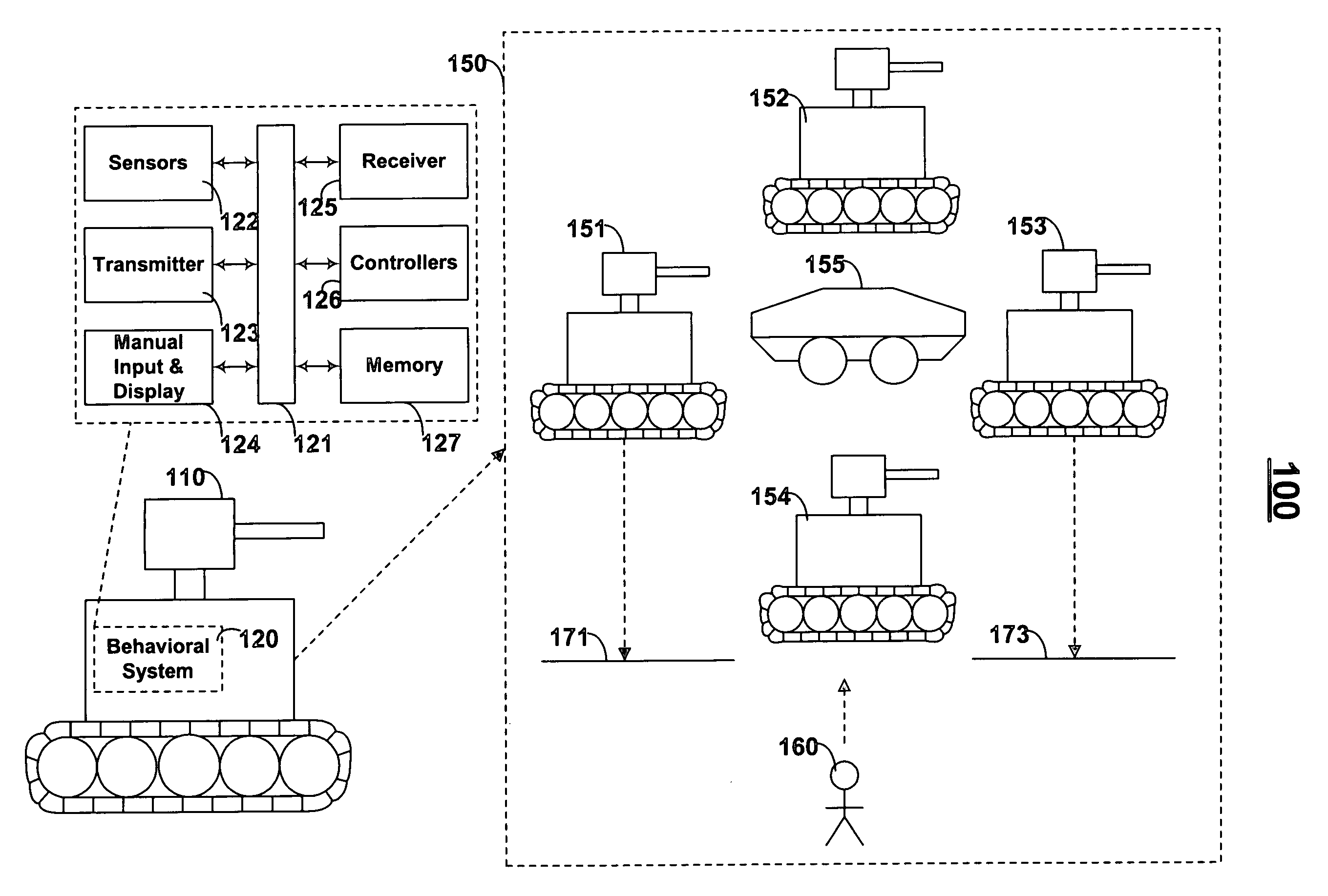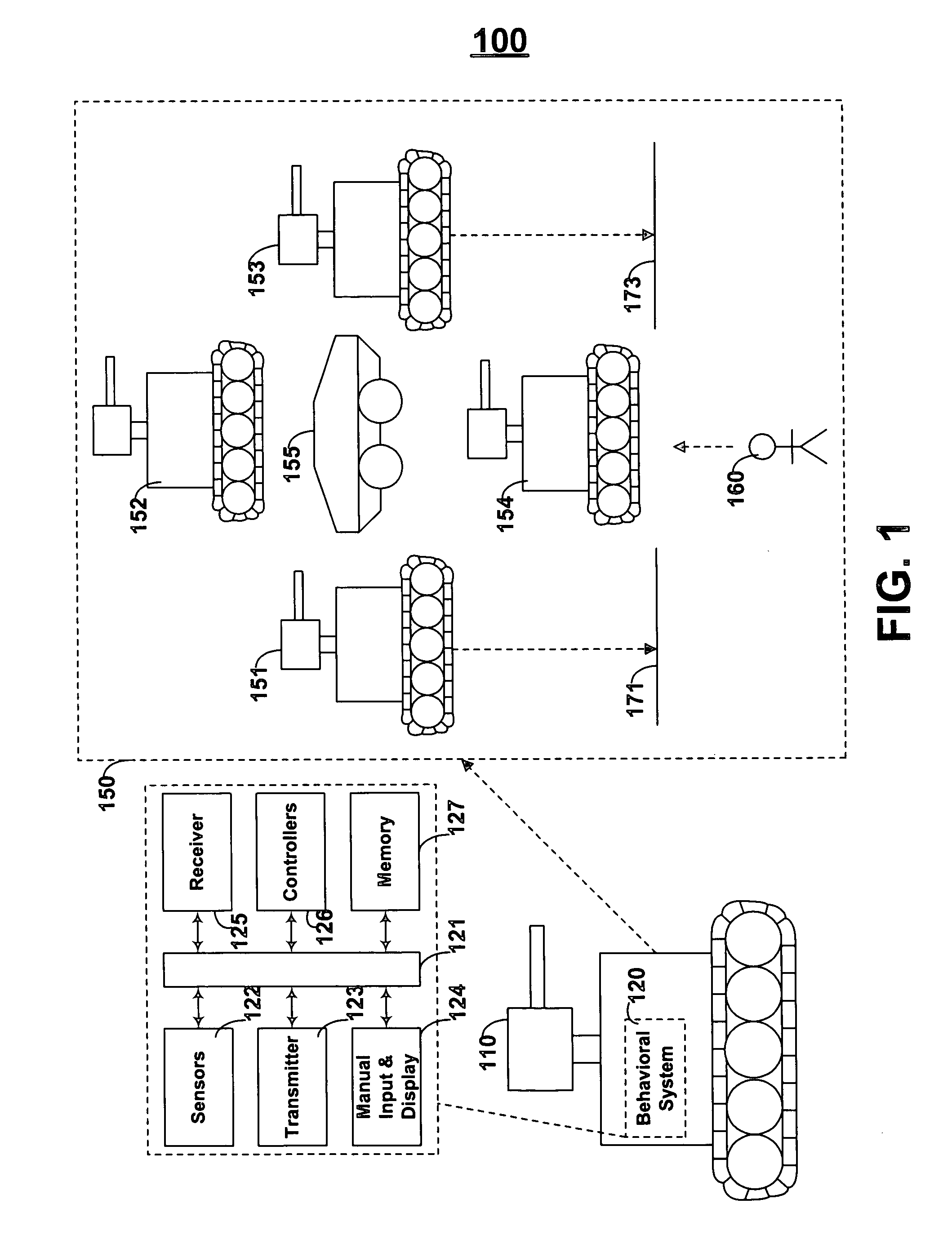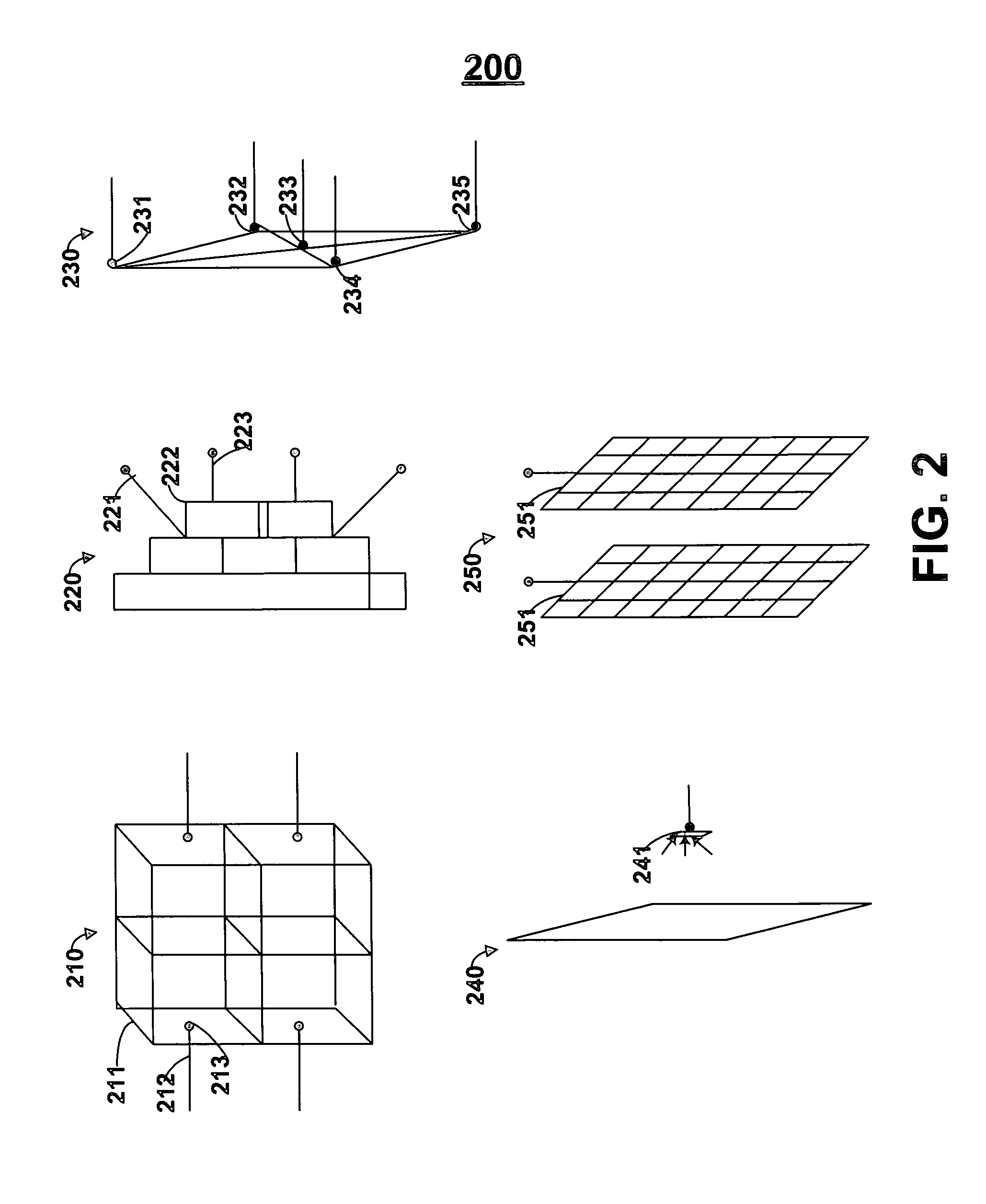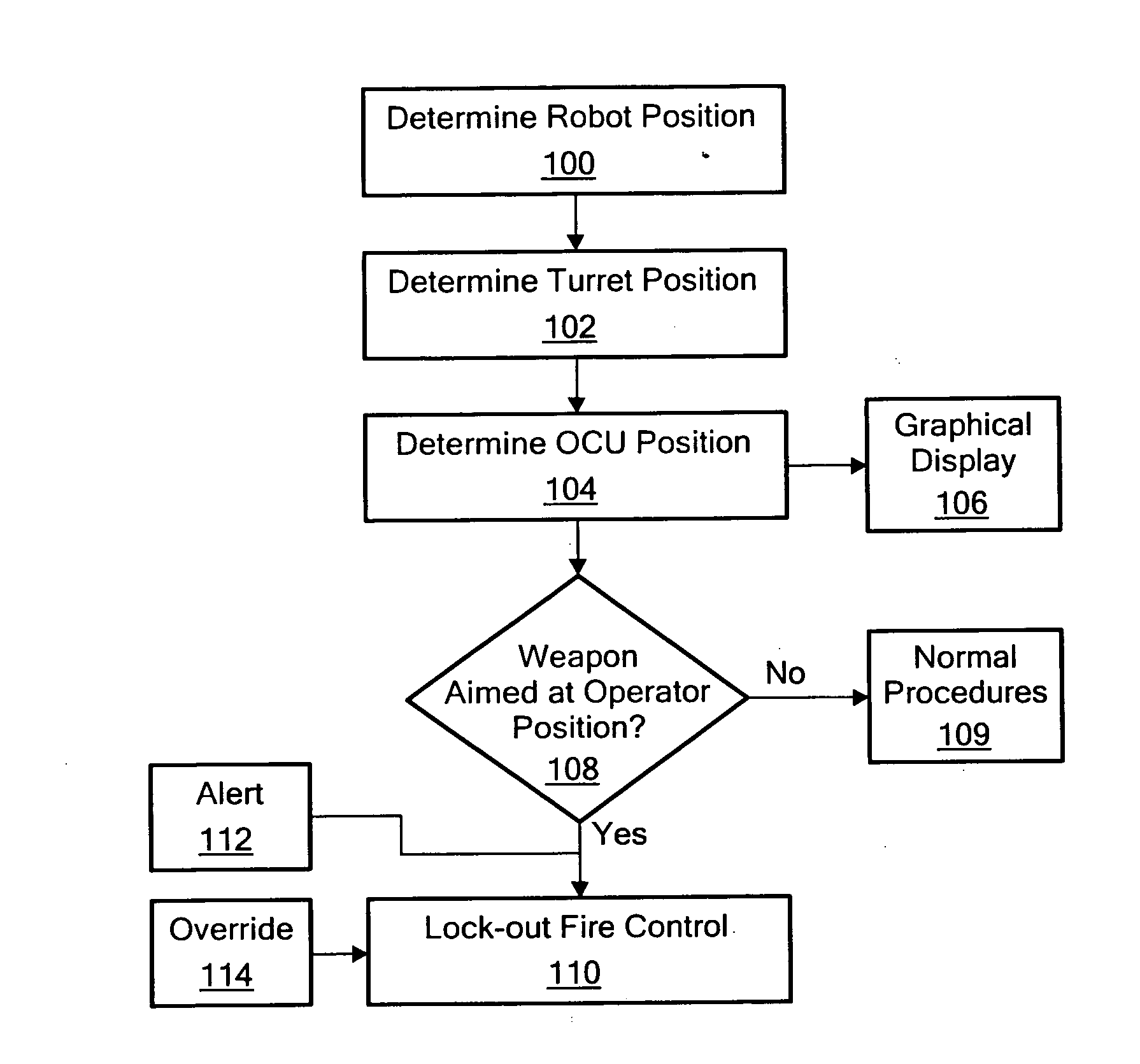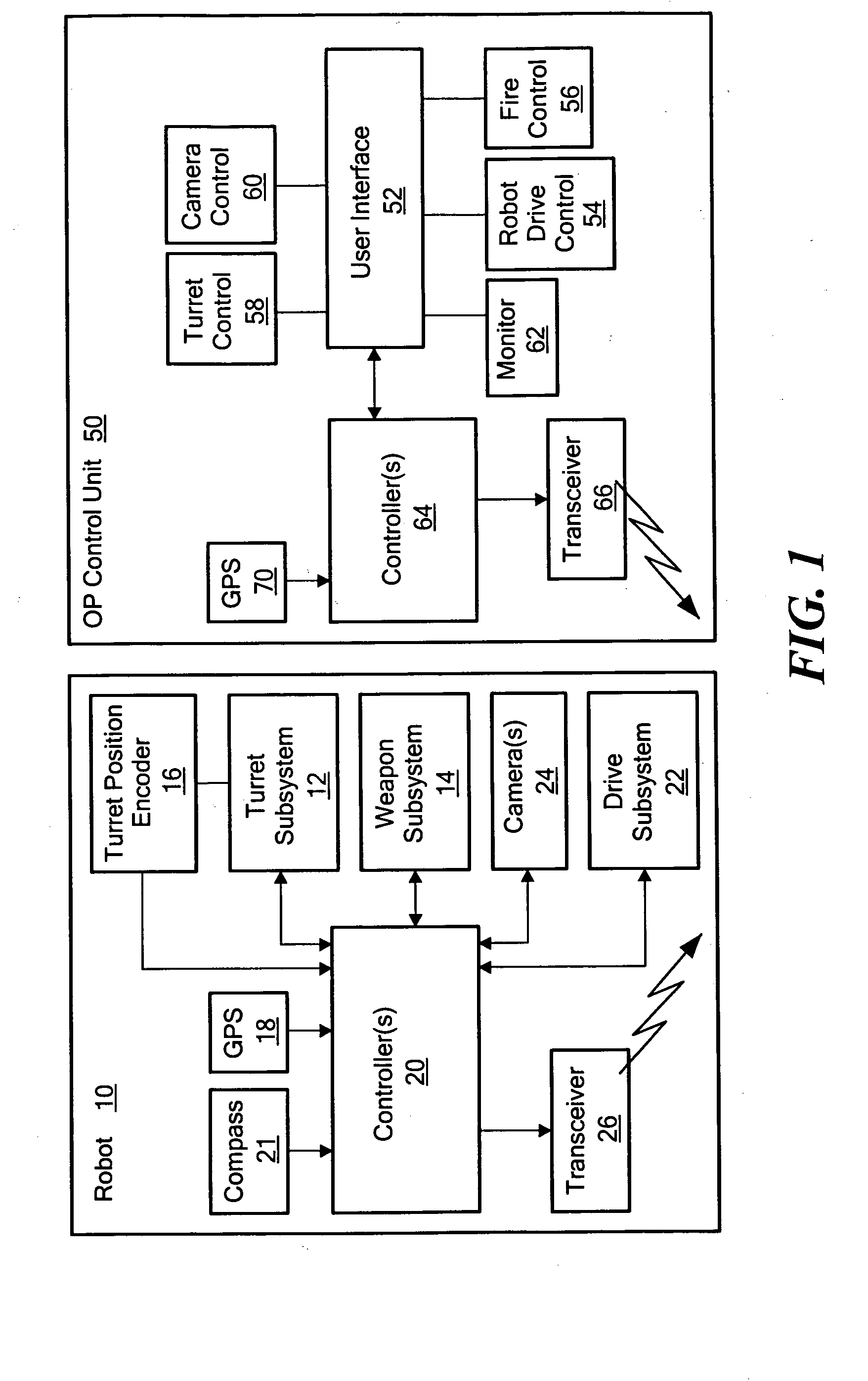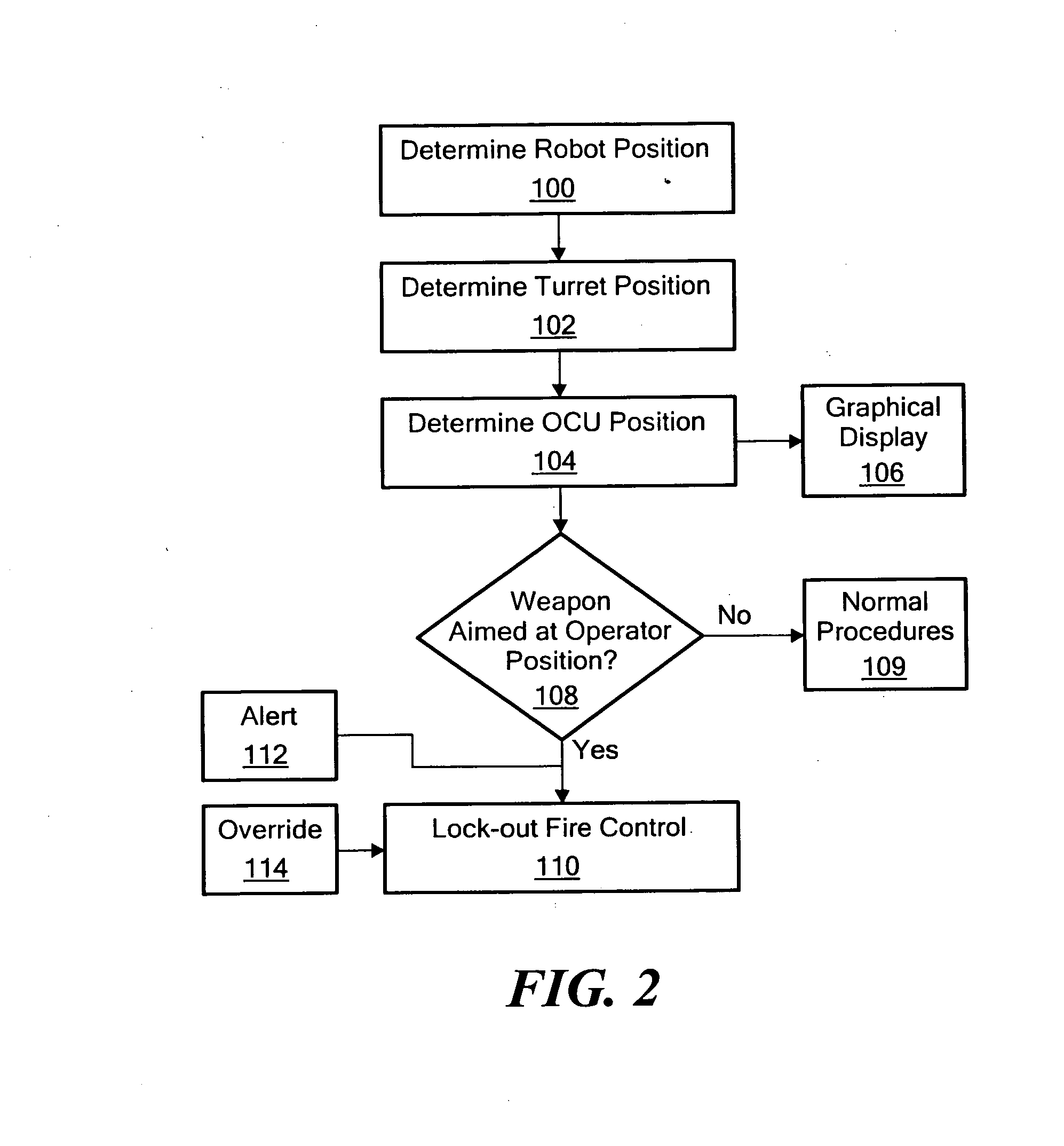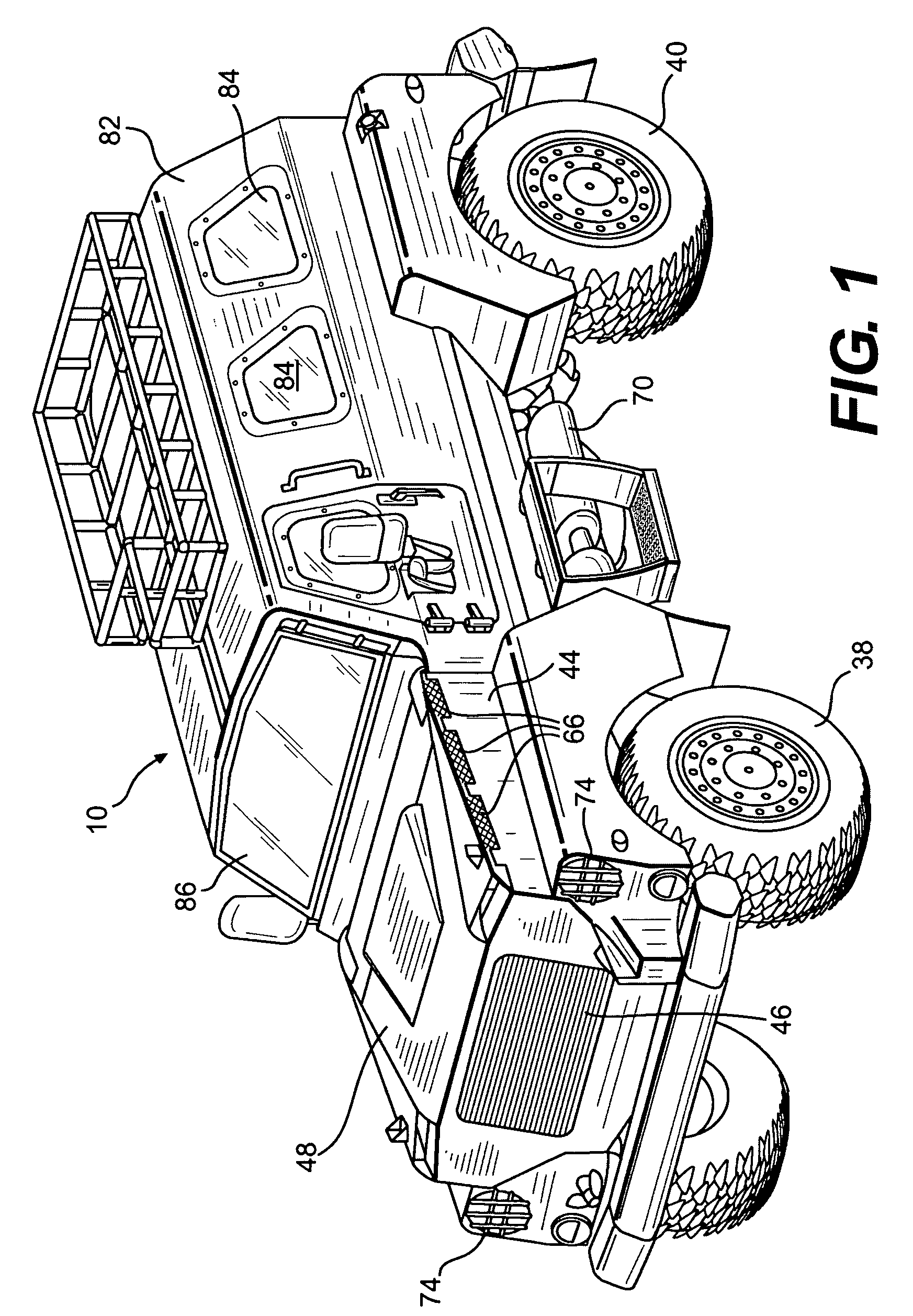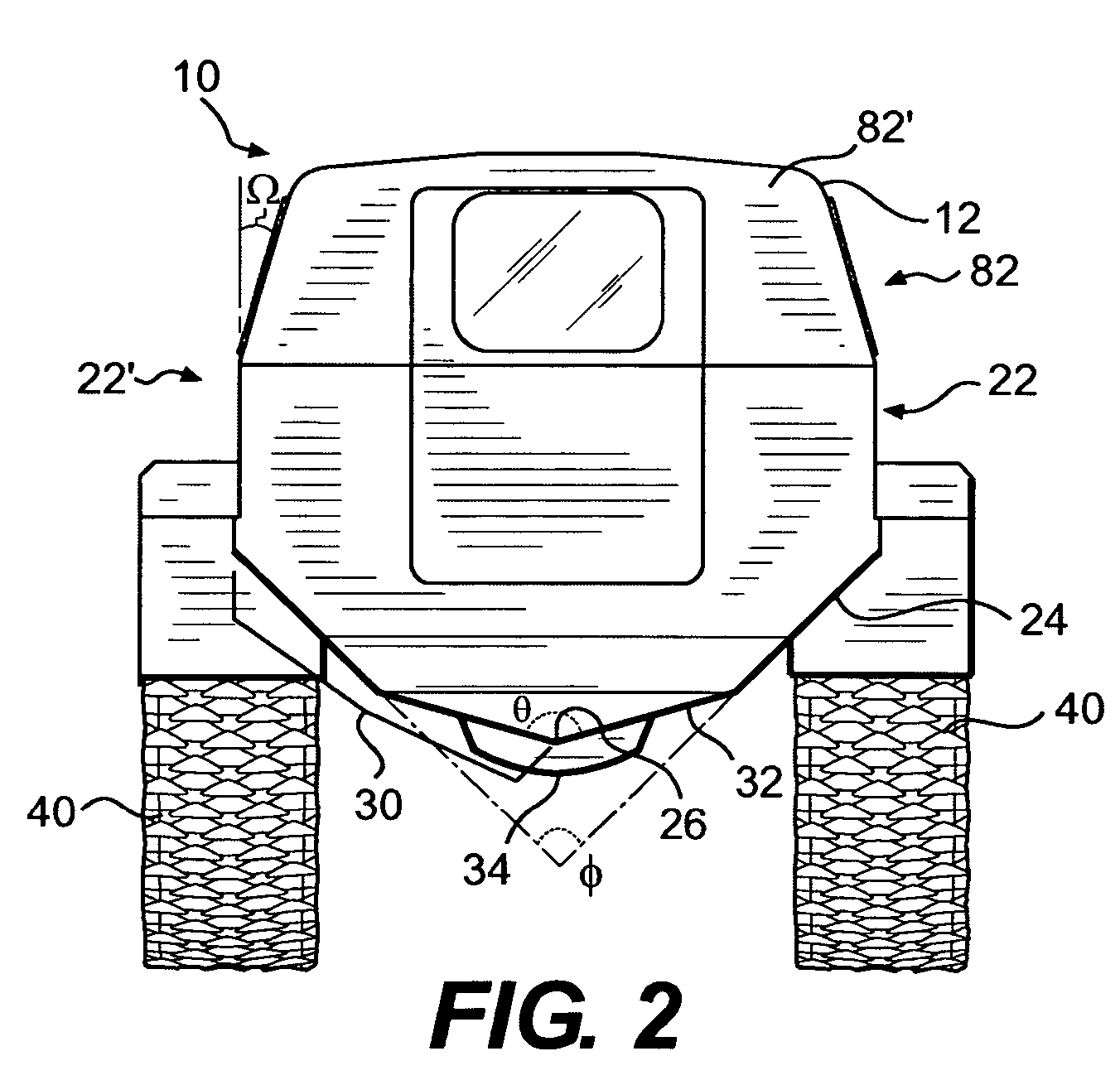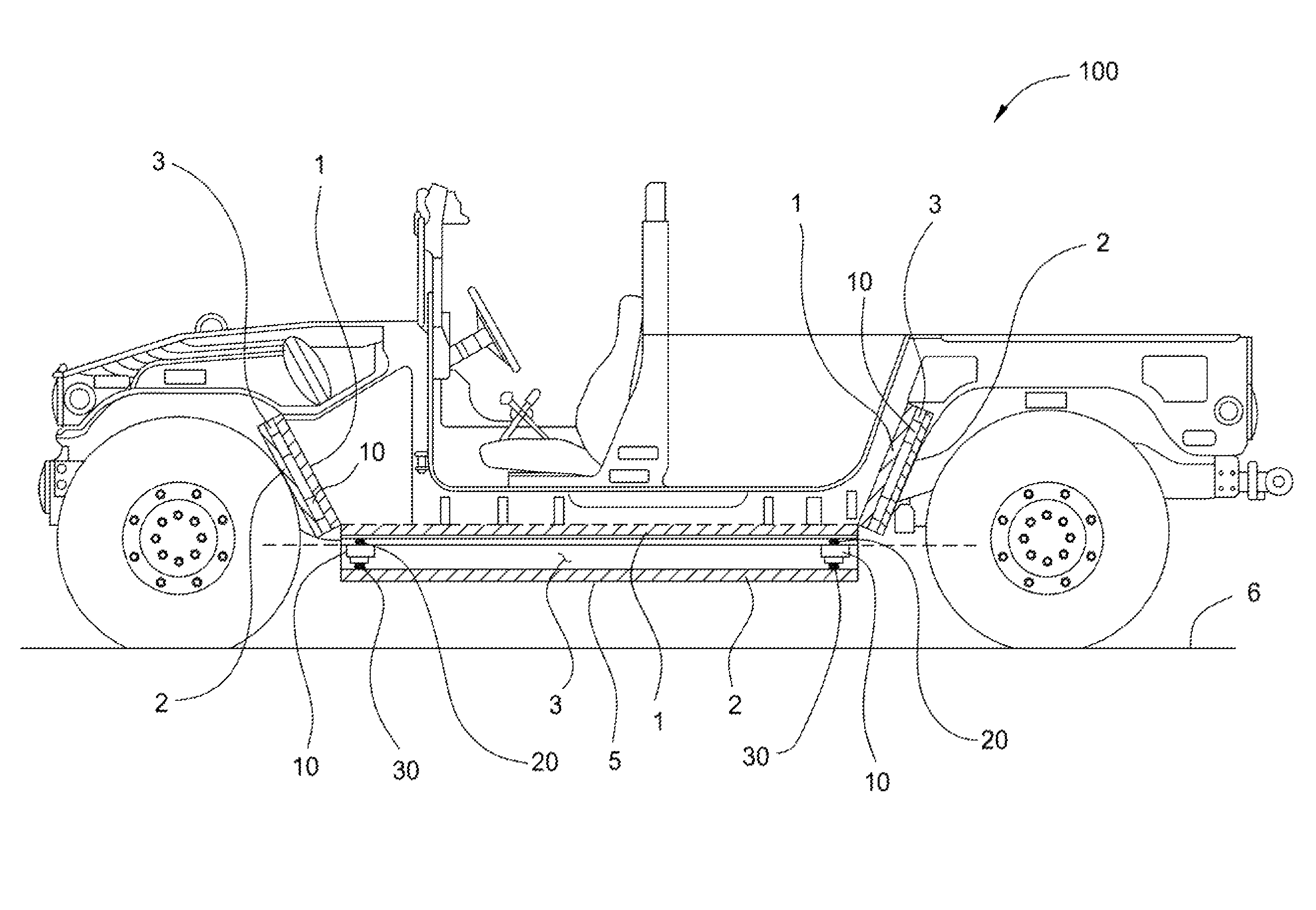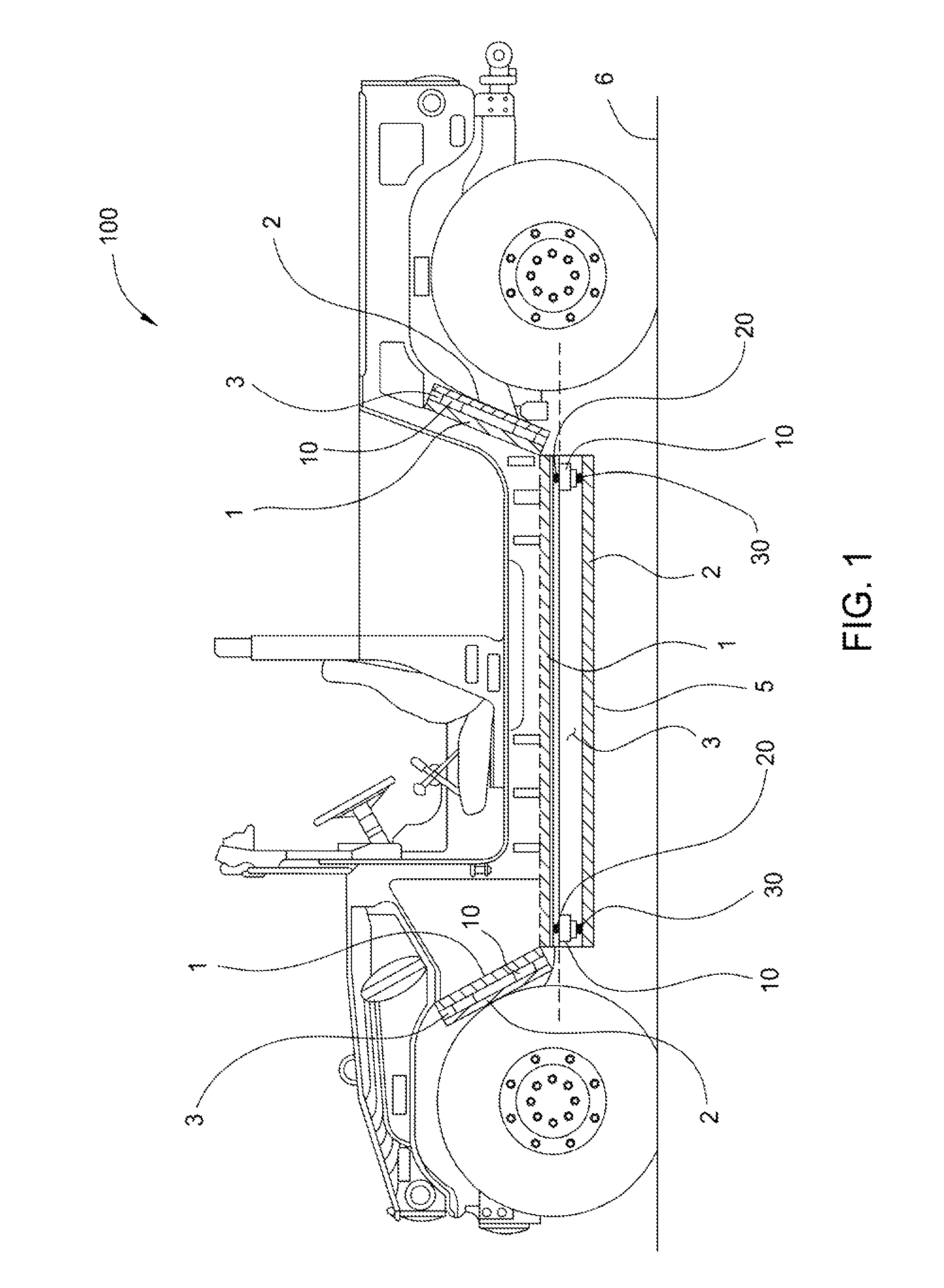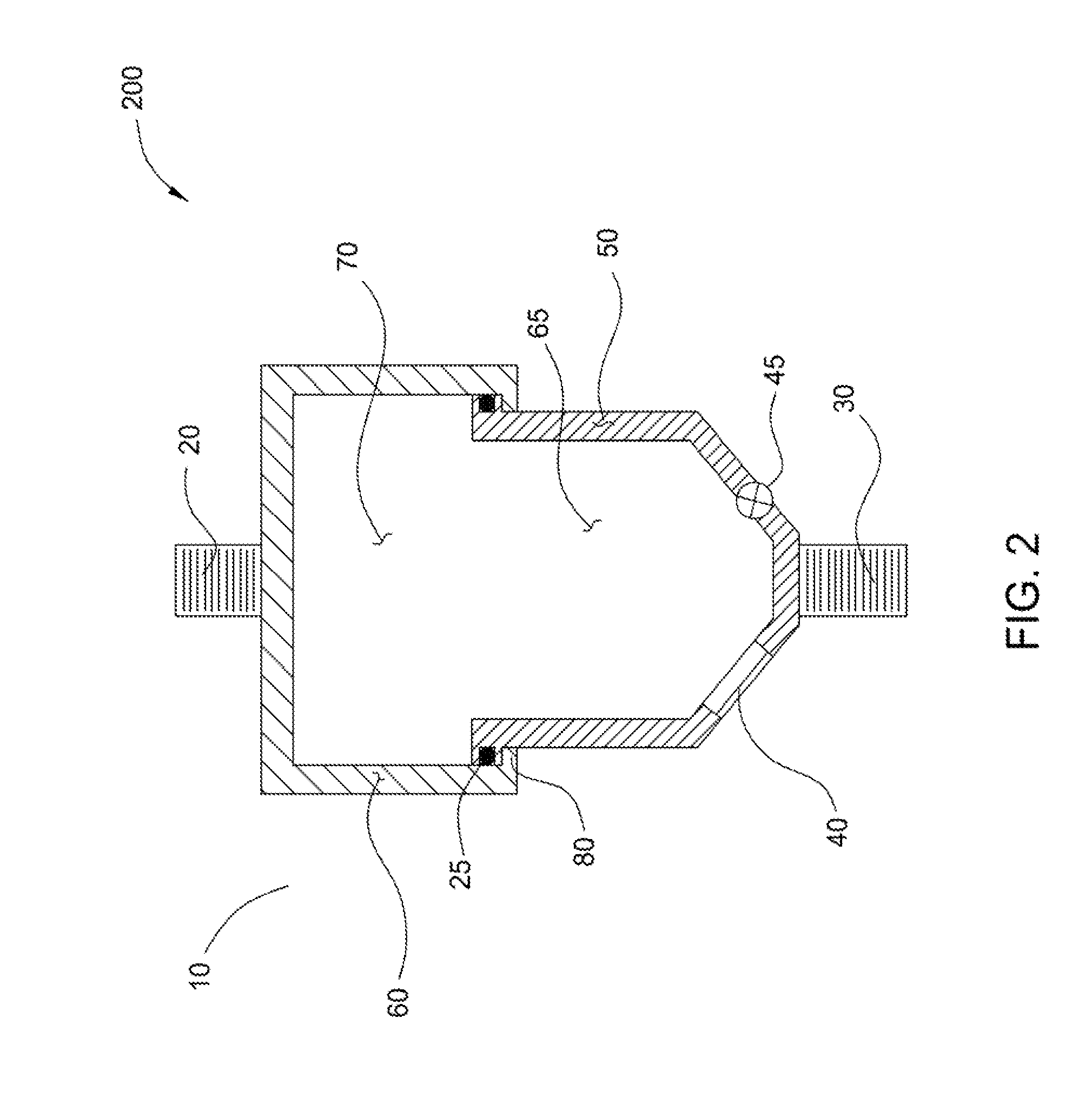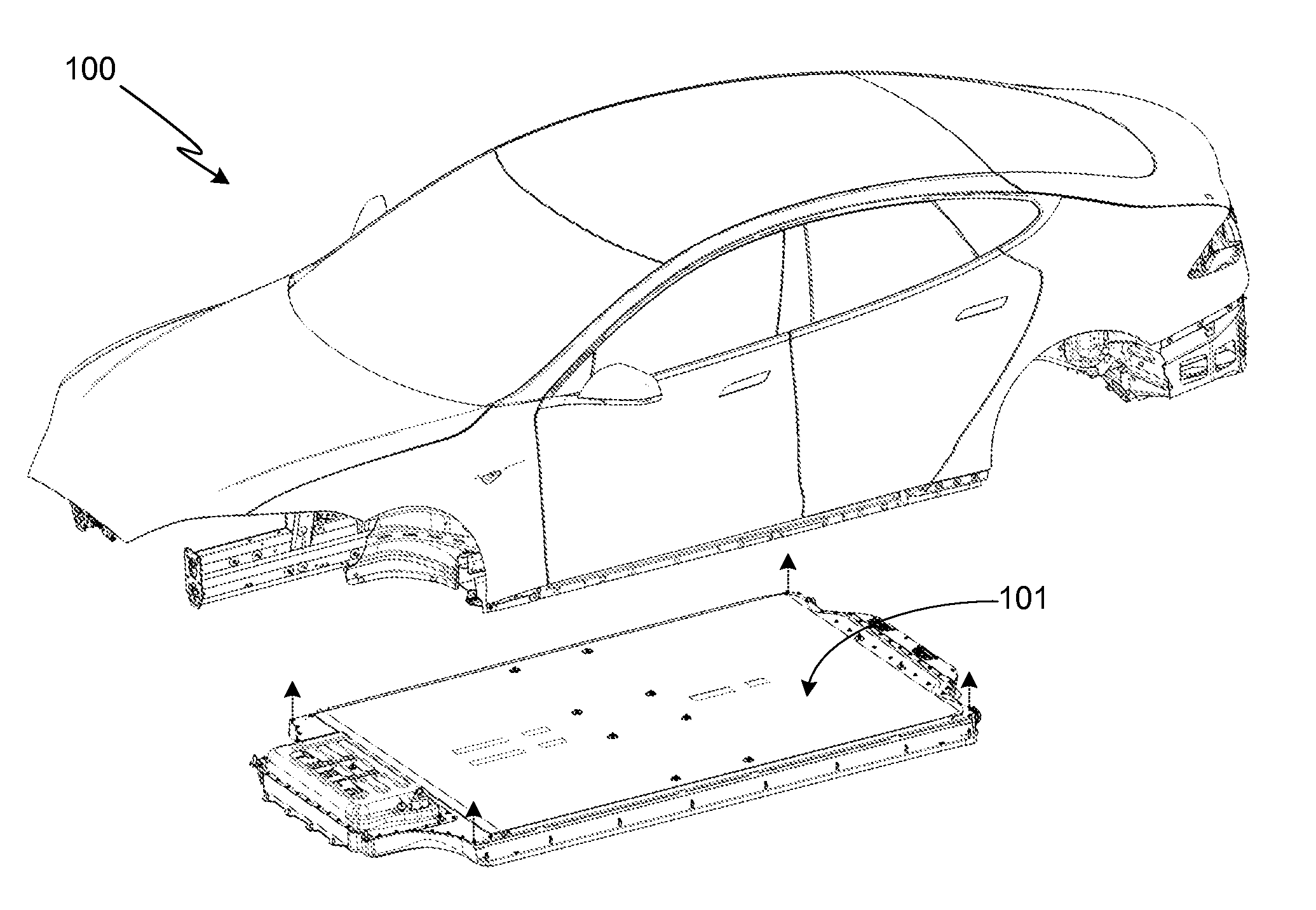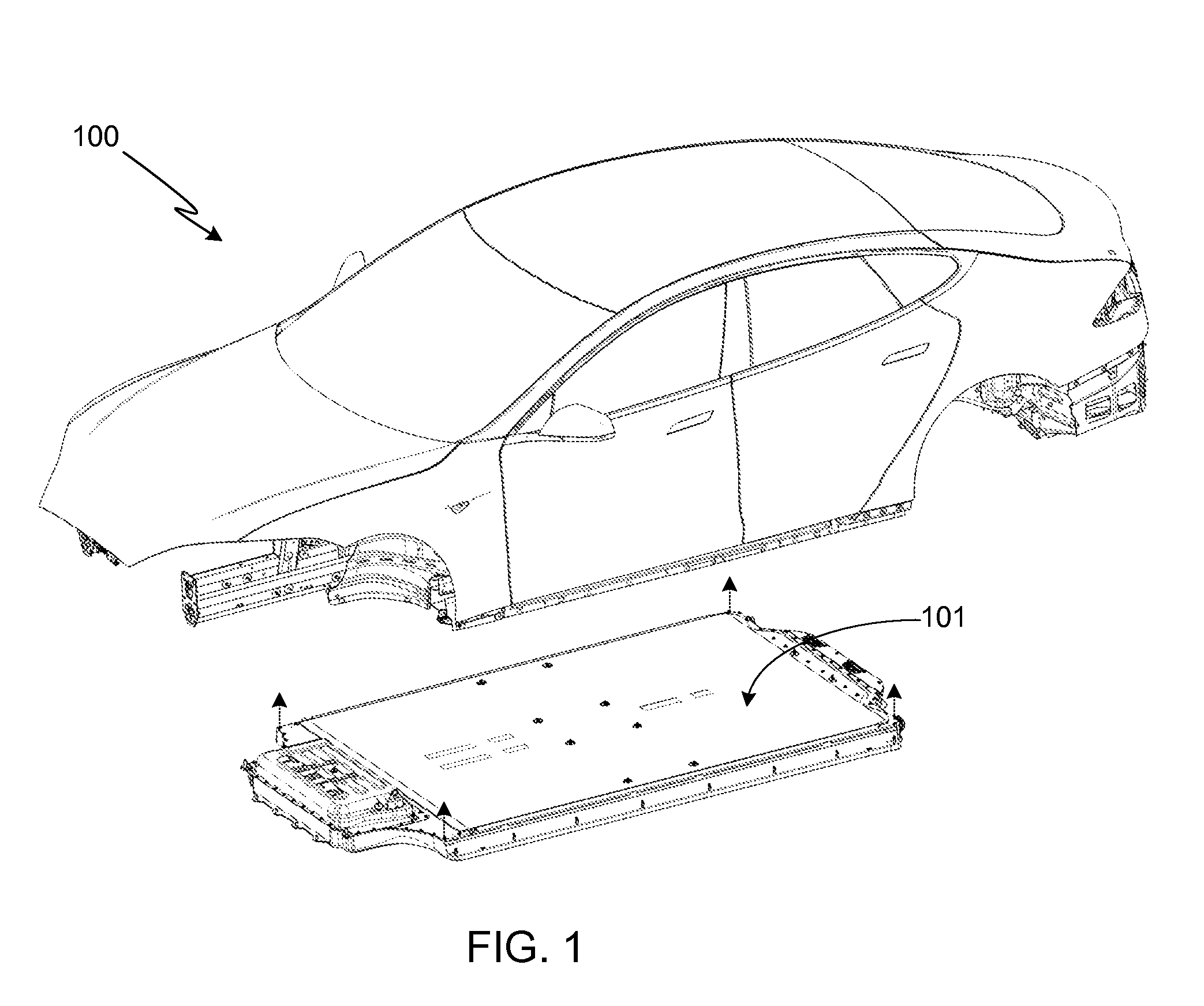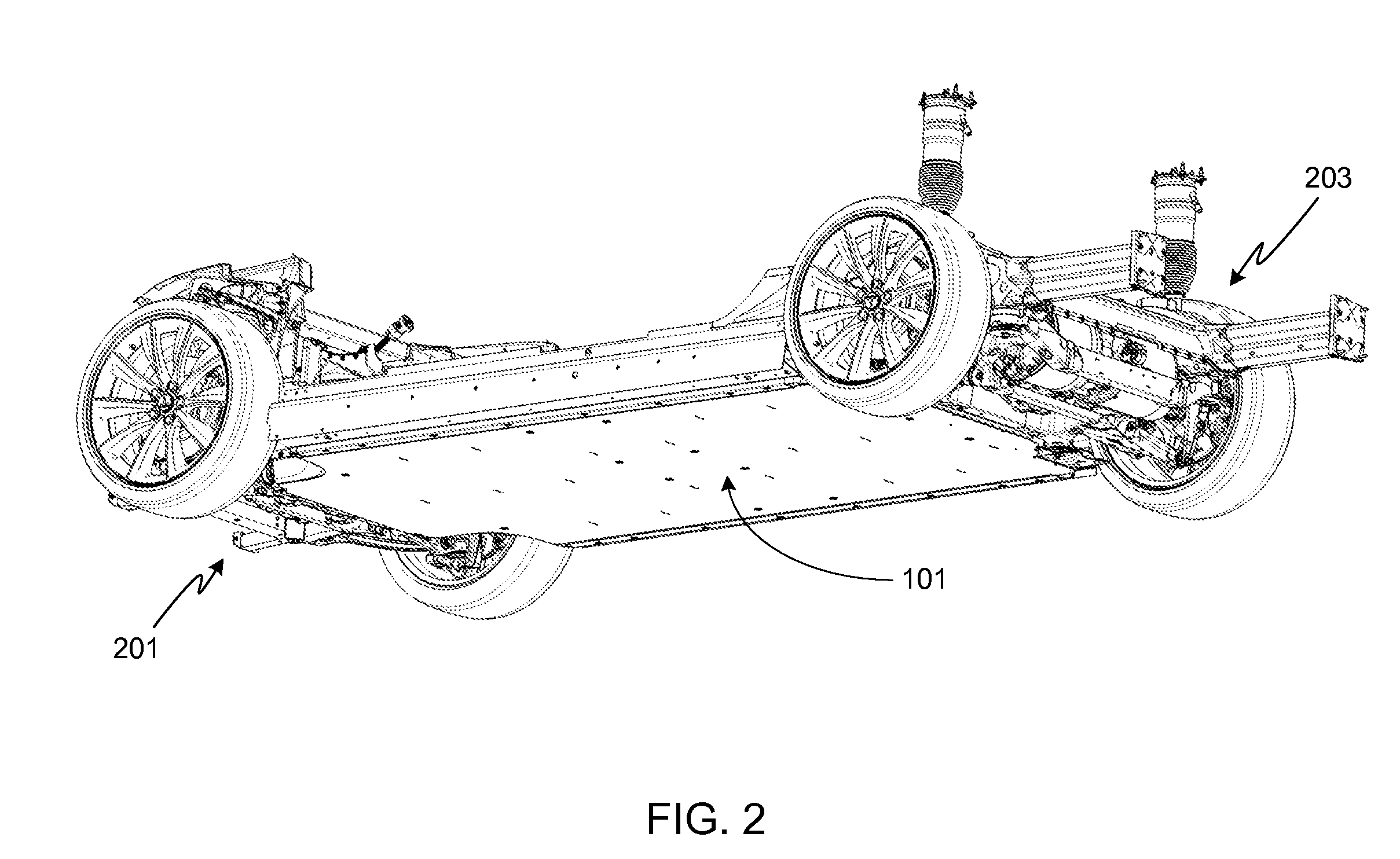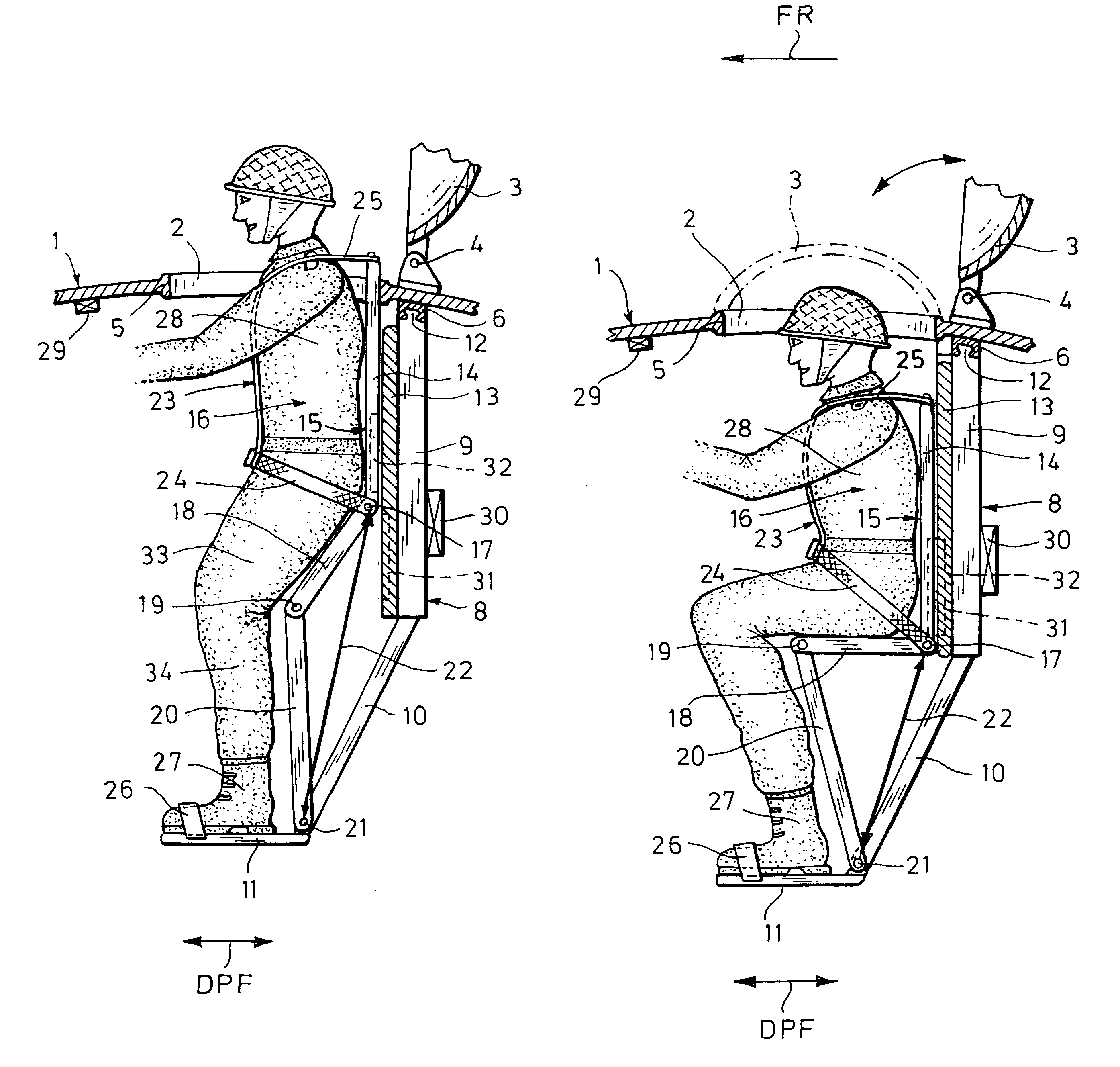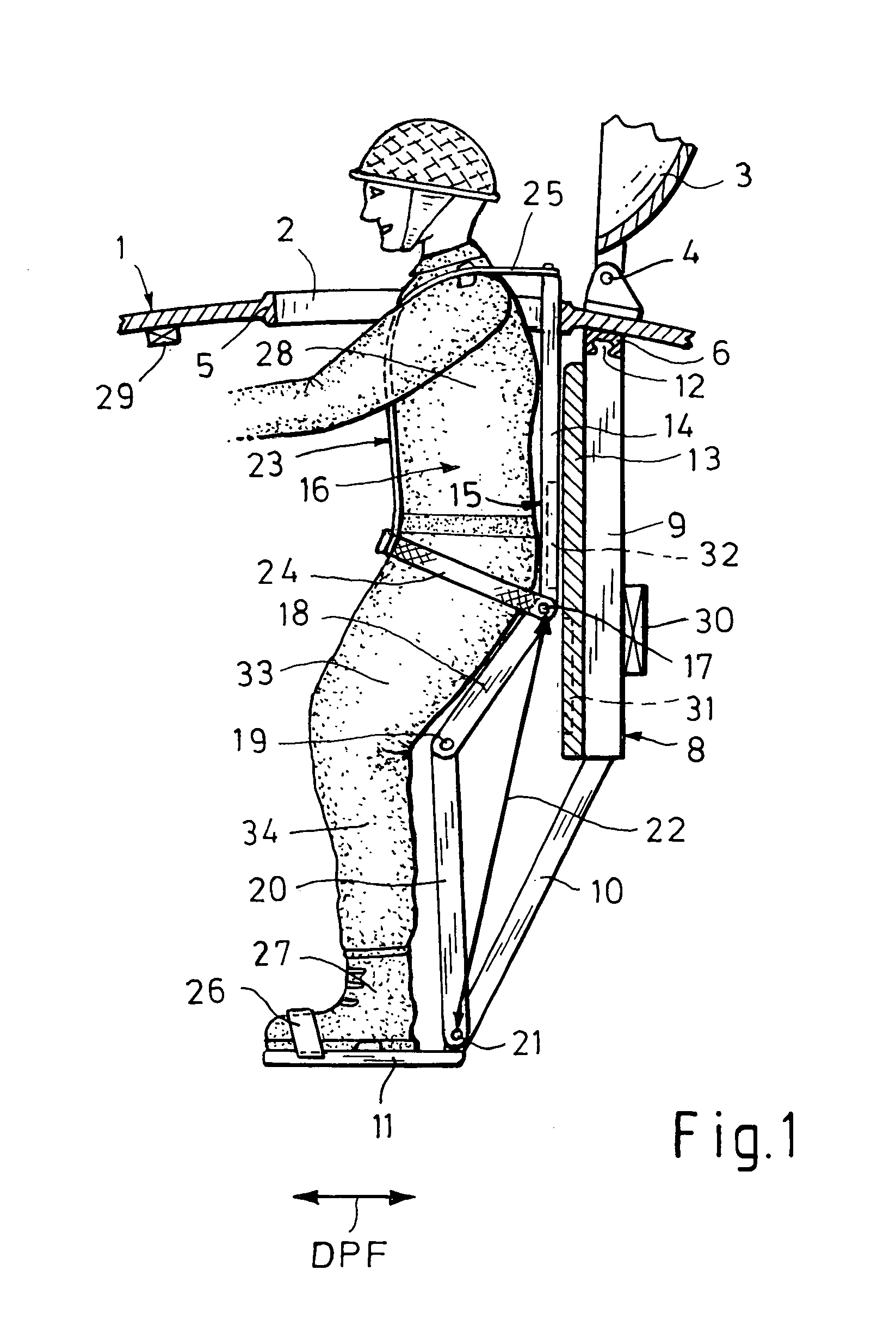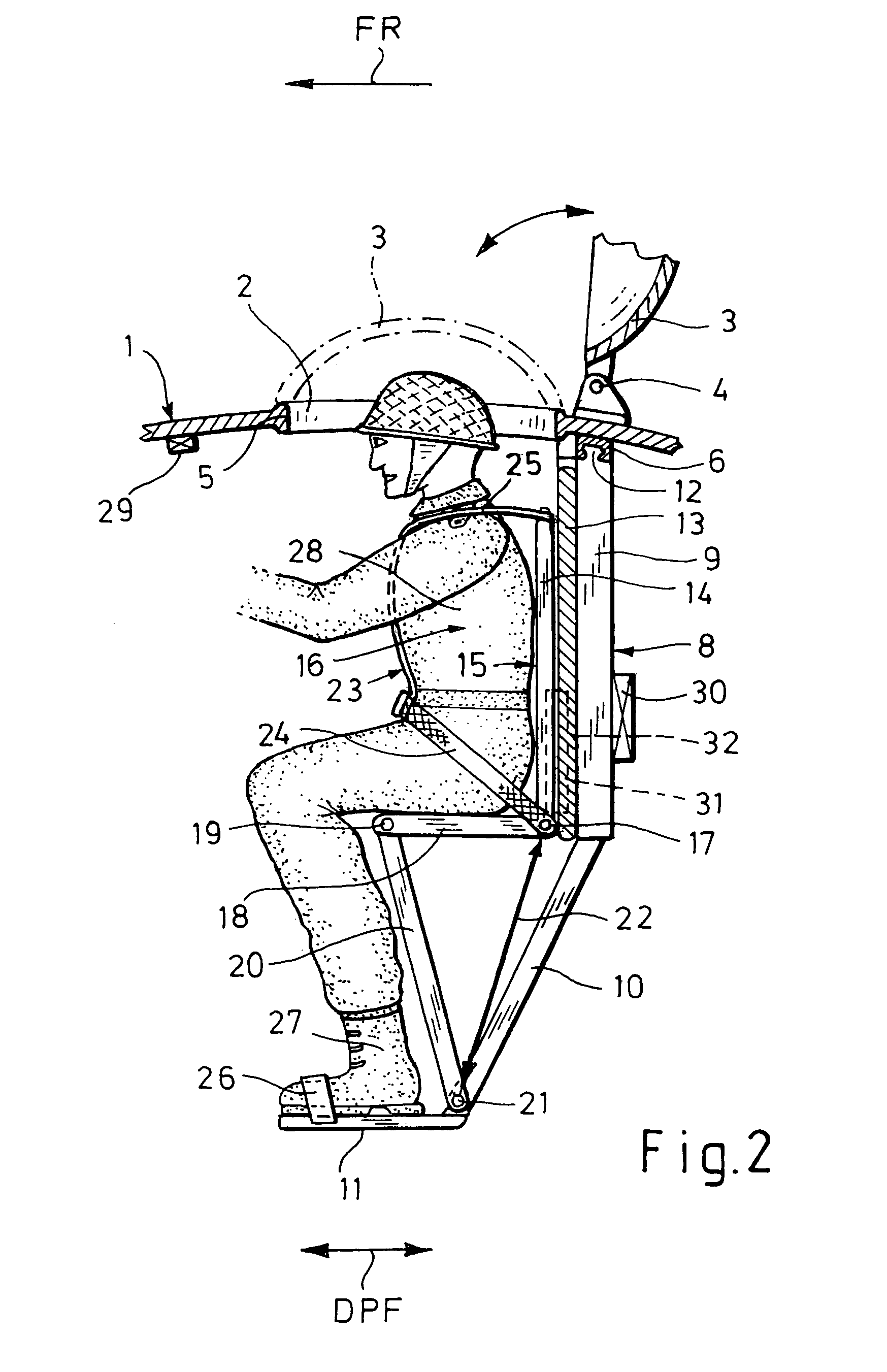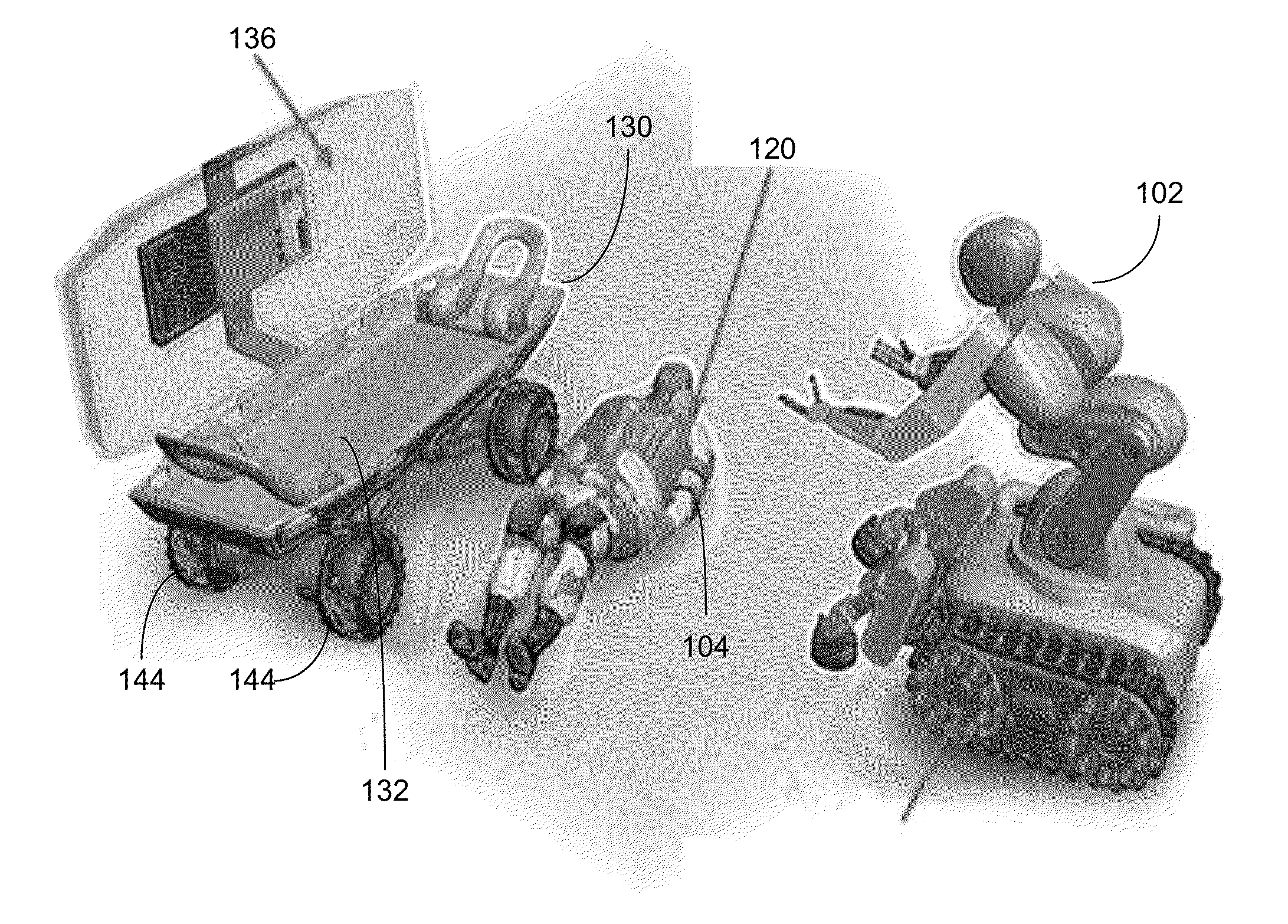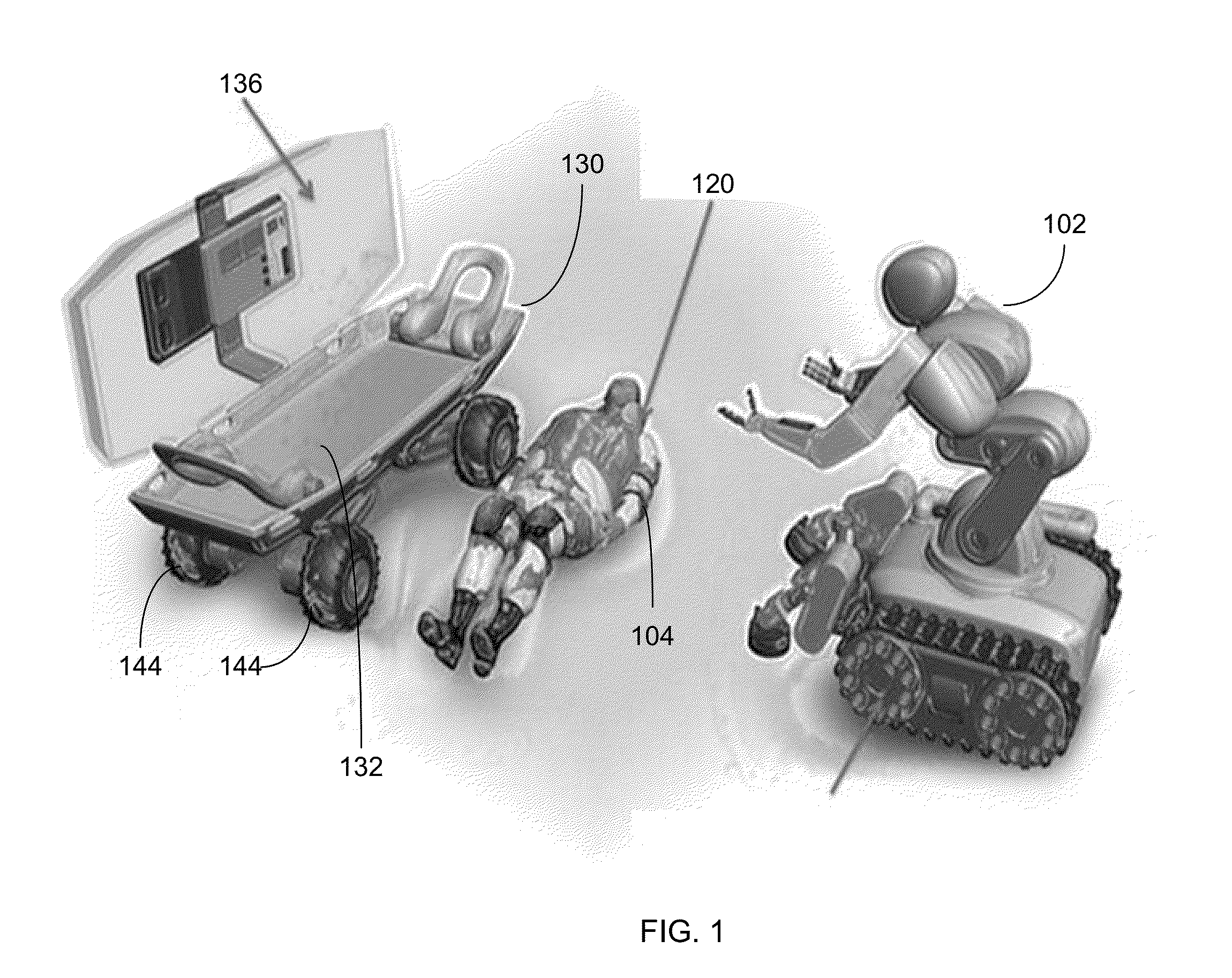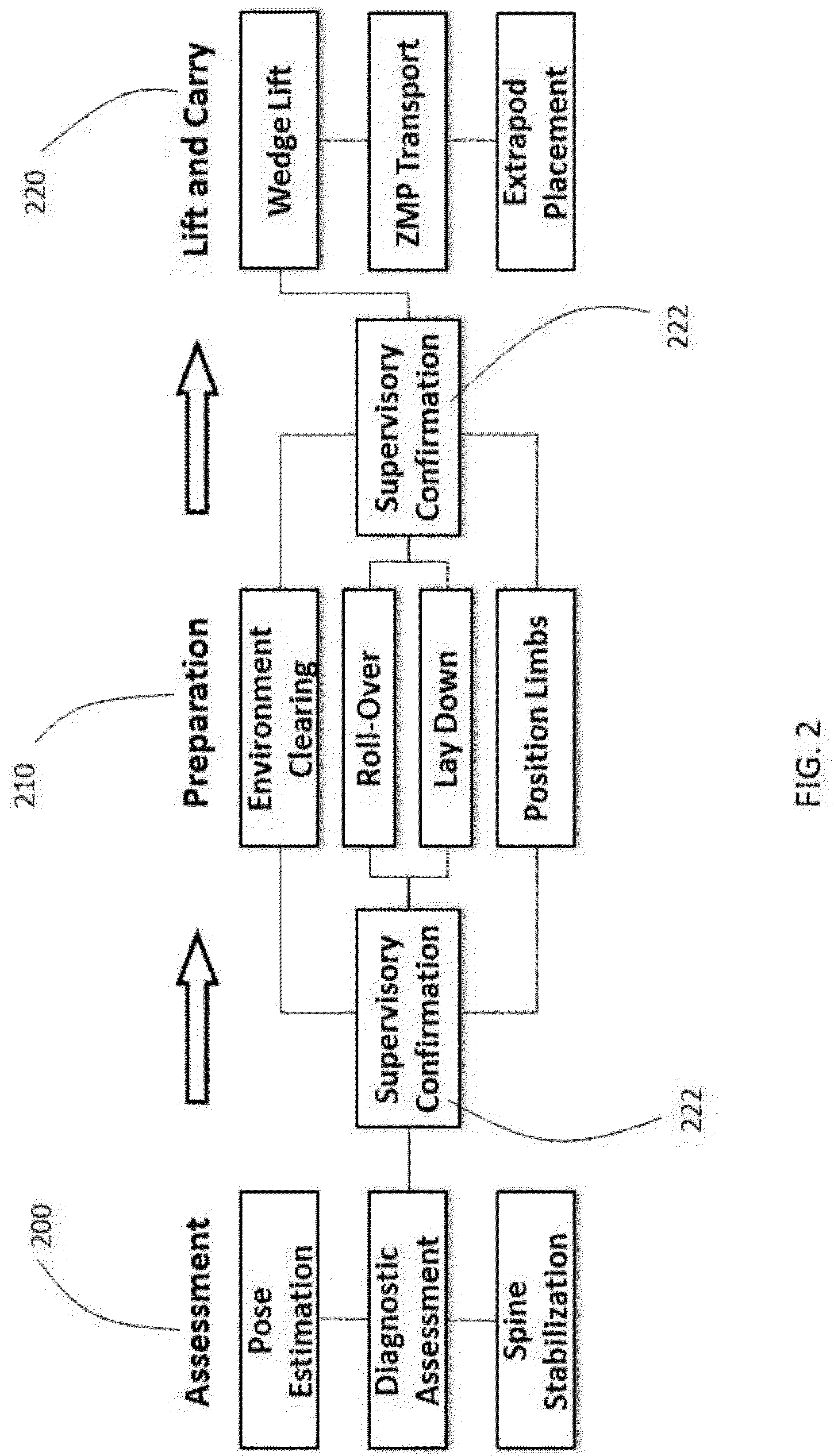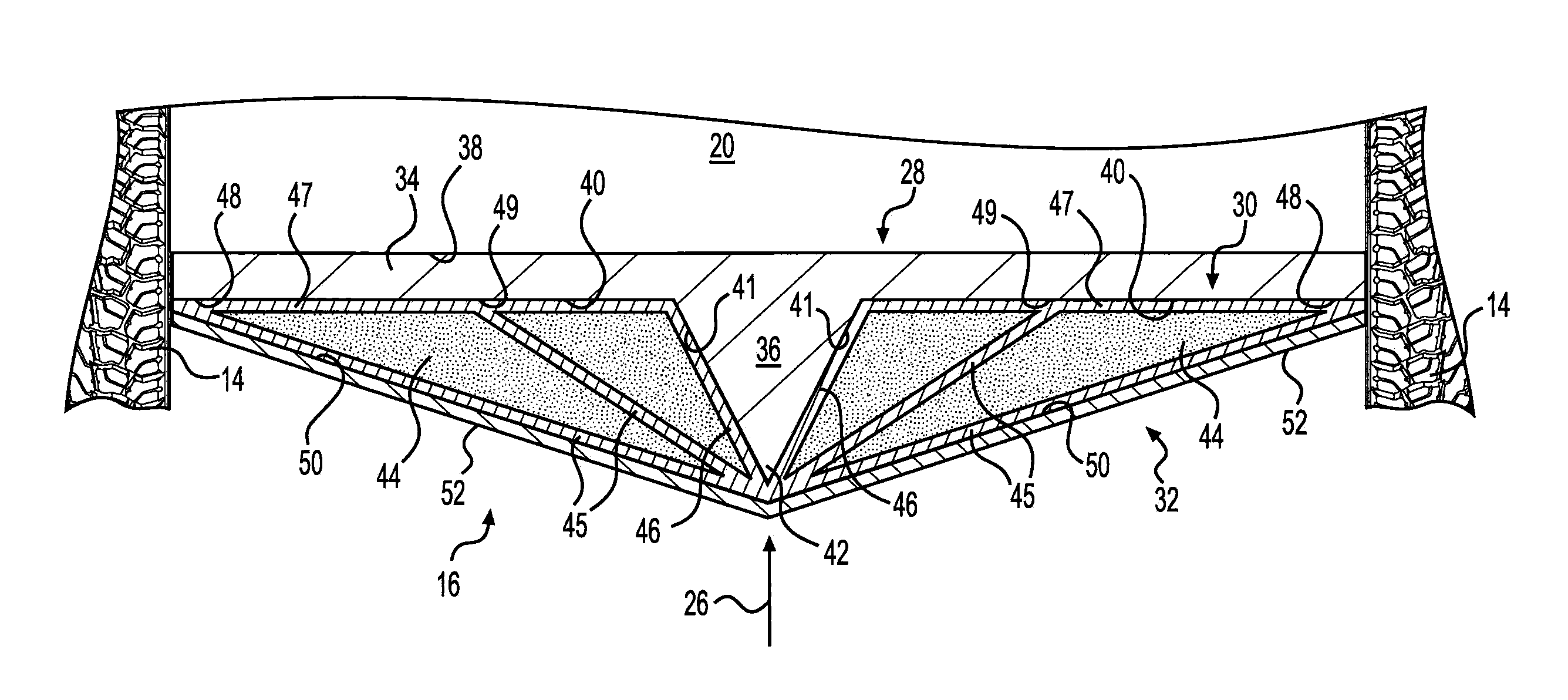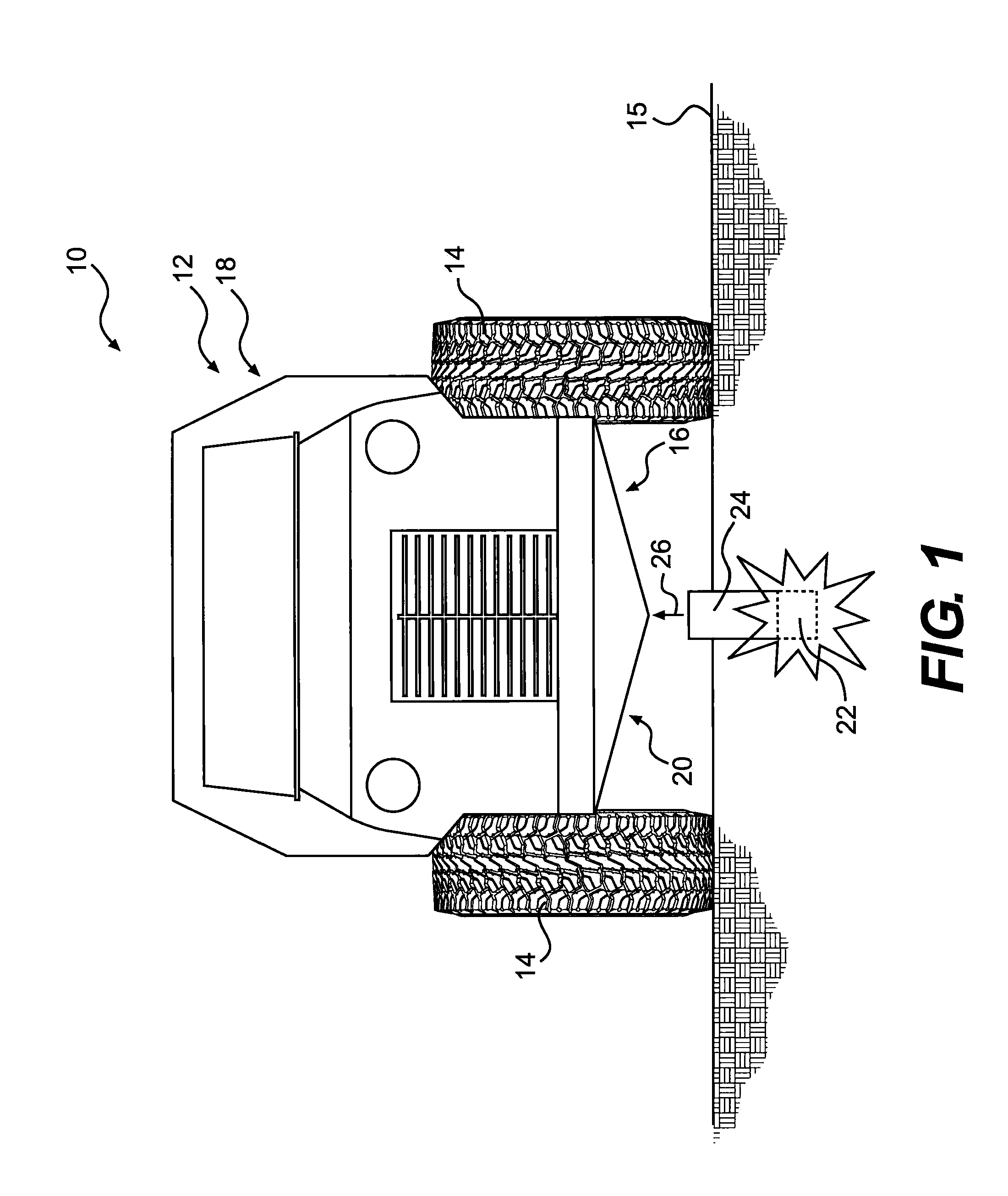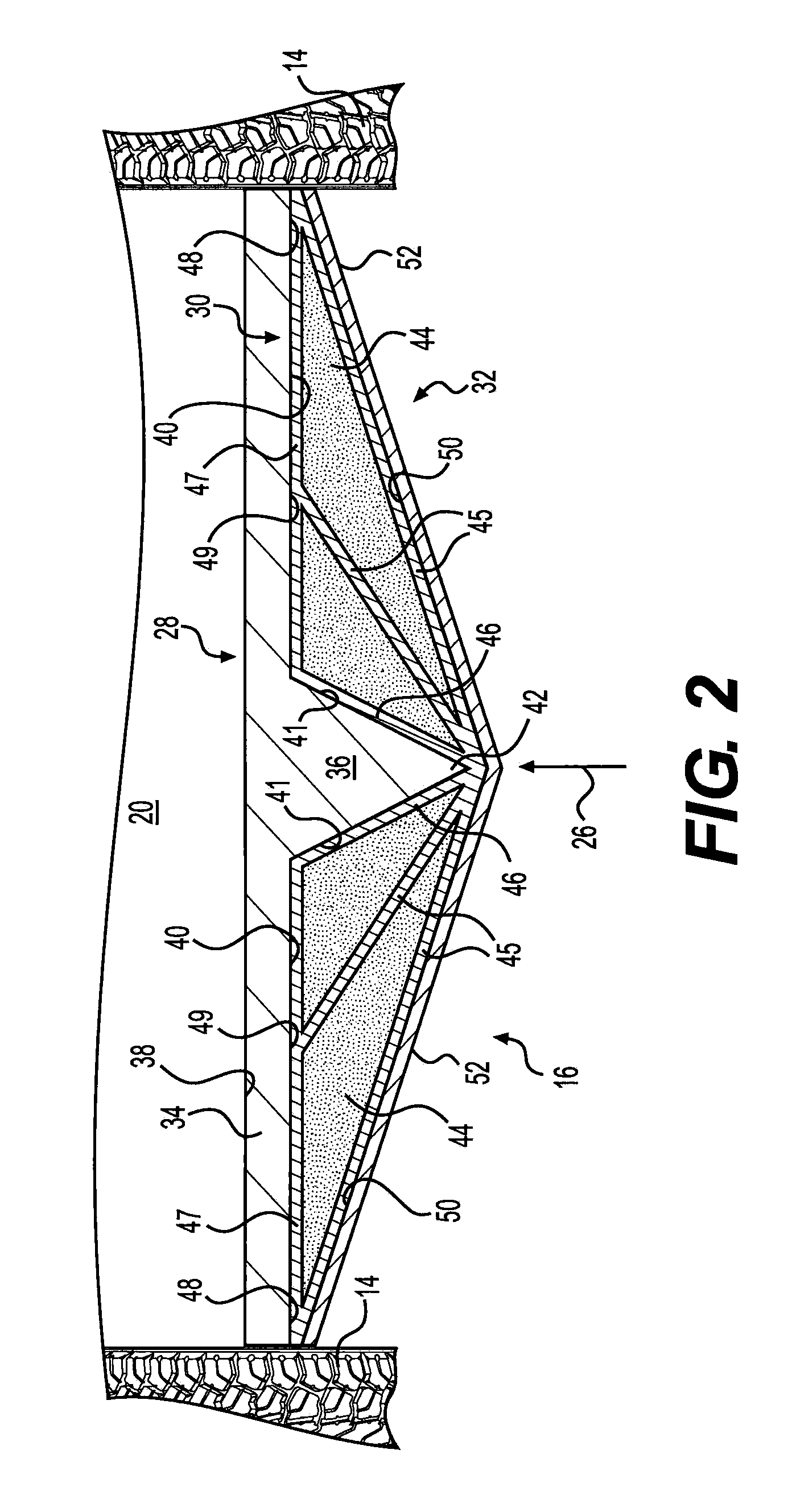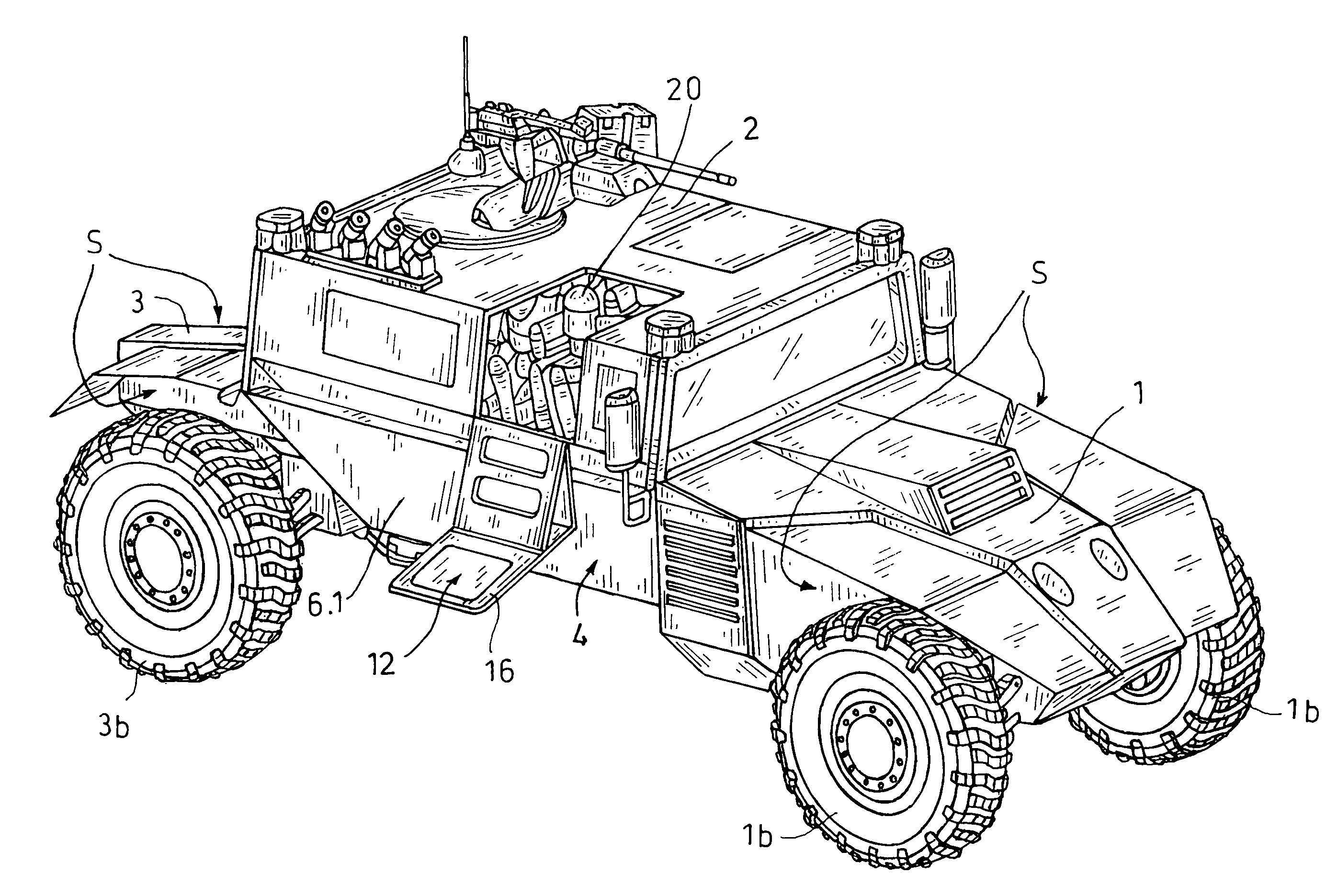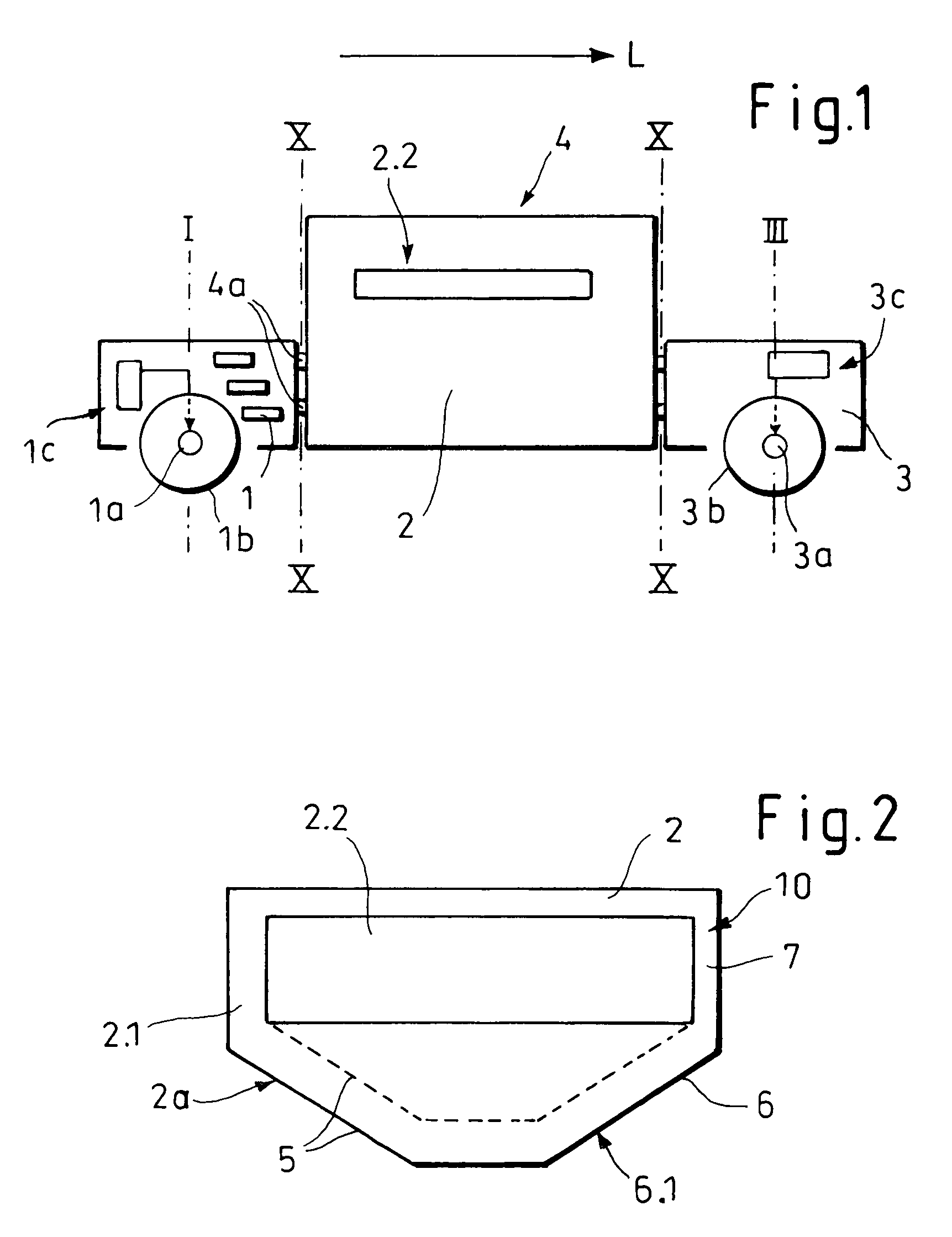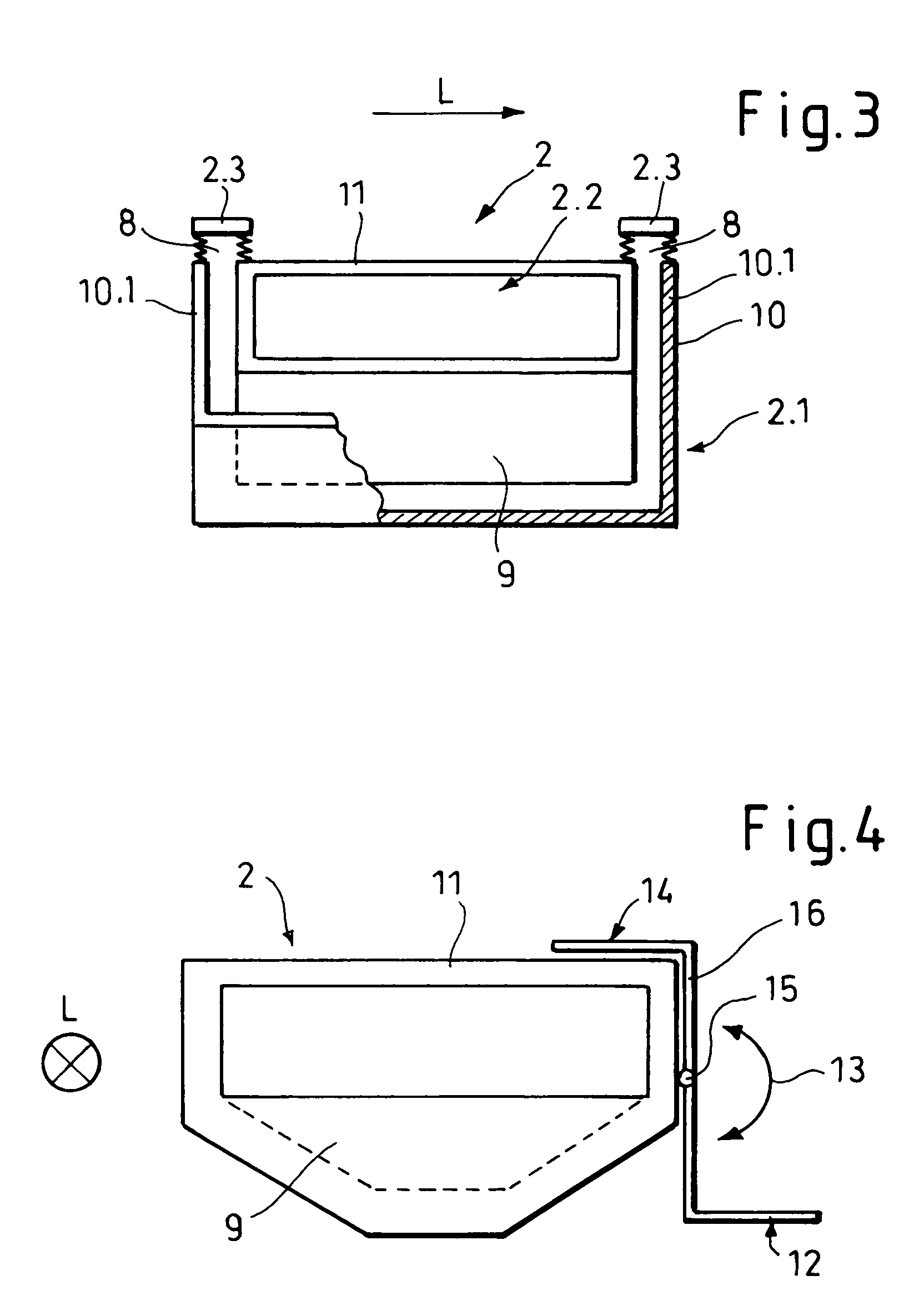Patents
Literature
1076results about "Armoured vehicles" patented technology
Efficacy Topic
Property
Owner
Technical Advancement
Application Domain
Technology Topic
Technology Field Word
Patent Country/Region
Patent Type
Patent Status
Application Year
Inventor
Communications spooler for a mobile robot
A cable handling system mounted to a mobile robot to dispense and retrieve cable at zero tension includes a cable reel drive and a downstream tension roller drive that includes an idler. As a cable passes through the tension roller drive, position along the length of the cable and / or the cable speed is monitored accurately by a sensor attached to the idler. A system controller in communication with the sensor controls the cable reel drive and the tension roller drive for dispensing and retrieving cable downstream of the tension roller drive.
Owner:FLIR DETECTION
Collapsible ballistic shield
Owner:PATRIOT3
Vehicle protection system
ActiveUS20070180983A1Effective and reliableSimple designDefence devicesDefensive equipmentFire controlAirbag deployment
A protection system features a flexible packaged net with perimeter weighting housed in a deployment box releasably attached to a vehicle. One deployment subsystem includes an airbag packaged in the deployment box behind the net. A sensor subsystem detects an incoming threat and a fire control subsystem is responsive to the sensor subsystem and is configured to activate the deployment subsystem to inflate the airbag and deploy the net in the trajectory path of the incoming threat.
Owner:FOSTER-MILLER +1
Mine and collision protection for passenger vehicle
Many military land vehicles are not designed to withstand extreme forces concomitant exploding mines. A vehicle's capacity to protect its occupants is inventively enhanced by structurally augmenting the vehicle, in lower structural portions closely related to the vehicle's cabin, with both elastomeric and rigid (non-elastomeric) materials. An elastomeric layer and a rigid layer (typically embodied as a metal or composite sheet or plate) are added to the vehicle in each of seven locations, viz., the four wheel wells (left-front, right-front, left-rear, right-rear), the two floorboards (left and right), and the intervening underside area. At each wheel well and floorboard location, the elastomer is sandwiched between the vehicle's existing rigid structure and the rigid member so as to form a tri-layer material system. At the intervening underside location, an elastomer-coated rigid member is attached with the elastomer face-down. The seven material systems are energy-dissipative and impact-deflective both locally and globally.
Owner:THE UNITED STATES OF AMERICA AS REPRESENTED BY THE SECRETARY OF THE NAVY
Robotic Mobile Low-Profile Transport Vehicle
ActiveUS20140246257A1Efficiently traverseImprove stabilityVehicle body stabilisationArmoured vehiclesTerrainControl system
A robotic mobile low-profile transport vehicle is disclosed. The vehicle can comprise a first transport module having a frame assembly, a mobility system, and a propulsion system and a second transport module having a frame assembly and a mobility system. A multi-degree of freedom coupling assemblage can join the first and second transport modules together. The vehicle can include a first platform supported about the frame assembly of the first transport module, and a second platform supported about the frame assembly of the second transport module. Each of the platforms can be configured to receive a load for transport. Additionally, the vehicle can include a control system that can operate to facilitate intra-module communication and coordination to provide a coordinated operating mode of the first and second transport modules and the coupling assemblage about a given terrain.
Owner:SARCOS LC
Teleoperated Robotic System
ActiveUS20120328395A1Programme controlProgramme-controlled manipulatorRobotic systemsTeleoperated robot
A teleoperated robotic system that includes master control arms, slave arms, and a mobile platform. In use, a user manipulates the master control arms to control movement of the slave arms. The teleoperated robotic system can include two master control arms and two slave arms. The master control arms and the slave arms can be mounted on the platform. The platform can provide support for the master control arms and for a teleoperator, or user, of the robotic system. Thus, a mobile platform can allow the robotic system to be moved from place to place to locate the slave arms in a position for use. Additionally, the user can be positioned on the platform, such that the user can see and hear, directly, the slave arms and the workspace in which the slave arms operate.
Owner:SARCOS LC
Laserbot: programmable robotic apparatus with laser
A remotely-controlled robotic apparatus for deactivating explosive ordinance, such as IEDs. The remotely-controlled robotic apparatus is provided with a robotic portion that provides mobility, and a laser portion configured to be aimed at an object of interest (for example an object believed to comprise an IED) and to deactivate the object by destroying, damaging or disconnecting at least one of a control apparatus and a power supply from the object of interest. The remotely-controlled robotic apparatus provides the capability to dispose of IEDs without having an explosion. The remote-controlled robotic apparatus can include a camera and an illumination source for examining objects of interest. A remote control console is provided for the use of an operator in controlling the robotic apparatus.
Owner:DEAN JASON
Ceramic tile armor with enhanced joint and edge protection
InactiveUS6009789AMinimal increase in weightImprove reliabilityArmoured vehiclesPersonal protection gearCeramic compositeGround vehicles
A ceramic composite tile armor which is reinforced at the more vulnerable joint and free edge areas, using glass or ceramic strips or overlays bonded with an adhesive to the outer surface of the tile joints and free edges. This reinforcement provides improved ballistic threat protection for ground vehicle, aircraft, watercraft, spacecraft, and body (personnel) ceramic tile armor applications. Glass or ceramic overlay strips assist in fracturing impacting projectiles that strike the tile joints or free edges. The substrate laminate backing can then capture fragments of the projectile and broken ceramic and prevent penetration. The invention provides improved protection over conventional joint and edge enhancements with higher reliability of accurate positioning over joint and free-edge areas, with less added weight, and at lower associated production costs.
Owner:SIMULA
Mine resistant armored vehicle
InactiveUS20070234896A1Resistant to damageArmoured vehiclesVehicle componentsTransfer caseAutomotive engineering
A blast-resistant armored land vehicle that may include a monocoque body comprised of sheet material with the bottom portion of the vehicle being substantially V-shaped. The apex of the V is substantially parallel with the centerline of the vehicle with the tip of the V having a radius of approximately 1-4 inches. The angle of the V may be approximately 115°-130°. The vehicle has a ground clearance of greater than 30 inches. The vehicle further includes an engine detachably affixed within the body, a transmission connected to the engine, a transfer case connected to the transmission having a front output shaft and a rear output shaft. The transfer case may be located at the approximate the fore and aft center of the vehicle and may be enclosed within a blast resistant that includes sheet material above the transfer case. The drive train may be connected to the engine and may be detachably affixed to the body.
Owner:FORCE PROTECTION TECH
Armored vehicle with blast deflecting hull
InactiveUS20070186762A1Minimize impact of lateralMinimize forceArmoured vehiclesShieldsMarine engineeringDiamond
Disclosed herein is an armored vehicle that includes a frame supported by one or more wheels, a hull affixed to the frame having a generally diamond shaped vertical cross section, the hull including: a plurality of armored panels; one or more bullet proof windows; and an air intake designed to prevent debris from entering an engine compartment, wherein the generally diamond shape of the hull deflects energy from sources that are not normal to a hull surface away from the hull to minimize damage to the hull.
Owner:BLACKWATER LODGE & TRAINING CENT
Robot surveillance system and method
ActiveUS20120303179A1Enhance the imageGood terrain dataTethered aircraftArmoured vehiclesChassisRobot
A robot surveillance system includes a robot chassis, a drive subsystem for the chassis, a dock on the chassis, and a payout device associated with the chassis. A flying module is configured to be received in the dock and includes at least one rotor powered by a motor and a body portion including an imager. A tether is coupled to the payout device of the robot and to the flying module for allowing the flying module to climb out of the dock when powered to gain elevation for surveillance and imaging via the imager and for retracting the flying module to land on the robot and reside in the chassis dock after surveillance.
Owner:FOSTER-MILLER
Protective hull for vehicles
A protective hull for a vehicle has a plate that covers at least a substantial portion of the underside of the vehicle. A plurality of supports extends laterally from longitudinal members, and a plurality of supports extends laterally from another longitudinal member. A plurality of V-shaped supports is disposed between the lateral supports. The supports have a plurality of voids therein. The voids do not have corners that could encourage tearing of the supports. Cells that are protected from puncture contain fire suppressant and are disposed over the supports.
Owner:COX TIMOTHY J
Axle assembly
InactiveUS20110079978A1Reduce harmReduce damage thereto by an explosionVehicle seatsArmourSlide plateControl theory
An axle assembly for an undercarriage of a vehicle includes two side plates, a differential, and a skid plate. The two side plates have surfaces configured to support a vehicle hull. The differential is generally positioned between the two side plates. During operation of the axle assembly, the differential receives torque from a driveshaft and provides the torque to half shafts. The skid plate includes an array of beams extending between the side plates and below the differential. The skid plate is designed to shield the differential and portions of the undercarriage of the vehicle from ground obstacles.
Owner:OSHKOSH CORPORATION
Ceramic tile armor with enhanced joint and edge protection
InactiveUS6332390B1Minimal increase in weightImprove reliabilityArmoured vehiclesPersonal protection gearCeramic compositeGround vehicles
A ceramic composite tile armor which is reinforced at the more vulnerable joint and free edge areas, using glass or ceramic strips or overlays bonded with an adhesive to the outer surface of the tile joints and free edges. This reinforcement provides improved ballistic threat protection for ground vehicle, aircraft, watercraft, spacecraft, and body (personnel) ceramic tile armor applications. Glass or ceramic overlay strips assist in fracturing impacting projectiles that strike the tile joints or free edges. The substrate laminate backing can then capture fragments of the projectile and broken ceramic and prevent penetration. The invention provides improved protection over conventional joint and edge enhancements with higher reliability of accurate positioning over joint and free-edge areas, with less added weight, and at lower associated production costs.
Owner:SIMULA
Unmanned Multi-Purpose Ground Vehicle with Different Levels of Control
ActiveUS20110144828A1Autonomous decision making processArmoured vehiclesTelecommunications linkCommunications system
A vehicle comprises a platform, a propulsion system, a communications system, a sensor system, and a computer system. The propulsion system, communications system, sensor system, and computer system are associated with the platform. The propulsion system is configured to move the platform on a ground. The communications system is configured to establish a wireless communications link to a remote location. The sensor system is configured to generate sensor data. The computer system is configured to run a number of control processes to perform a mission and configured to perform operations in response to a number of commands from the number of operators if the number of requests is valid.
Owner:THE BOEING CO
Robotic Platform
InactiveUS20100179691A1Ability to controlEasy to carryDefence devicesProgramme controlRobotic armEngineering
The present invention is a robotic mobile platform vehicle that can be thrown into hostile or hazardous environments for gathering information and transmitting that information to a remotely located control station and a system comprising the robotic mobile platform. The system of the invention is adapted to provide it's operator with significant information without being exposed directly to actual or potential danger. One of the key features of the invention is that at least four imaging assemblies are mounted on the robotic platform and that the system has the processing ability to stitch the views taken by the four imaging devices together into an Omni-directional image, allowing simultaneous viewing of a 360 degree field of view surrounding the mobile platform. Another feature is that the system comprises a touch screen GUI and the robotic mobile platform is equipped with processing means and appropriate software. This combination enables the user to steer the robotic platform simply by touching an object in one of the displayed images that he wants to investigate. The robotic platform can then either point its sensors towards that object or, if so instructed, compute the direction to the object and travel to it without any further input from the user.
Owner:MISTRAL DETECTION LTD
Vehicle battery pack ballistic shield
An improved protection system for a battery pack mounted between the passenger cabin floor panel of an electric vehicle and the driving surface is provided, the system utilizing a ballistic shield mounted under the electric vehicle and interposed between the battery pack enclosure and the driving surface, where the ballistic shield is spaced apart from the enclosure bottom panel. A layer of a compressible material may be interposed between the ballistic shield and the battery pack enclosure.
Owner:TESLA INC
Hybrid Periodic Cellular Material Structures, Systems, and Methods For Blast and Ballistic Protection
ActiveUS20110283873A1More structurally efficientLarge structureArmoured vehiclesAxle-box lubricationProtection systemUltimate tensile strength
Structures based upon periodic cellular materials that provide a potential for defeating combinations of both air blast loading and ballistic attack either sequentially or simultaneously, or combination of both. The cellular structures may also be configured to meet the stiffness and strength support requirements of particular vehicle or other applications, systems or structures. The armor is therefore potentially able to support normal service loads and defeat blast and ballistic threats when necessary. The structure provides for using efficient load support capabilities of the material (without a high armor protection level) in low threat conditions, as well as the ability to modify the system to increase its level protection to a desired or required level. This would reduce the weight of the protection system in normal (low threat) conditions which reduces vehicle wear and tear, as well as cost savings in fabrication of applicable structures or systems.
Owner:UNIV OF VIRGINIA ALUMNI PATENTS FOUND
Vehicle Battery Pack Thermal Barrier
An integration assembly for a battery pack mounted between the passenger cabin floor panel of an electric vehicle and the driving surface is provided, the assembly utilizing a multi-layer thermal barrier interposed between the battery pack enclosure and the passenger cabin floor panel, where the multi-layer thermal barrier provides noise isolation, thermal isolation and vibration damping, and where the multi-layer thermal barrier is compressed when the battery pack enclosure is mounted to the vehicle. The multi-layer thermal barrier is comprised of a first layer formed from a compressible and conformable elastic material and a second layer formed from a conformable thermally insulating material. The multi-layer thermal barrier may also include a moisture barrier layer that encases the first and second layers, for example a moisture barrier layer fabricated from a plastic. A sealant may be used to seal and bond the moisture barrier layer to the battery pack enclosure.
Owner:TESLA INC
Personal portable blankets as an infrared shielding device for field activities
A system shields IR emissions from remote sensors and has a flexible outer metallic layer extending to cover objects emitting IR energy on the covered ground. The outer layer is conductive of heat energy and faces upward. A flexible inner metallic layer coextensively extends adjacent to the outer metallic layer. The inner layer is conductive of heat energy and faces downward. Spaced-apart thermo electric chips are between and in contact with the outer and inner layers. The chips transfer heat energy between the outer and inner layers. A sensor of IR radiation on ambient ground provides signals representative of the thermal signature of the ambient ground. A controller couples signals to the chips in response to the representative ambient ground thermal signals for controlling the heat energy radiated from the outer layer to match the radiated IR signature from the outer layer to the IR signature of the ambient ground.
Owner:THE UNITED STATES OF AMERICA AS REPRESENTED BY THE SECRETARY OF THE NAVY
Advanced cooperative defensive military tactics, armor, and systems
This invention provides impact detection and vehicle cooperation to achieve particular goals and determine particular threat levels. For example, an impact / penetration sensing device may be provided on a soldier's clothing such that when this clothing is impacted / penetrated (e.g., penetrated to a particular extent) a medical unit (e.g., a doctor or medical chopper) may be autonomously, and immediately, provided with the soldiers location (e.g., via a GPS device on the soldier) and status (e.g., right lung may be punctured by small-arms fire).
Owner:MULLEN JEFFREY D
Weapon robot with situational awareness
ActiveUS20090164045A1Provide situational awarenessReduce the possibilityProgramme controlSafety arrangementTeleoperated robotRobot position
A mobile, remotely controlled robot includes a turret subsystem, a robot controller subsystem configured to control the robot, control the turret, and fire the weapon, a robot navigation subsystem configured to determine the position of the robot, a turret orientation determination subsystem, and a robot communications subsystem for receiving commands and for transmitting robot position data and turret orientation data. An operator control unit includes a user interface for commanding the robot, the turret, and the weapon. An operator control unit communications subsystem transmits commands to the robot and receives robot position data and turret orientation data from the robot. An operator control unit navigation subsystem is configured to determine the position of the operator control unit. An operator control unit controller subsystem is responsive to the robot position data, the turret orientation data, and the operator control unit position and is configured to determine if the weapon is aimed at the operator control unit within a predetermined fan angle.
Owner:FOSTER-MILLER
Mine resistant armored vehicle
InactiveUS7357062B2Resistant to damageVehicle seatsArmoured vehiclesTransfer caseAutomotive engineering
A blast-resistant armored land vehicle that may include a monocoque body comprised of sheet material with the bottom portion of the vehicle being substantially V-shaped. The apex of the V is substantially parallel with the centerline of the vehicle with the tip of the V having a radius of approximately 1-4 inches. The angle of the V may be approximately 115°-130°. The vehicle has a ground clearance of greater than 30 inches. The vehicle further includes an engine detachably affixed within the body, a transmission connected to the engine, a transfer case connected to the transmission having a front output shaft and a rear output shaft. The transfer case may be located at the approximate the fore and aft center of the vehicle and may be enclosed within a blast resistant that includes sheet material above the transfer case. The drive train may be connected to the engine and may be detachably affixed to the body.
Owner:FORCE PROTECTION TECH
Methods and apparatus for suspending a vehicle shield
ActiveUS20100307329A1Attenuate blast effectReduce impactPortable framesArmourEngineeringShock absorber
A shock absorber system for use with a vehicle having a shield to reduce the effects of a shock event.
Owner:FOX FACTORY
Integration System for a Vehicle Battery Pack
ActiveUS20120160583A1Simple systemArmoured vehiclesElectric propulsion mountingThermal isolationElectric vehicle
An improved integration system for a battery pack mounted between the passenger cabin floor panel of an electric vehicle and the driving surface is provided, the system utilizing at least one insulating layer interposed between the battery pack enclosure and the passenger cabin floor panel, where the insulating layer provides noise isolation, thermal isolation and vibration damping, and where the insulating layer is compressed when the battery pack enclosure is mounted to the vehicle.
Owner:TESLA INC
Apparatus for positioning an occupant of a vehicle
Apparatus for positioning an occupant of a vehicle in an area of a closeable roof hatch includes a carrier frame suspended within a vehicle below the roof hatch and including a vertical support portion and a horizontal standing area connected to the vertical support portion. A seat assembly for the occupant has a backrest which is guided by the vertical support portion for movement in a vertical direction between upper and lower end positions and is spring-biased to seek the upper end position. The seat assembly has a seating area, which is swingably mounted to a lower end of the backrest, and a coupling brace, which has one end swingably mounted to the seating area and another end swingably mounted to the standing area. Connected to the seat assembly is a seat belt for fastening the occupant.
Owner:SCHROTH SAFETY PRODS
Robotic First Responder System and Method
A robotic first responder system provides injured patients with first response medical care and extracts the injured patient from a dangerous or remote area. After assessing of the level of consciousness of an injured patient, the robotic unit utilizes an inflatable immobilization device for safe robotic rescue of injured patients. The robotic unit lifts and transfers an injured patient to an extraction vehicle, a secure, bullet-proof wheeled system that can be pulled by the robot to safe location. The extraction vehicle continues serving as the evacuation stretcher to a medical station. The robotic unit utilizes zero moment point control to maintain stability while lifting the patient. A robot first responder tows the extraction vehicle or the extraction vehicle self-navigates incorporating with power drive and autonomous navigation systems.
Owner:HU JOHN +1
System for protecting a vehicle from a mine
In one aspect, the present disclosure is directed to a system for protecting a vehicle from a mine. Upon detonation the mine may yield ejecta having an expected trajectory. The system has a first layer of material disposed outside of an underbody of a hull of the vehicle. The first layer includes a base disposed in a direction substantially parallel to the underbody and a protrusion that narrows as it extends away from the base in a direction opposing the expected ejecta trajectory. The system also has a second layer including a material having a shock wave transmission velocity that is higher than a shock wave transmission velocity of the material of the first layer. The system further has an exterior layer substantially covering the first and second layers, and the exterior layer has an exterior surface that faces away from the underbody and toward the expected ejecta trajectory.
Owner:FORCE PROTECTION TECH
Mine protection vehicle system
A mine protection vehicle system is proposed wherein a military wheeled vehicle is provided with a high degree of mine protection. Preferably the vehicle has a three-sectioned vehicle construction that includes a front building block, a main building block and rear building block. The building blocks are separable from one another. The main building block may be designed to be slanted toward the bottom and double walled. A cabin, serving to provide a crew space, is hung up on support structure of the main building block. Wheel axles and drives are built into the front and / or rear building block; however, no wheel axle is disposed below the main building block.
Owner:RHEINMETALL LANDSYST
Features
- R&D
- Intellectual Property
- Life Sciences
- Materials
- Tech Scout
Why Patsnap Eureka
- Unparalleled Data Quality
- Higher Quality Content
- 60% Fewer Hallucinations
Social media
Patsnap Eureka Blog
Learn More Browse by: Latest US Patents, China's latest patents, Technical Efficacy Thesaurus, Application Domain, Technology Topic, Popular Technical Reports.
© 2025 PatSnap. All rights reserved.Legal|Privacy policy|Modern Slavery Act Transparency Statement|Sitemap|About US| Contact US: help@patsnap.com
